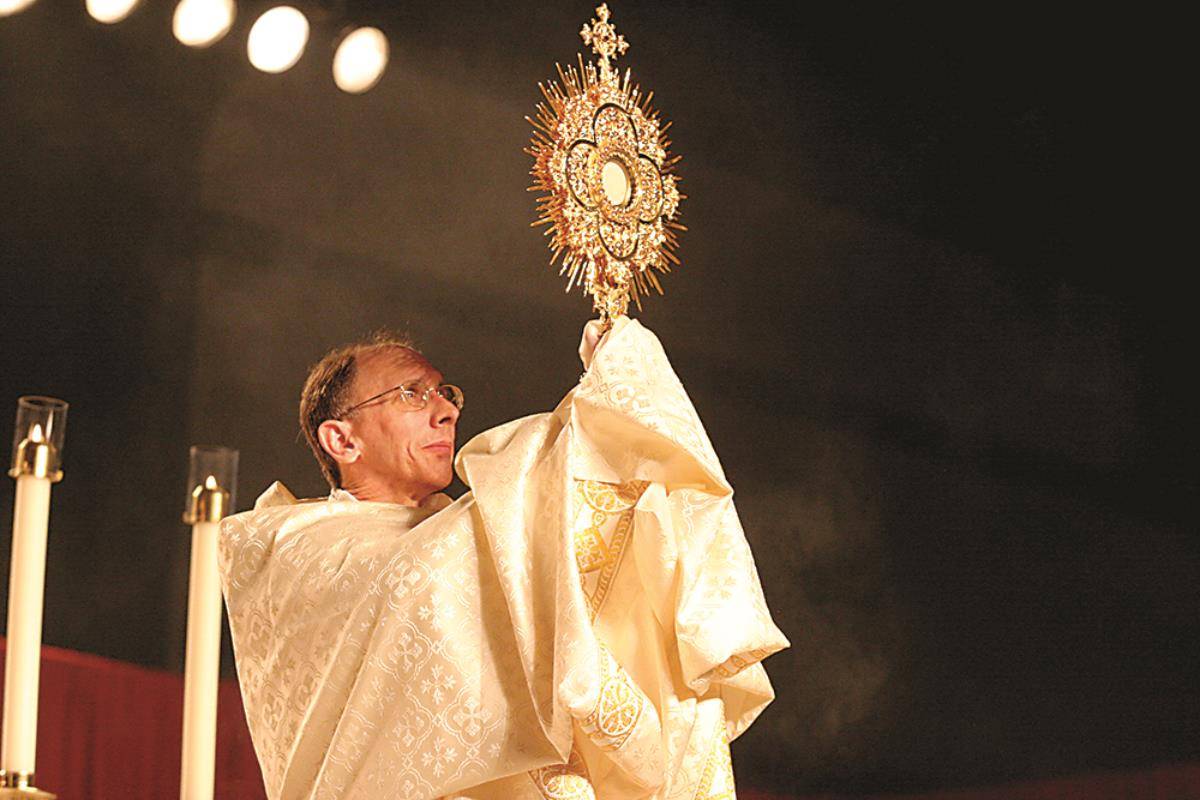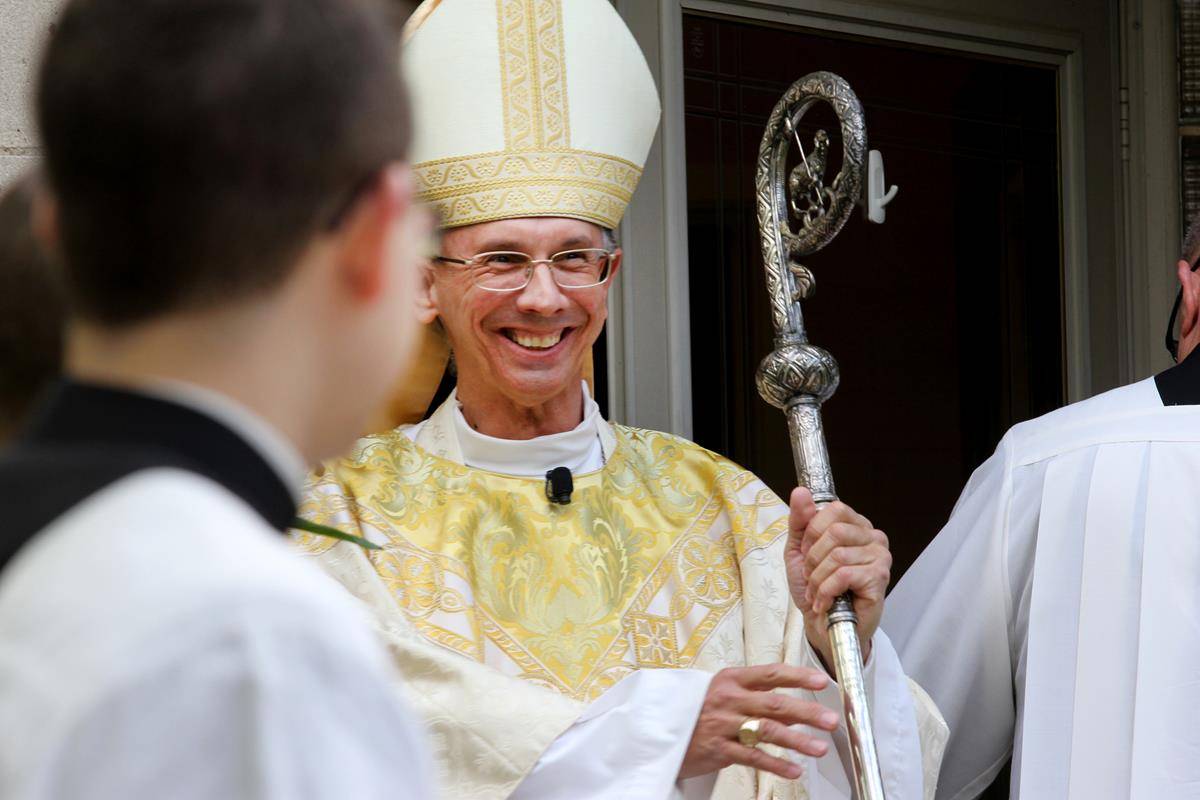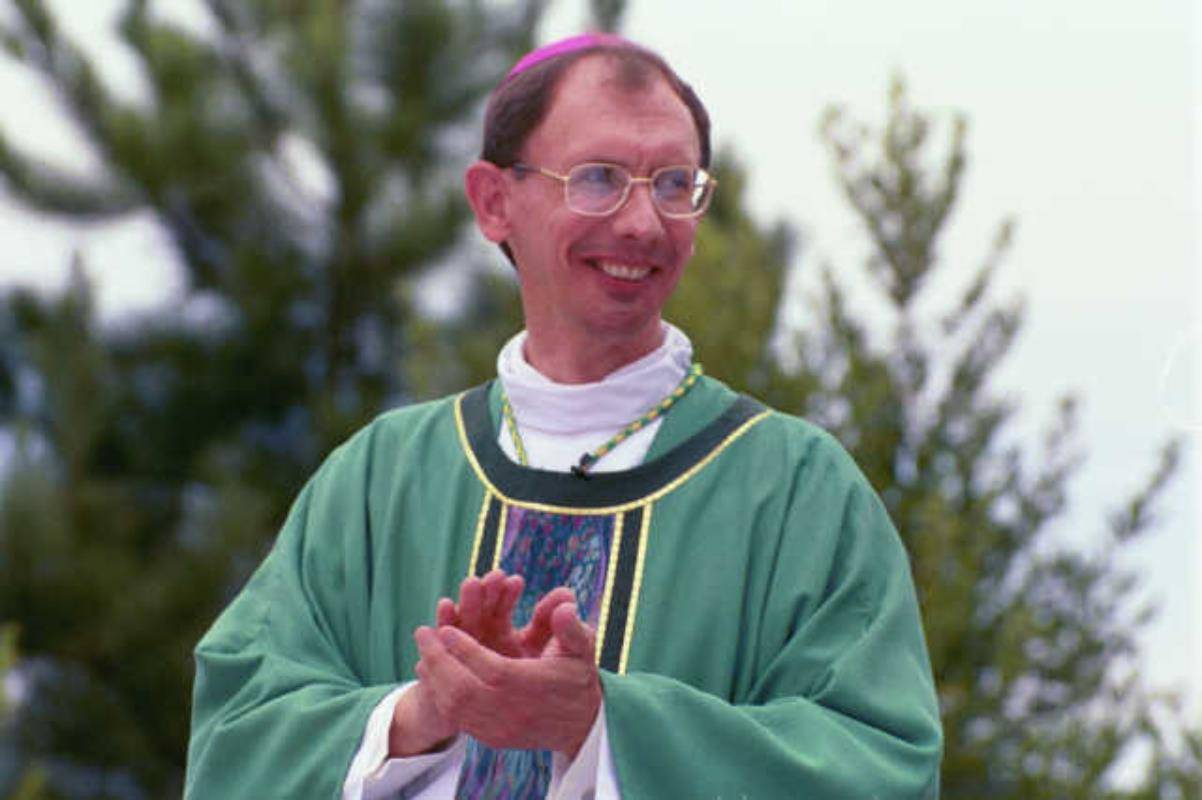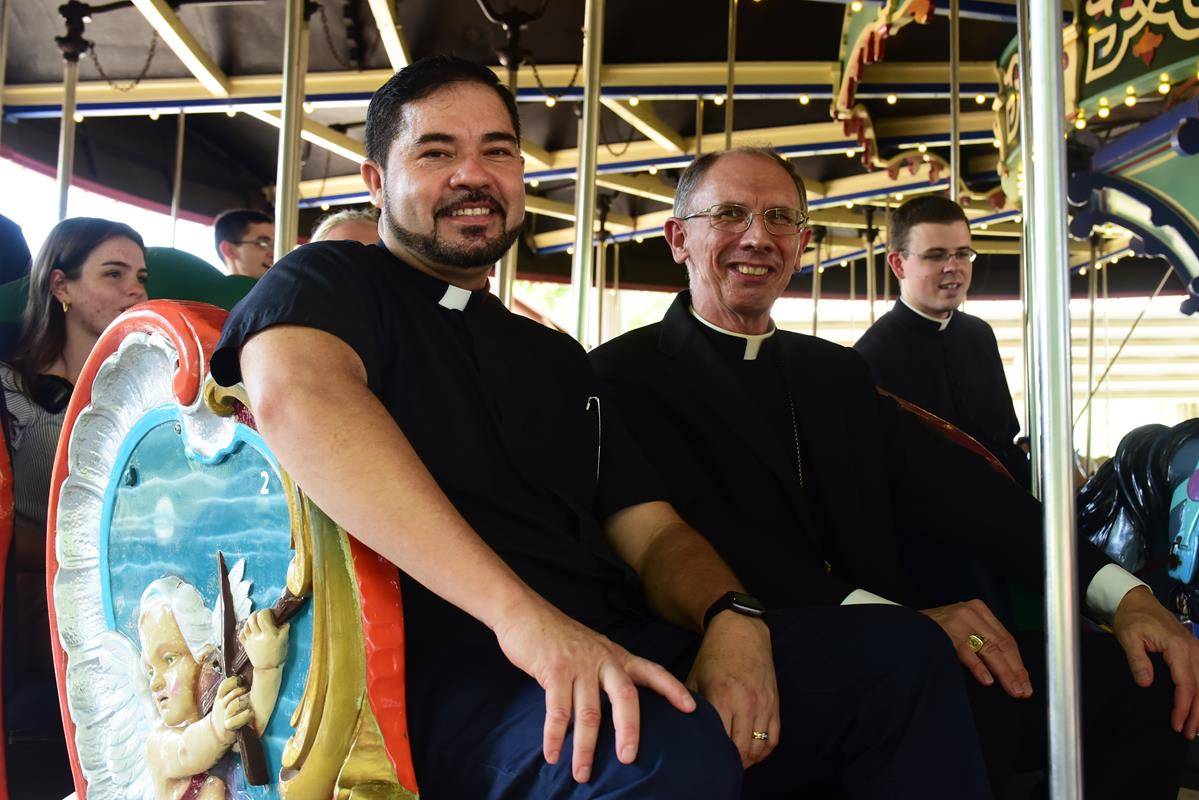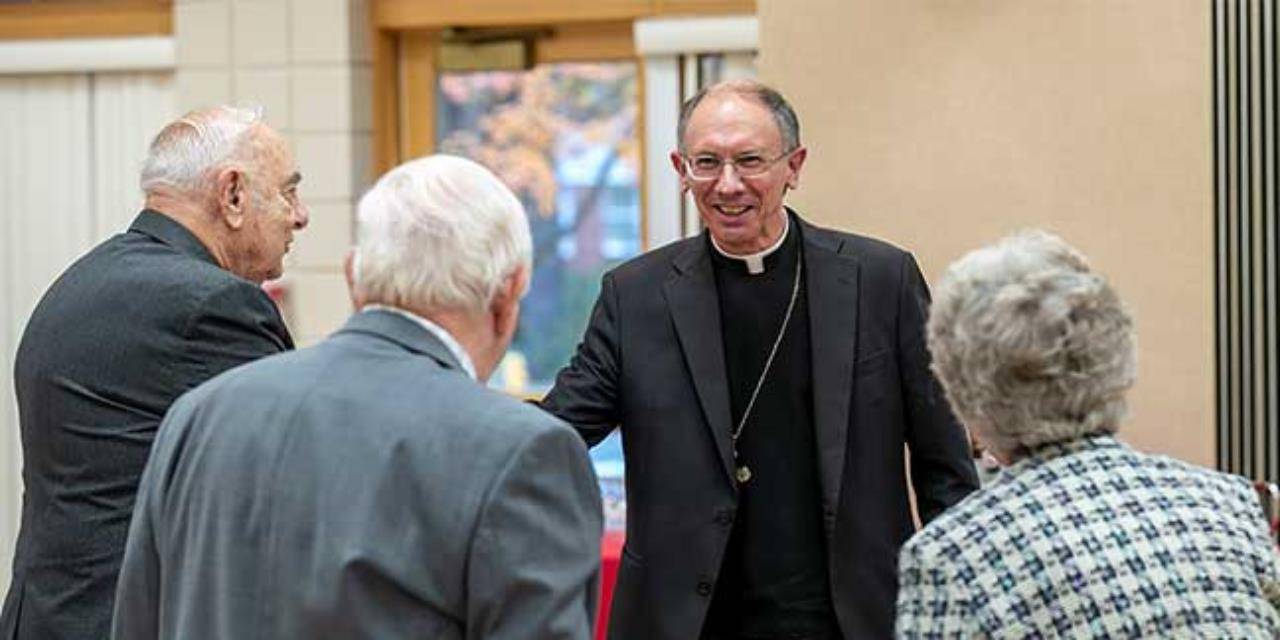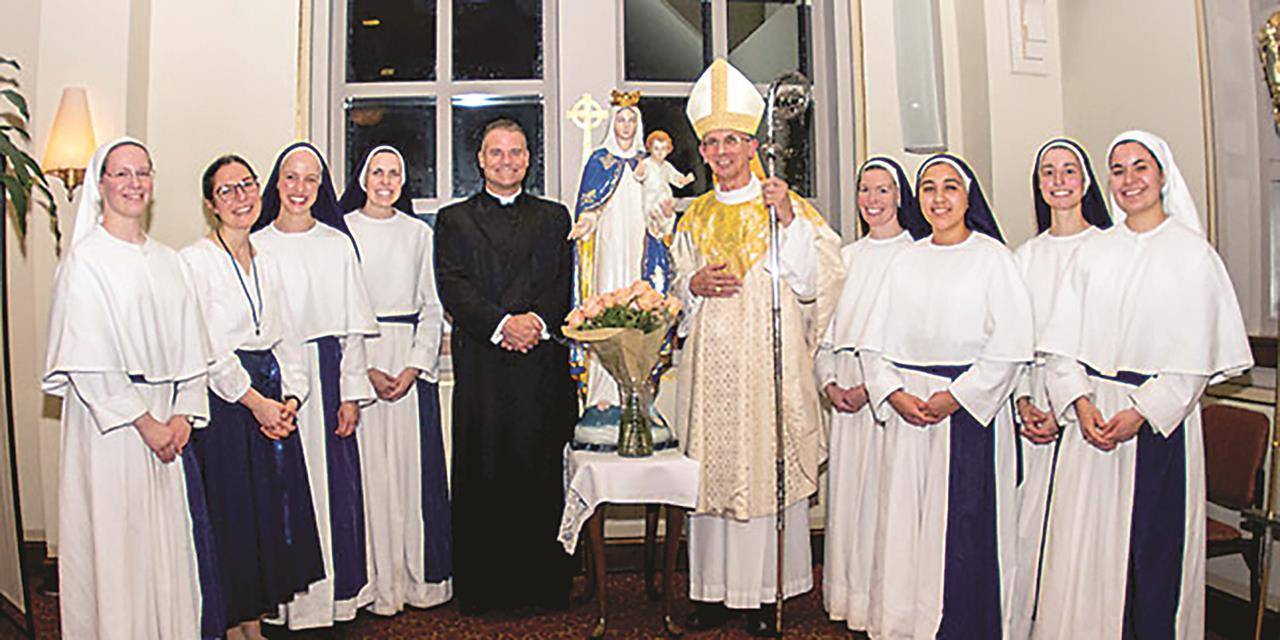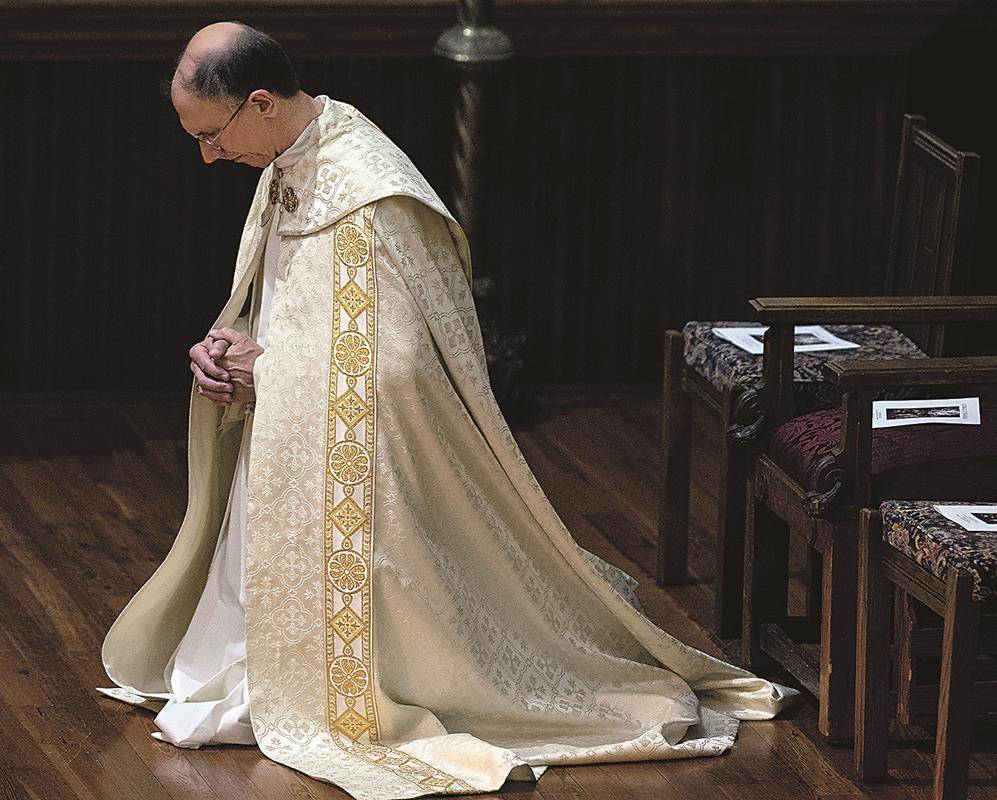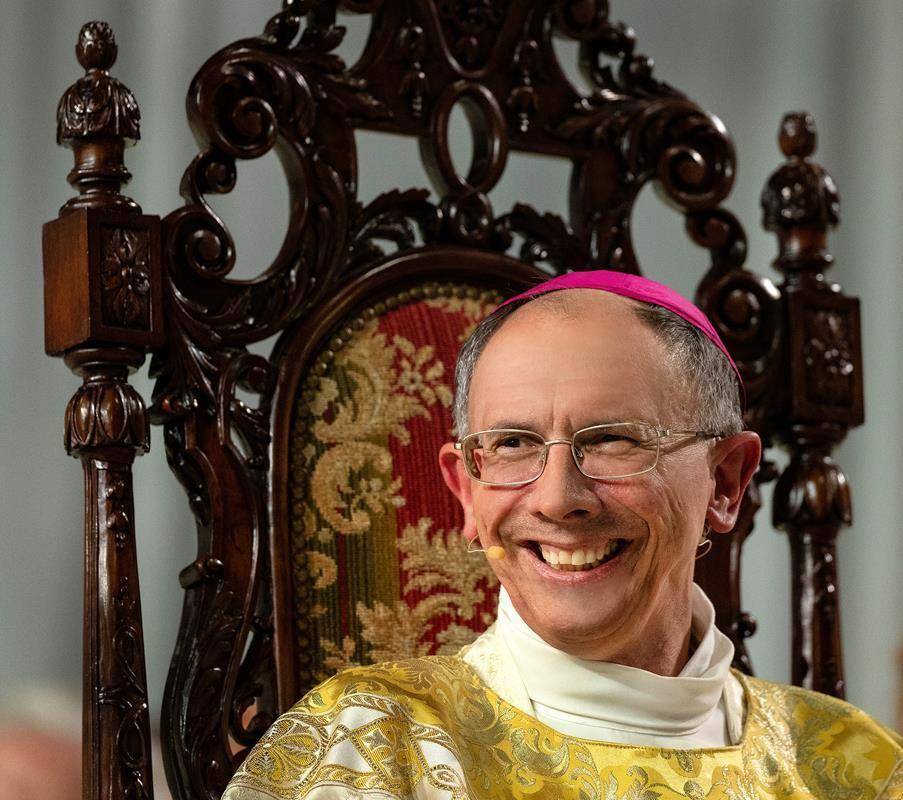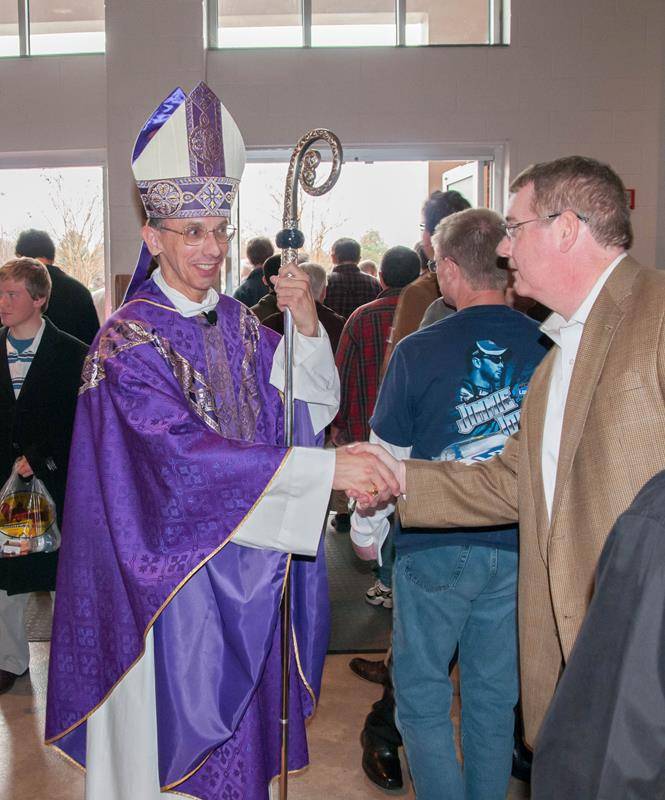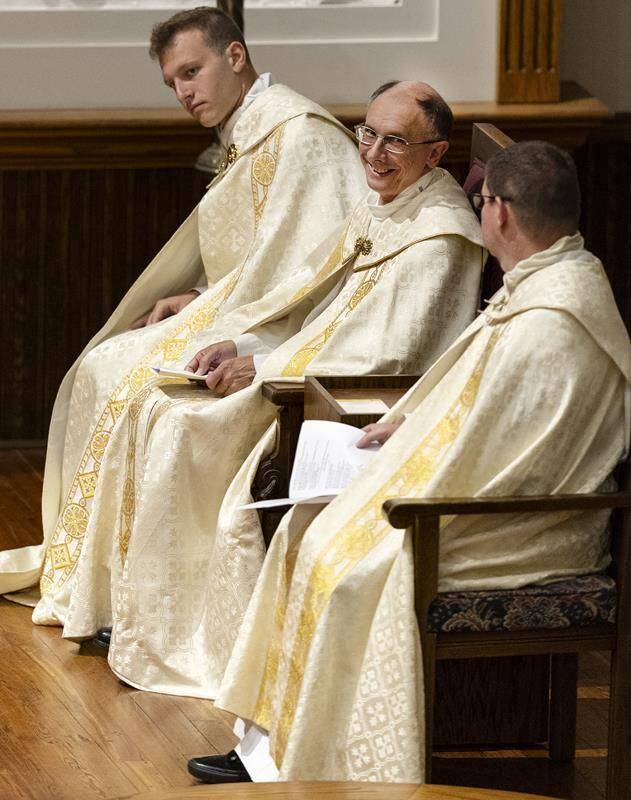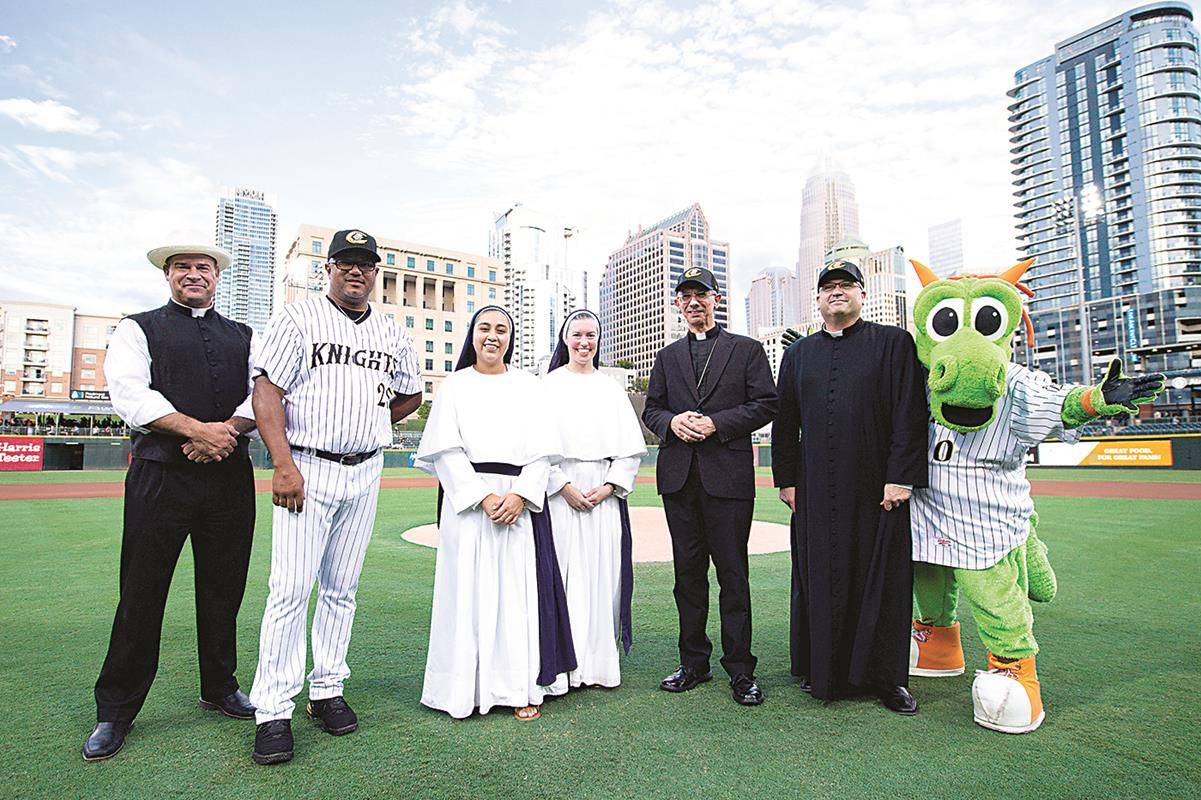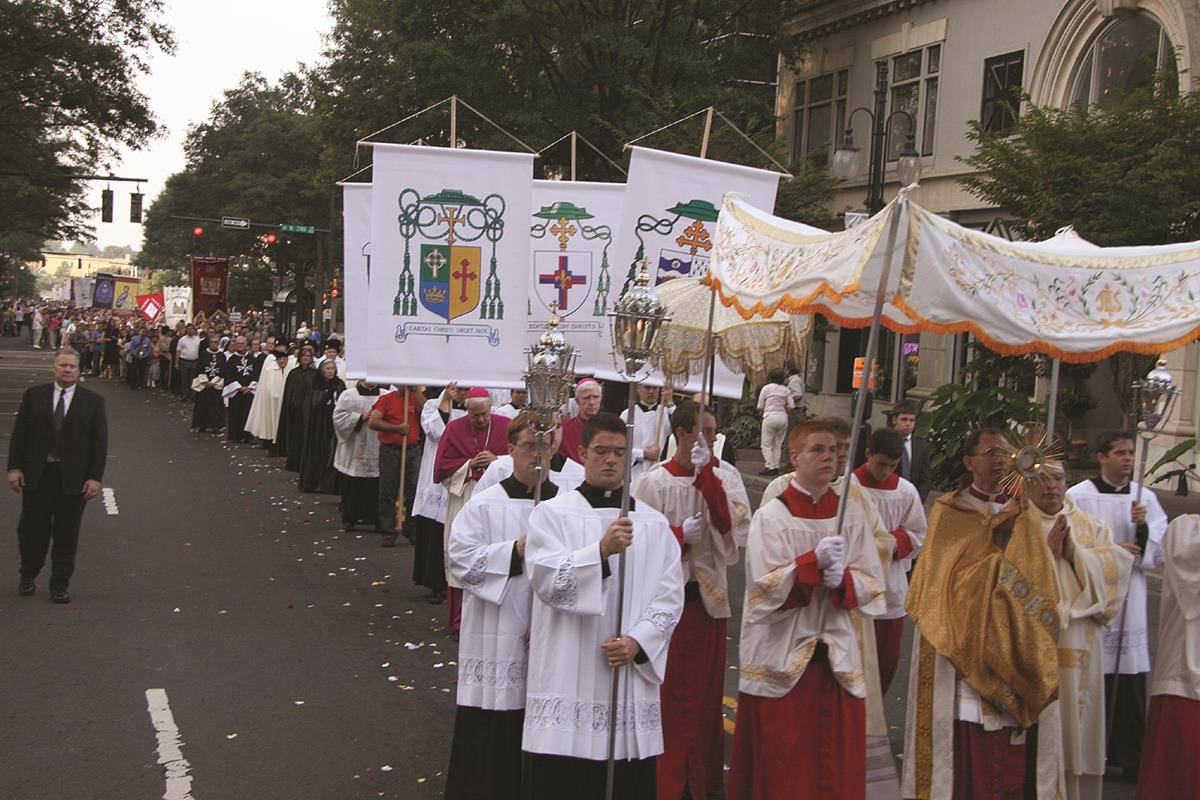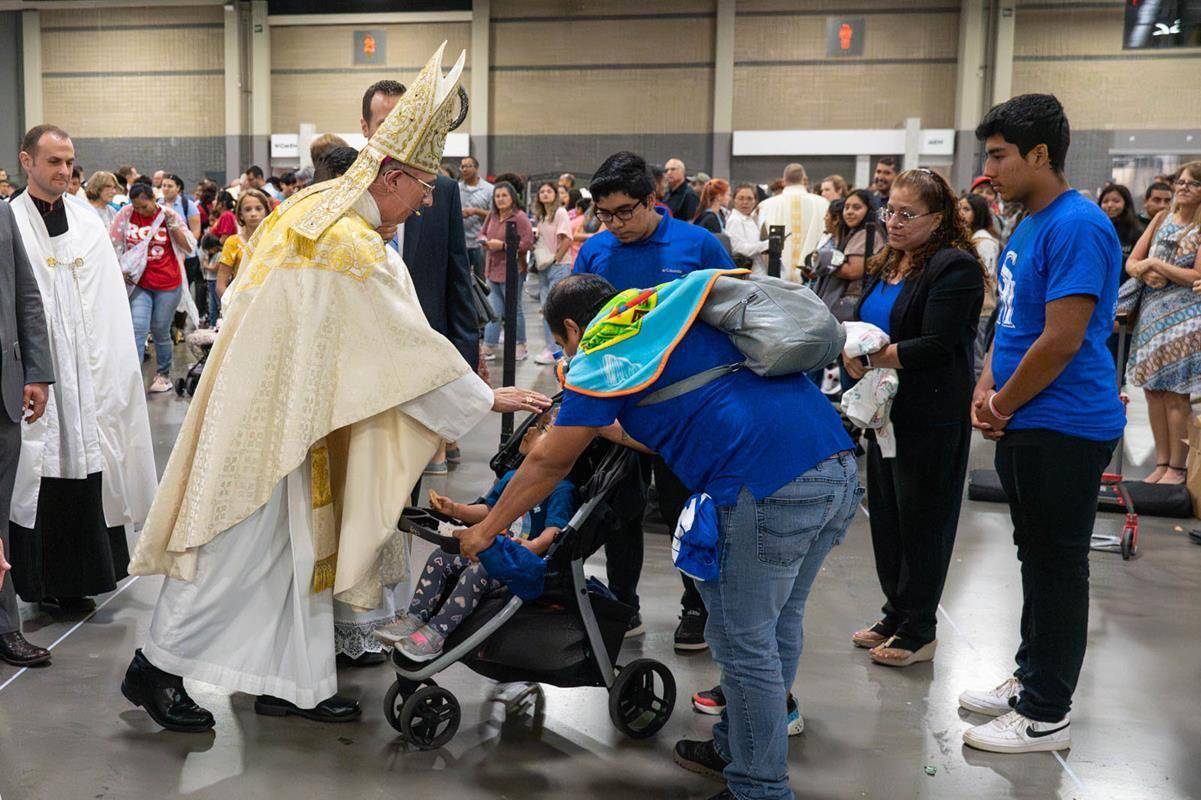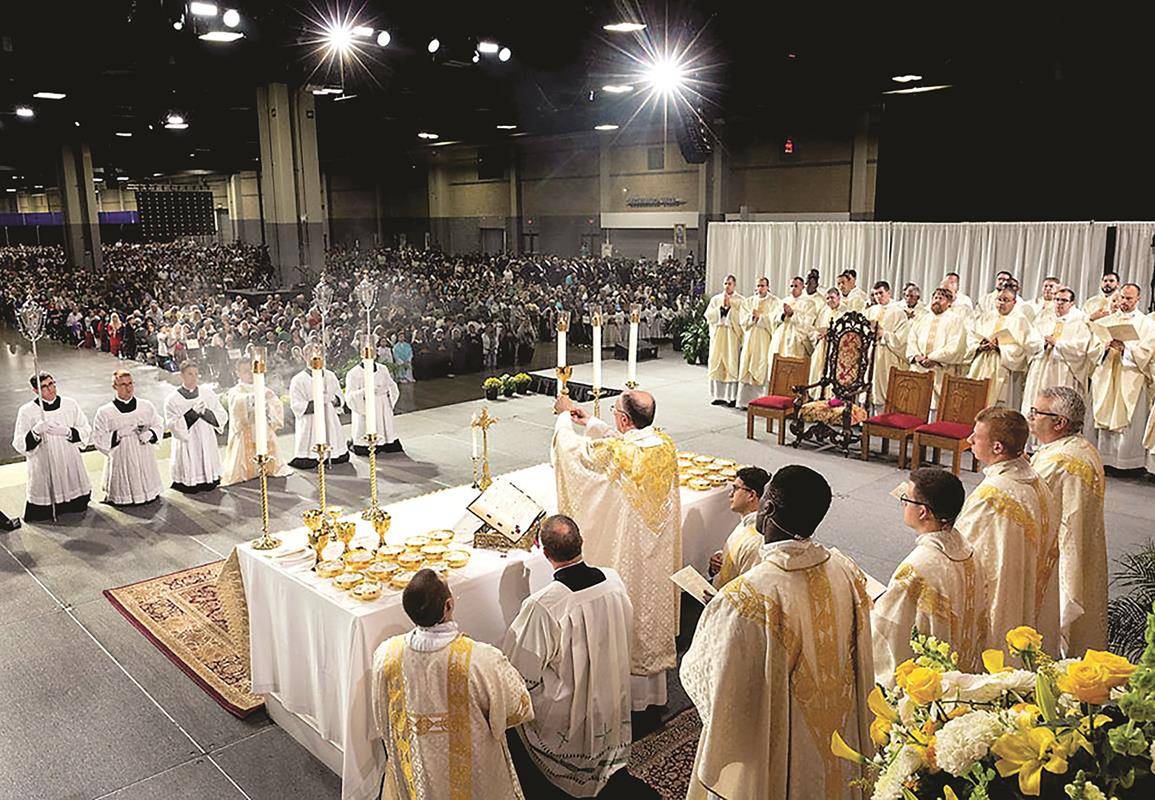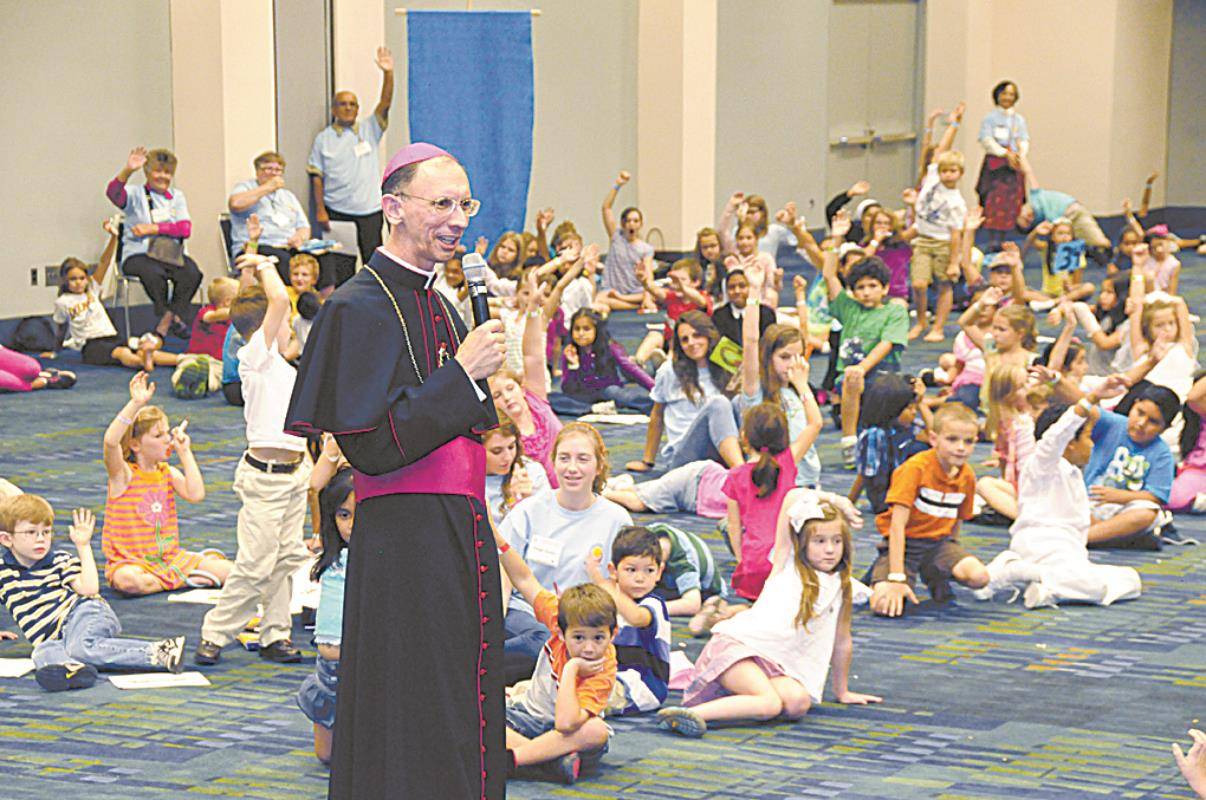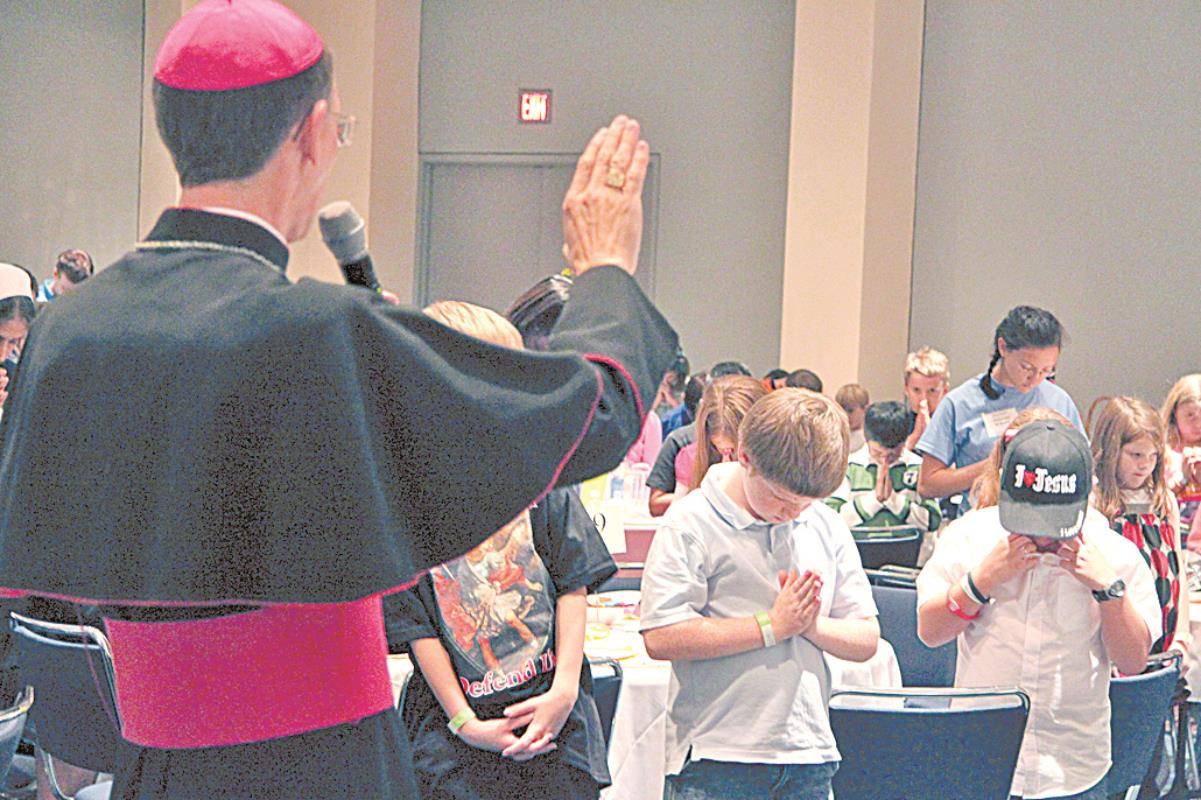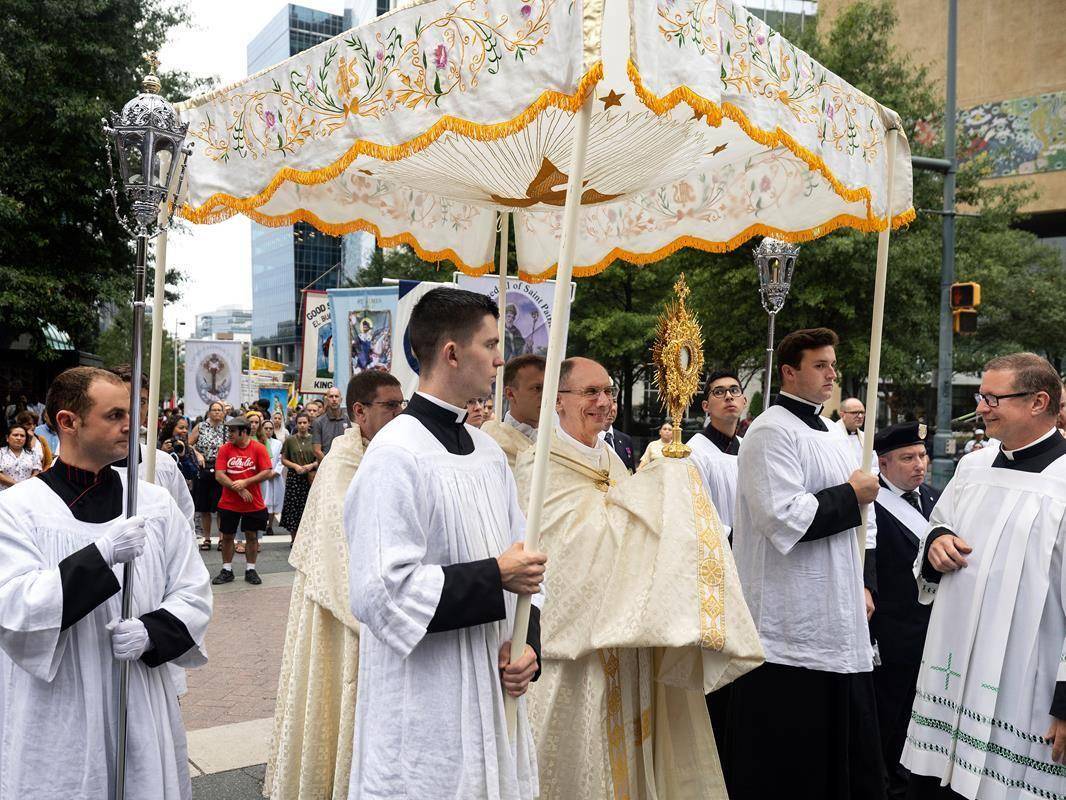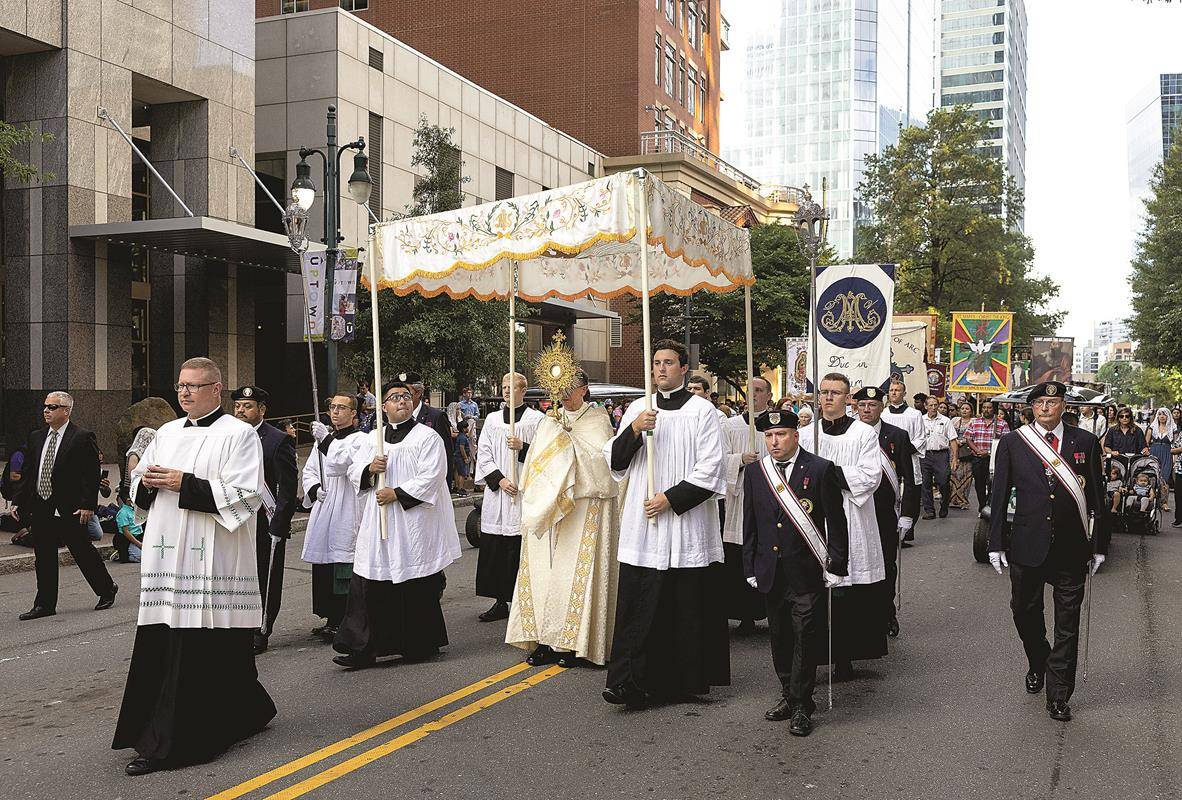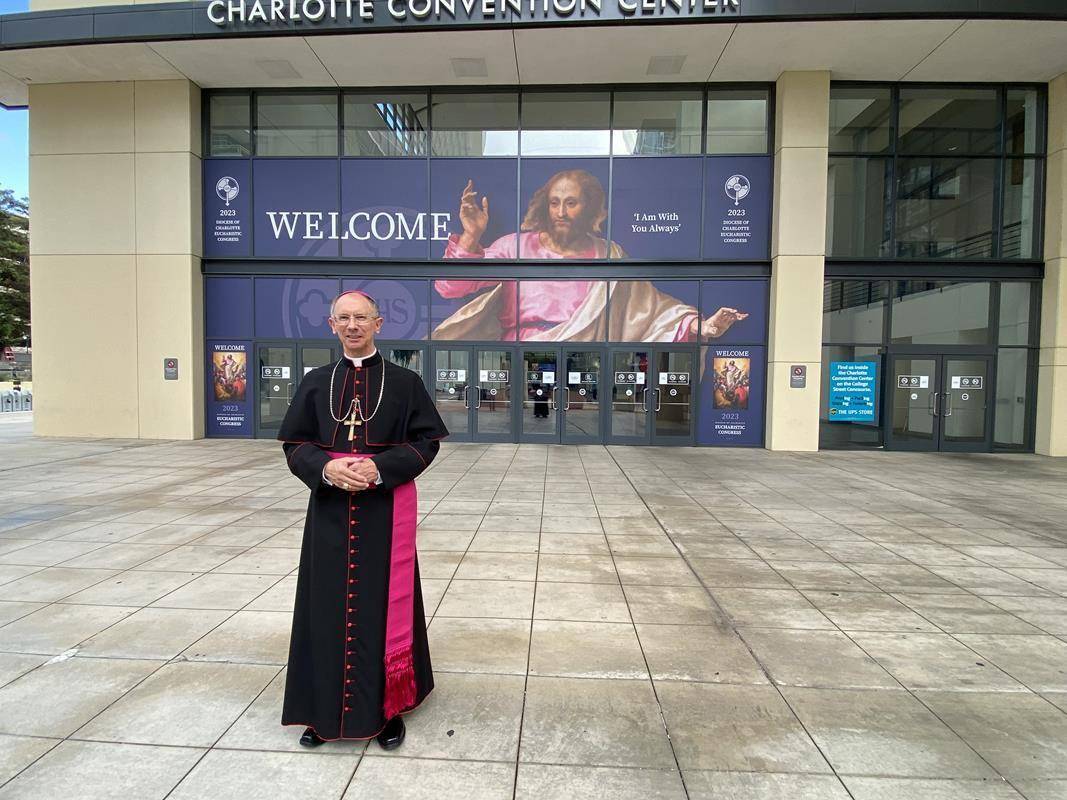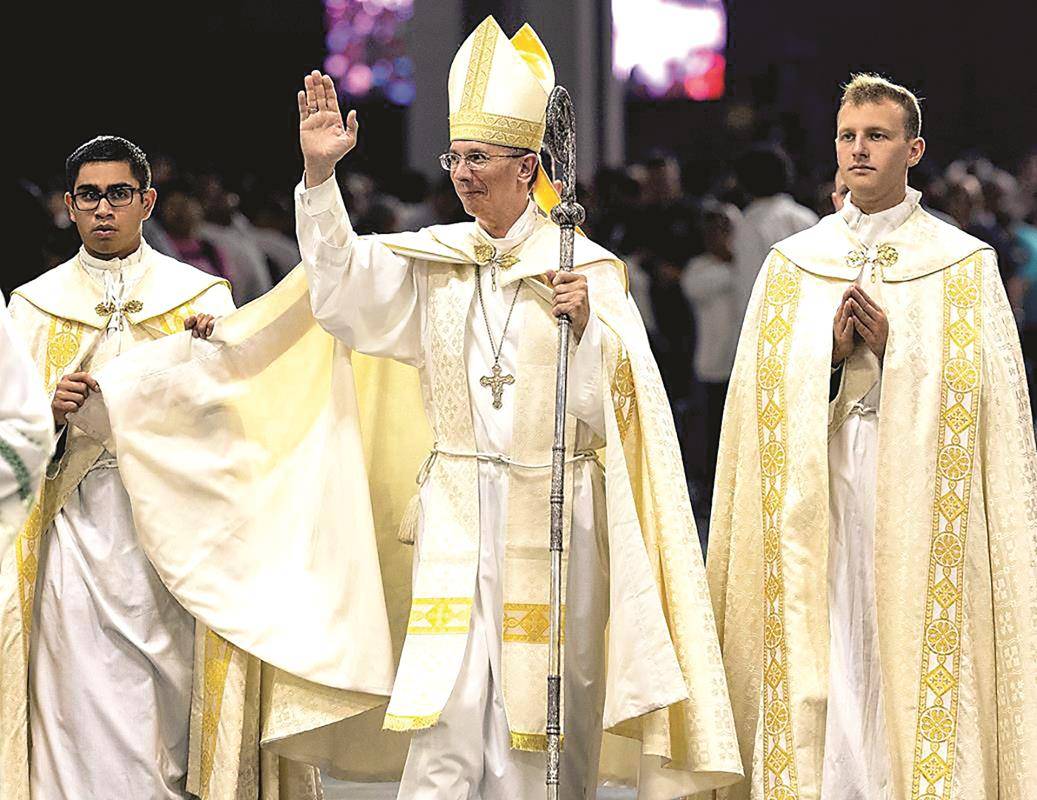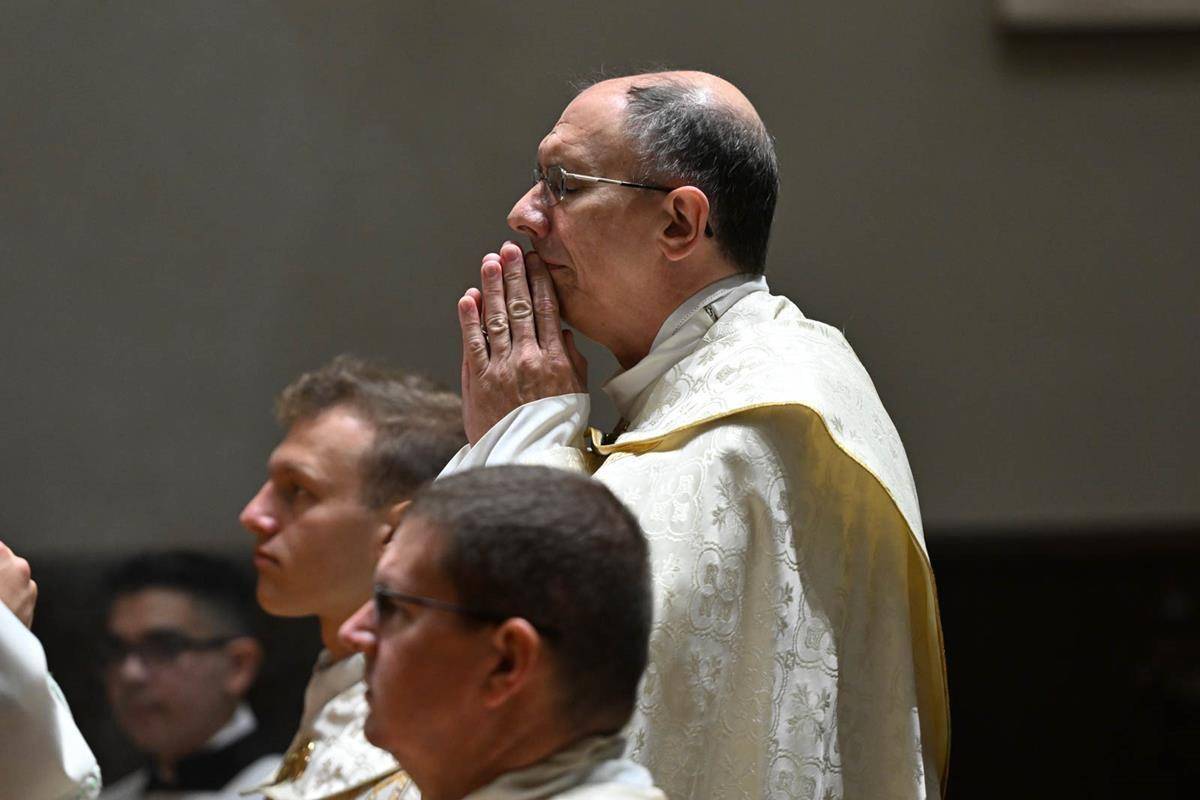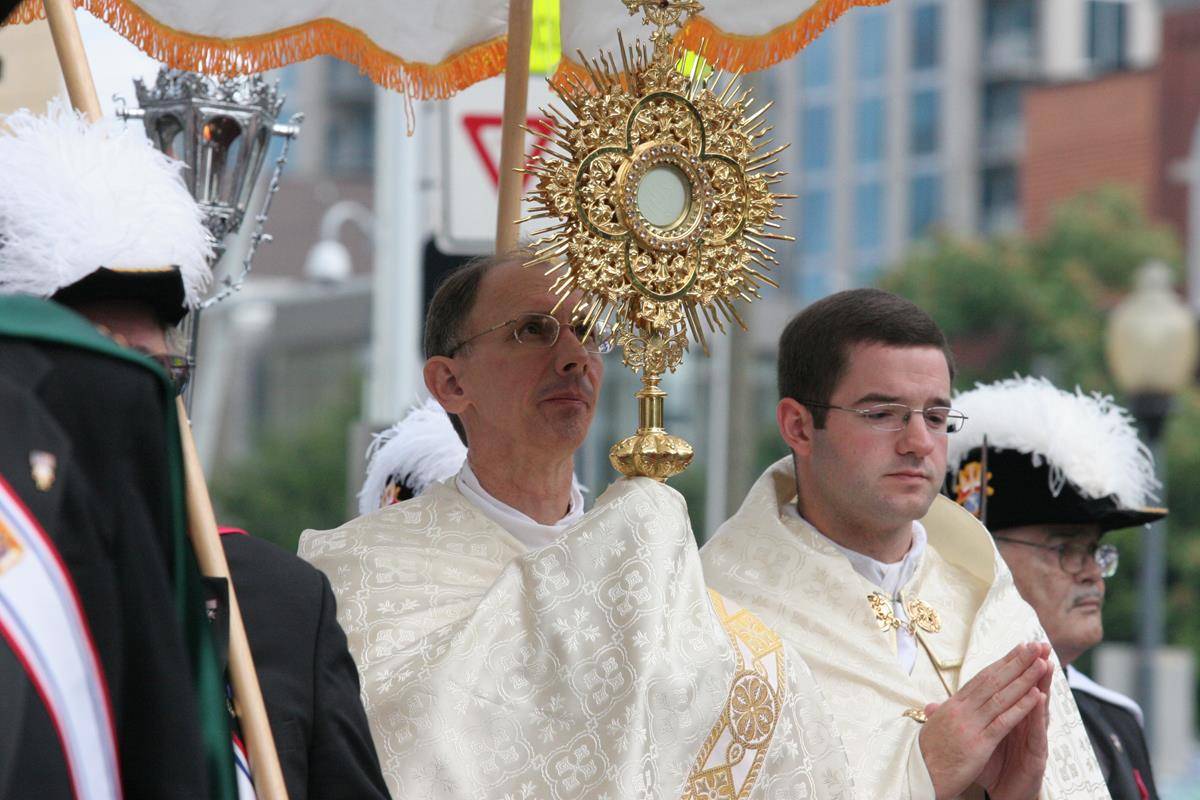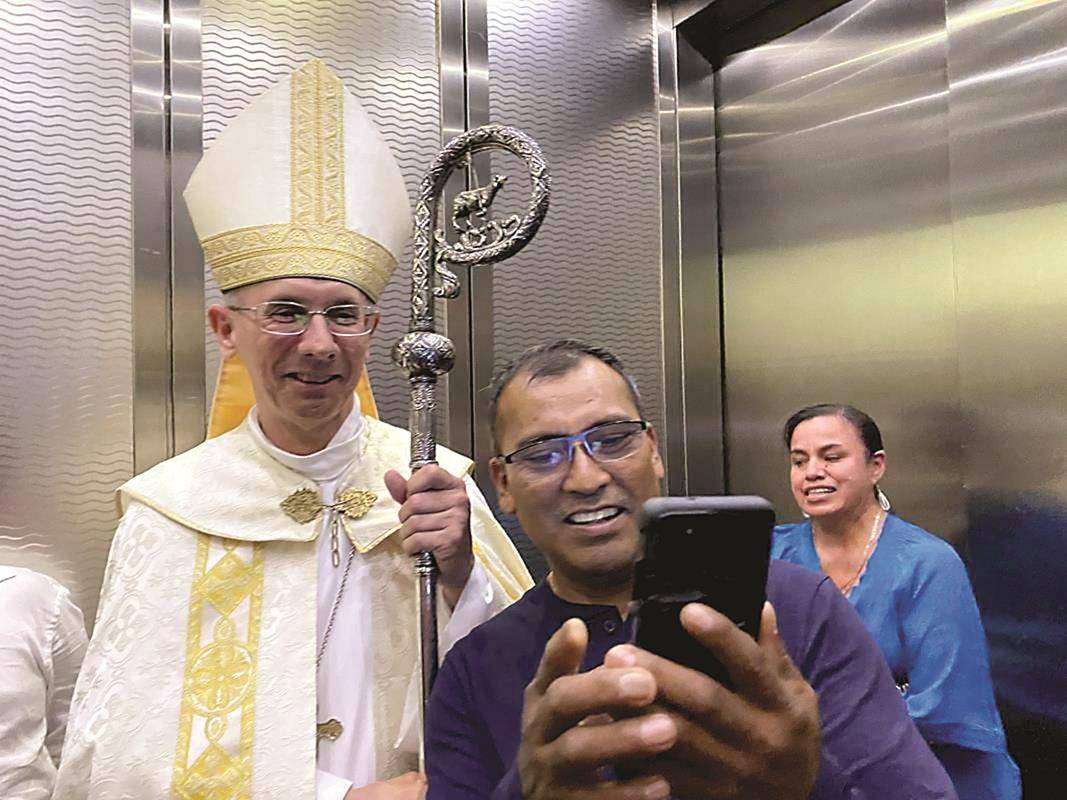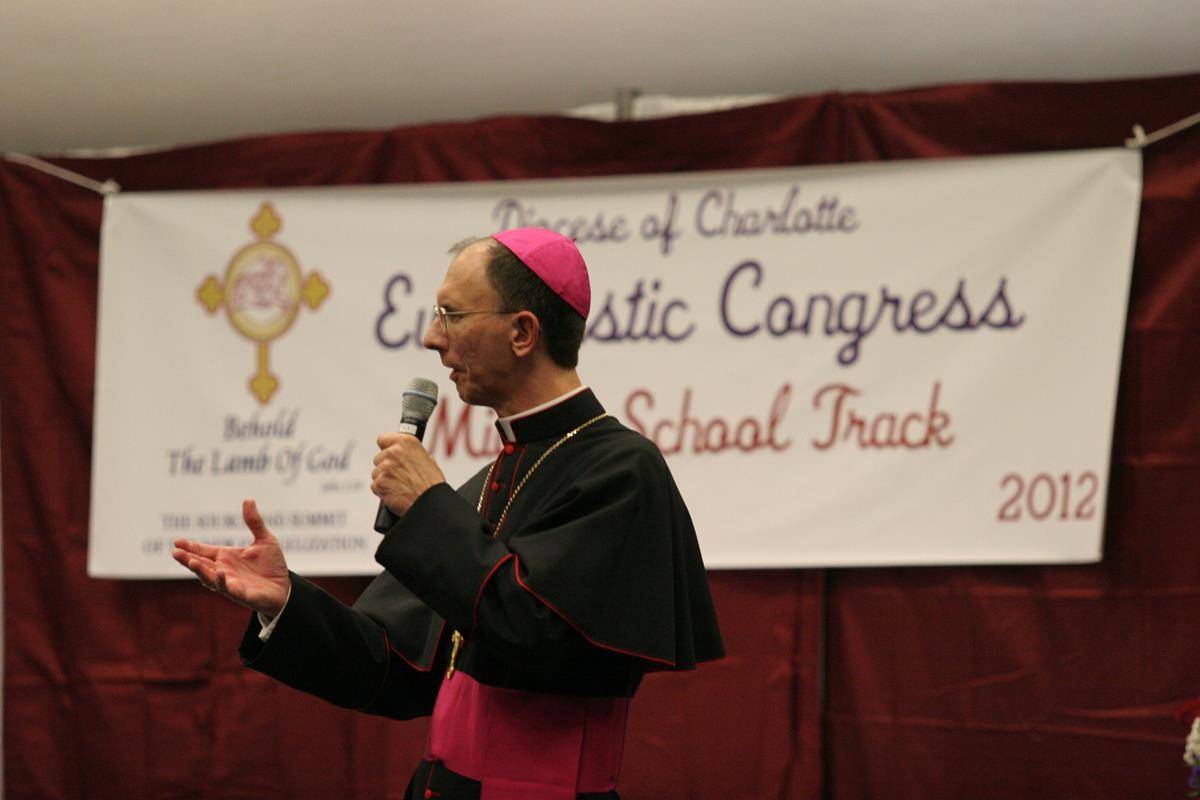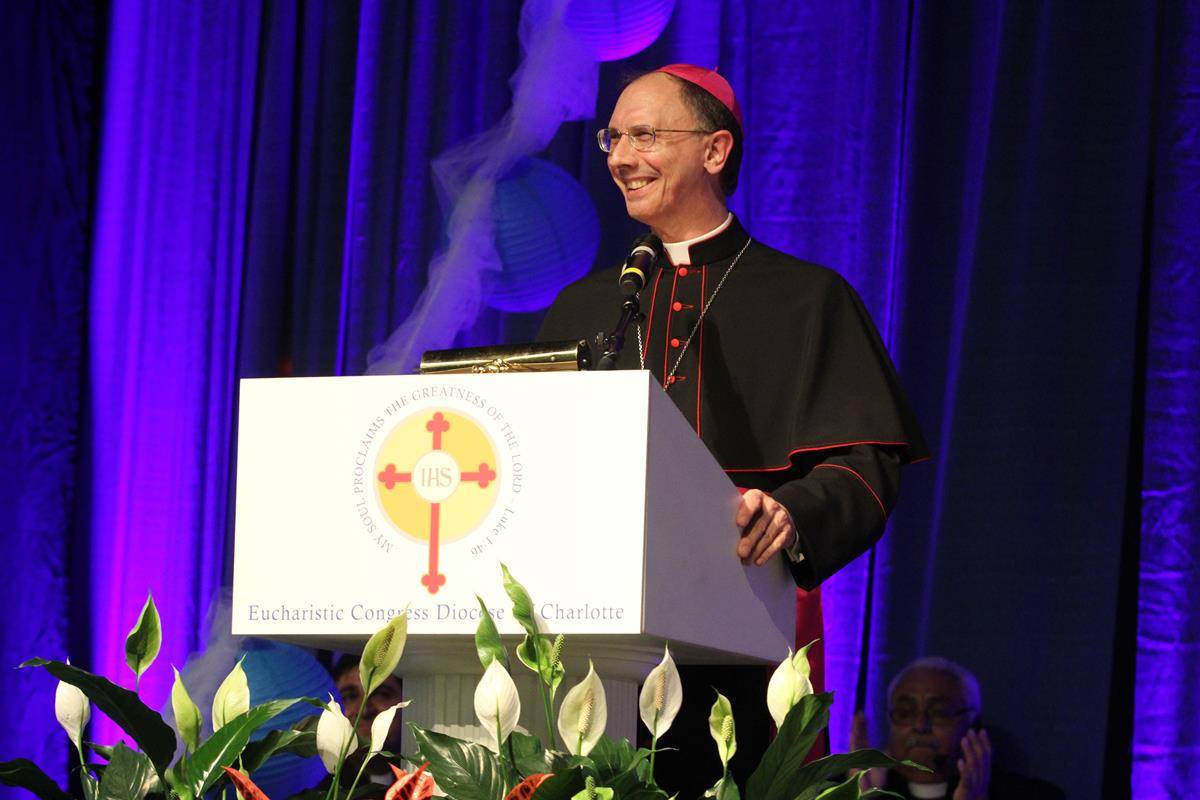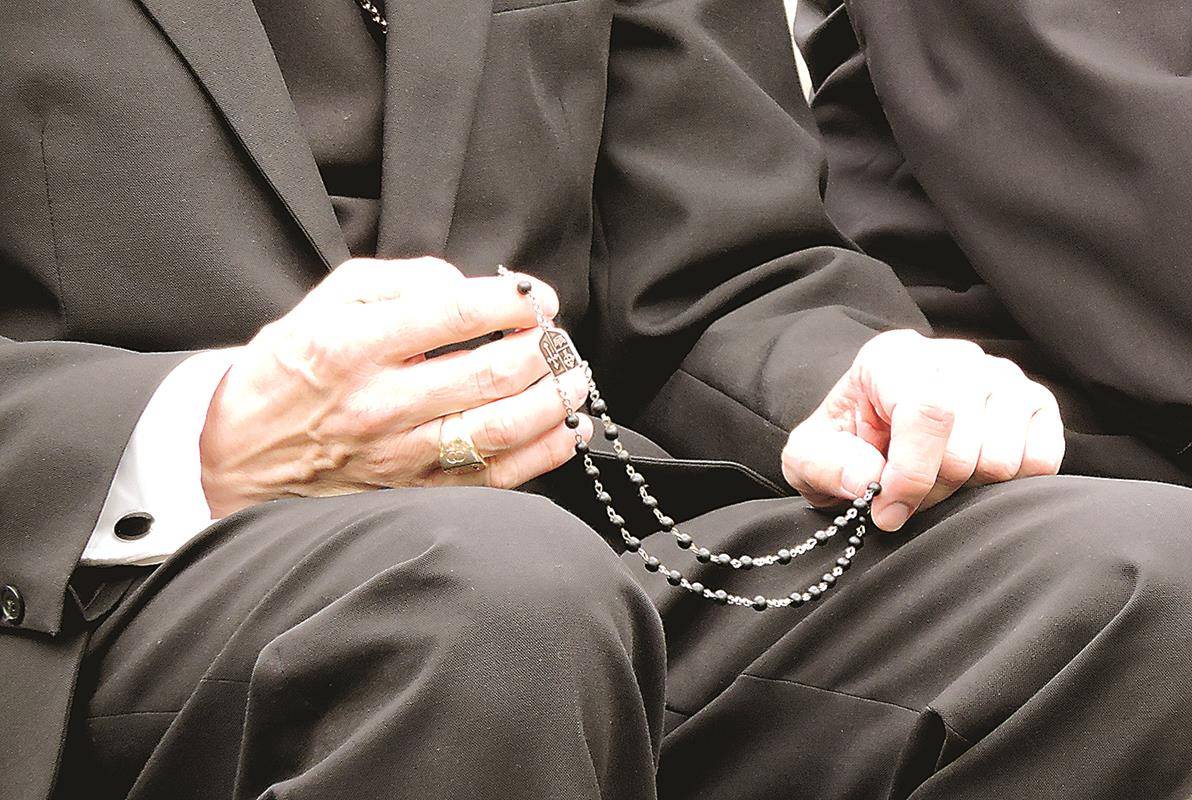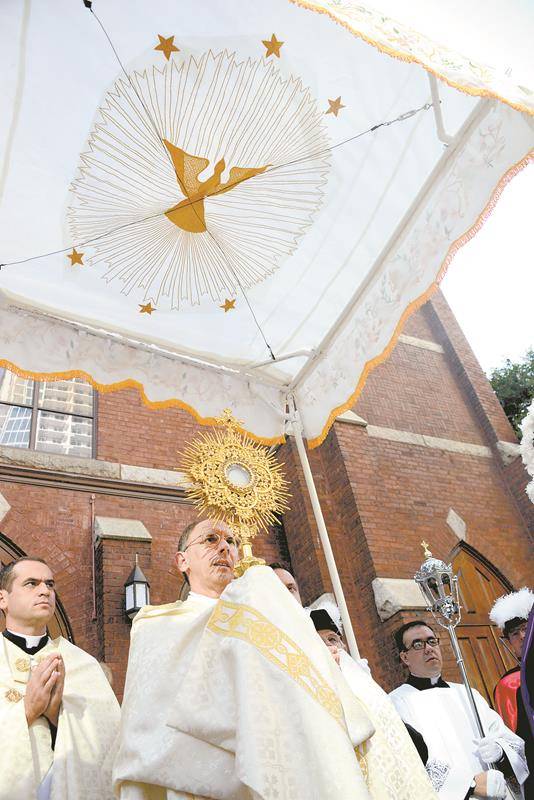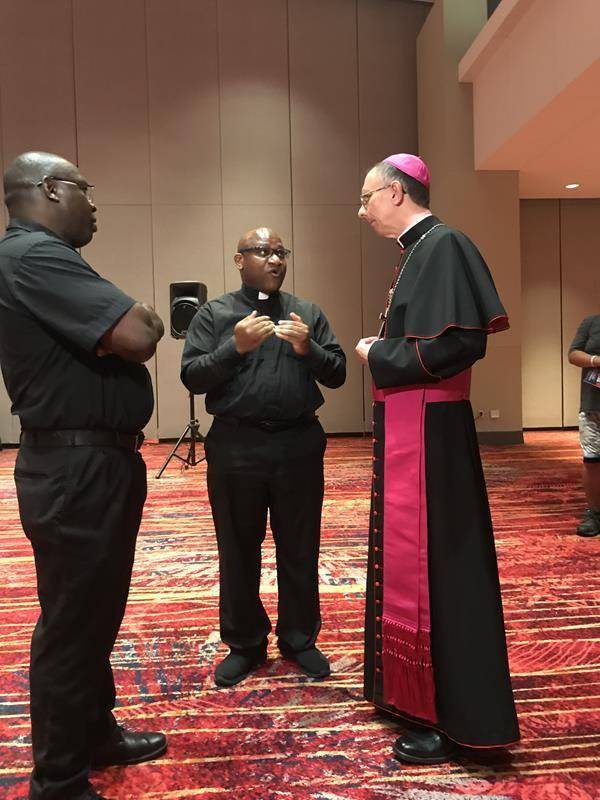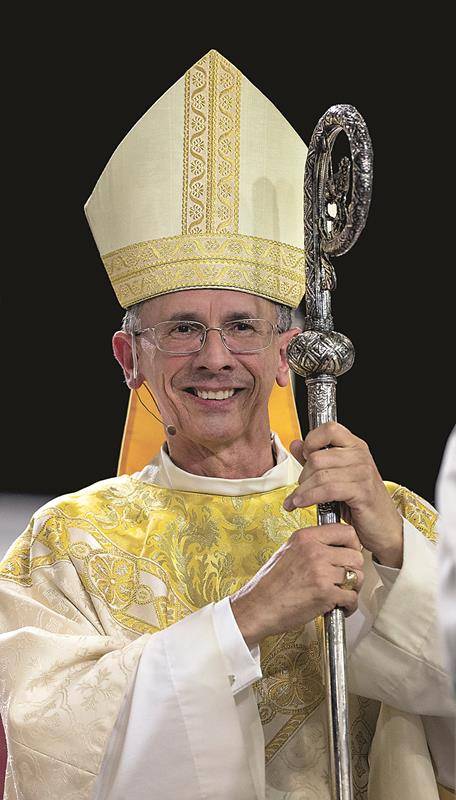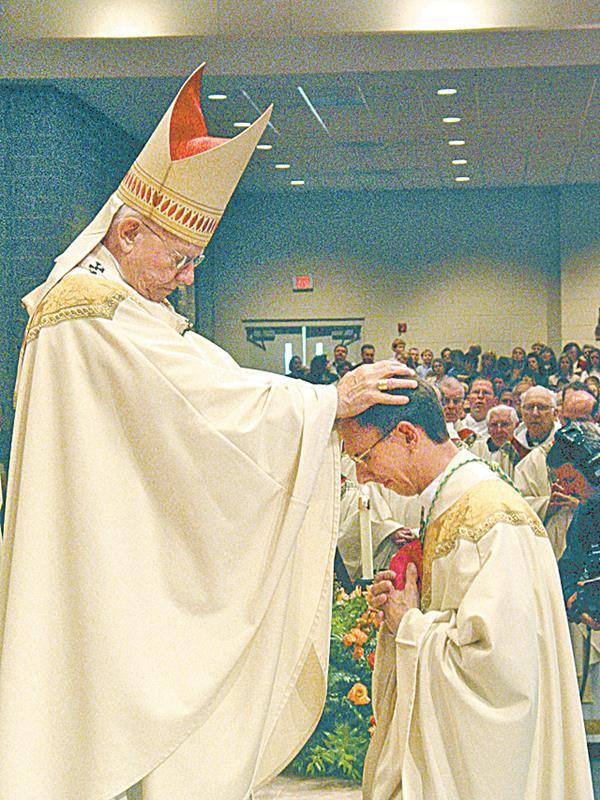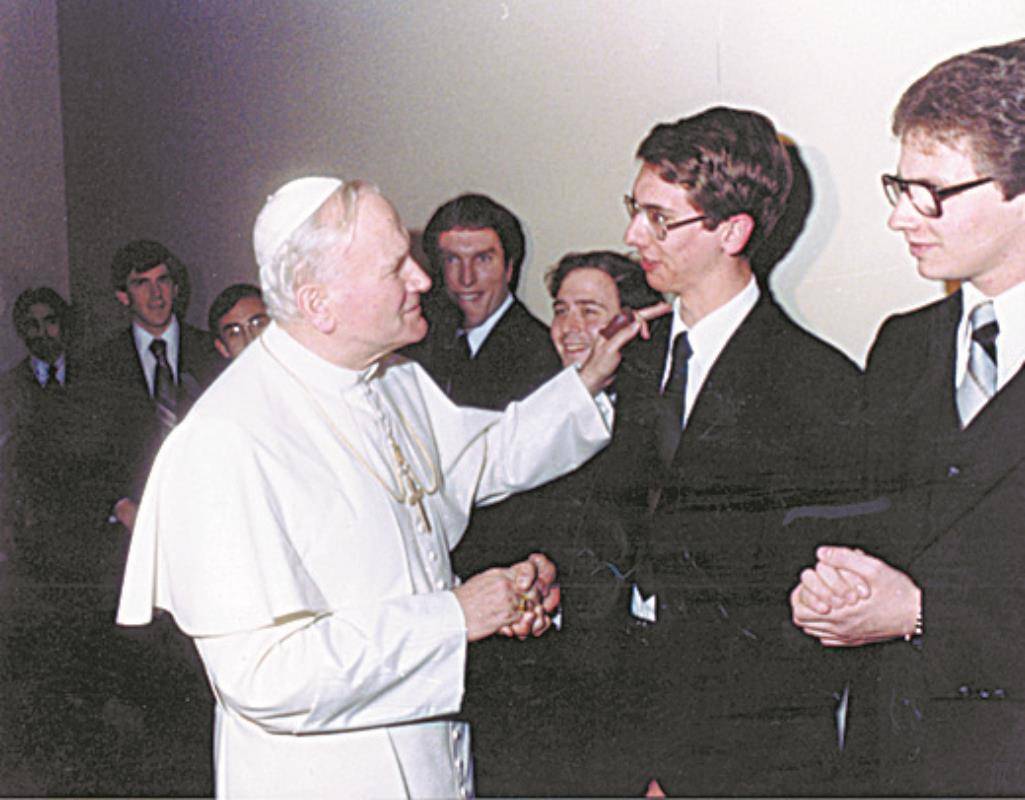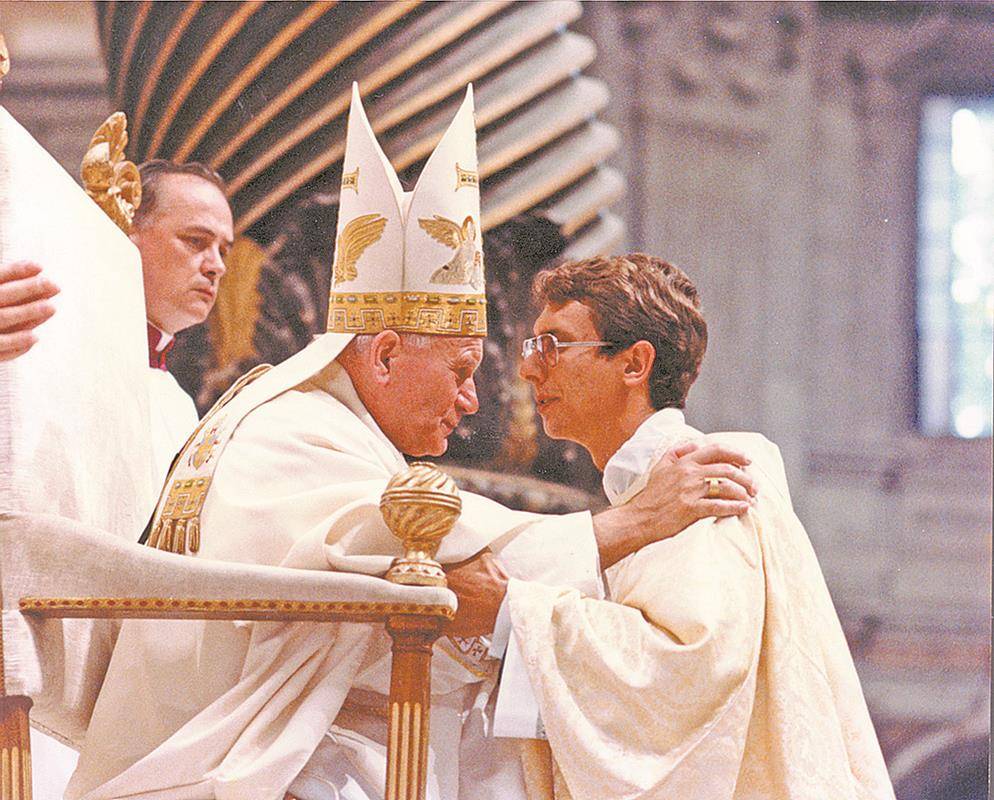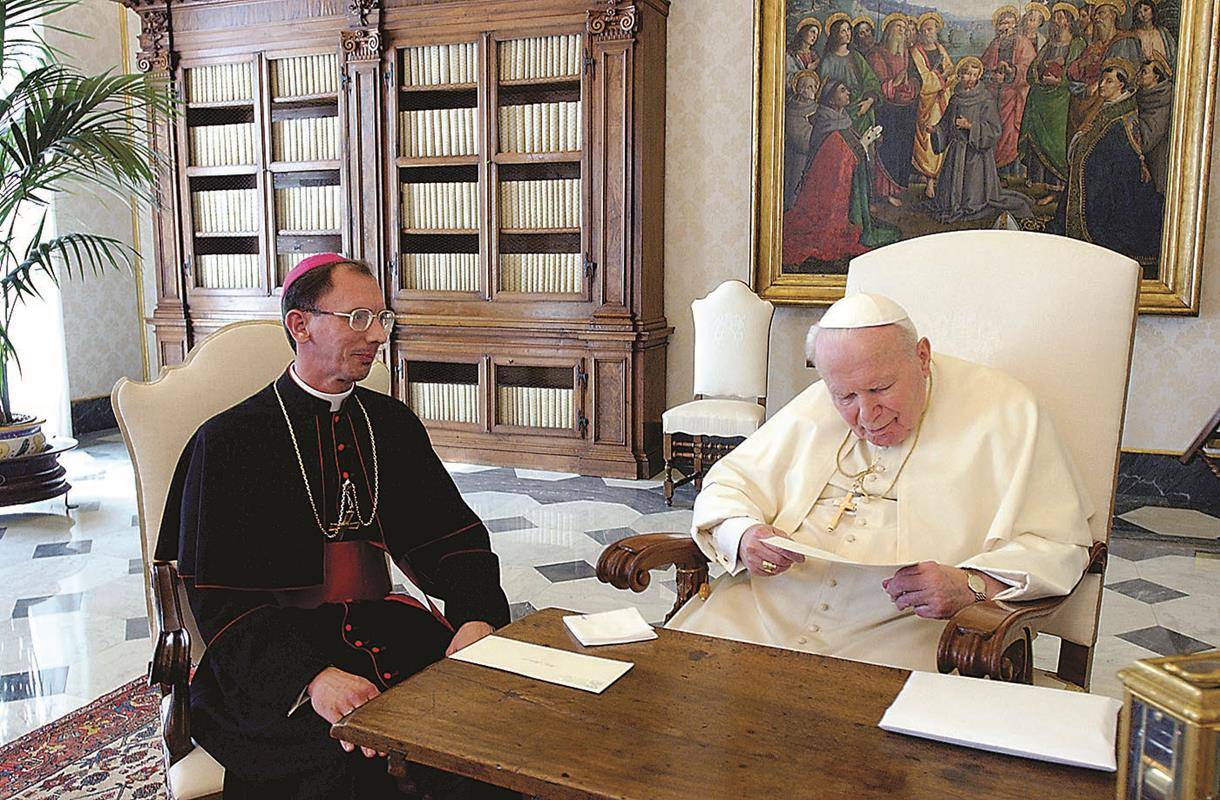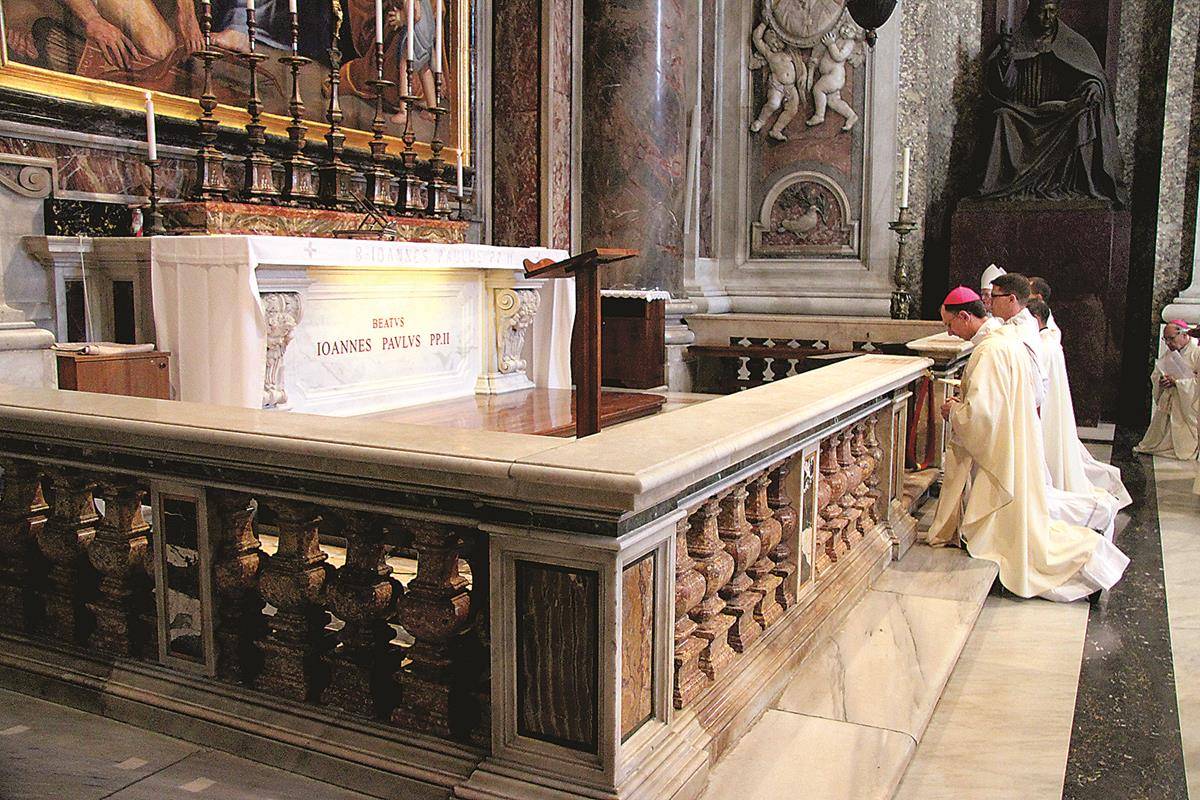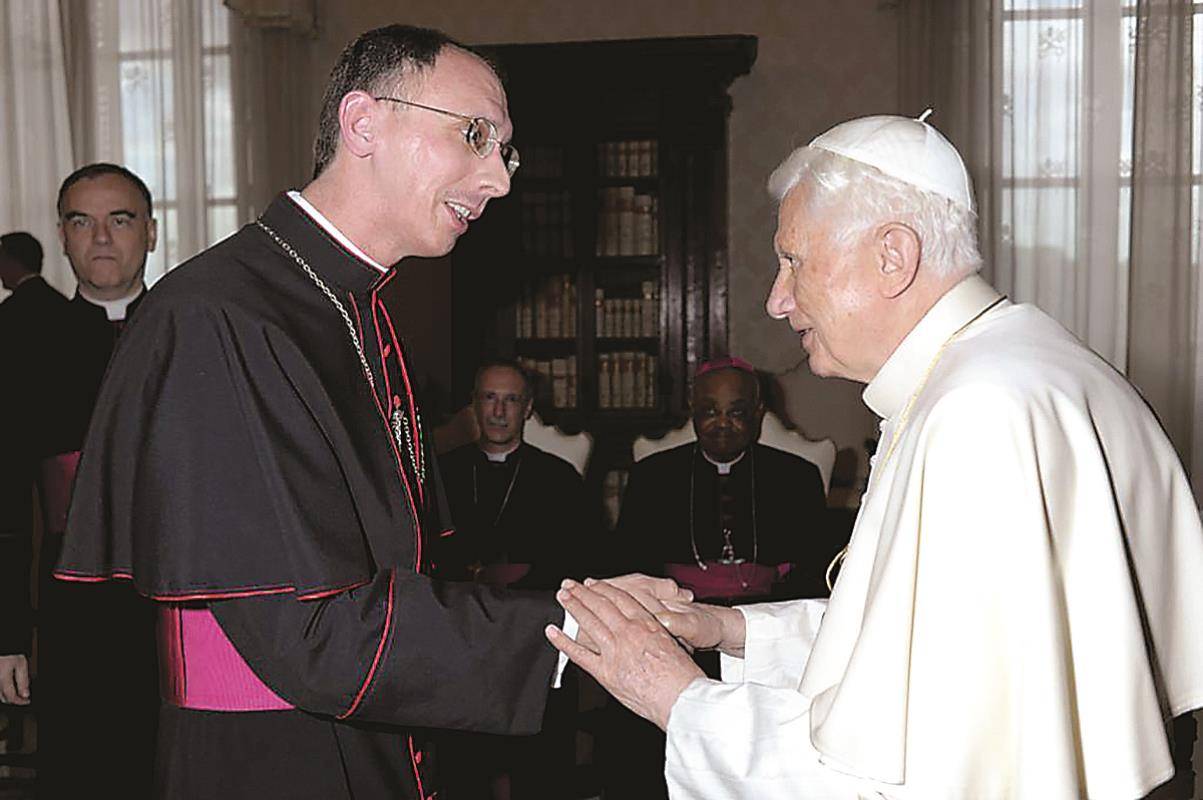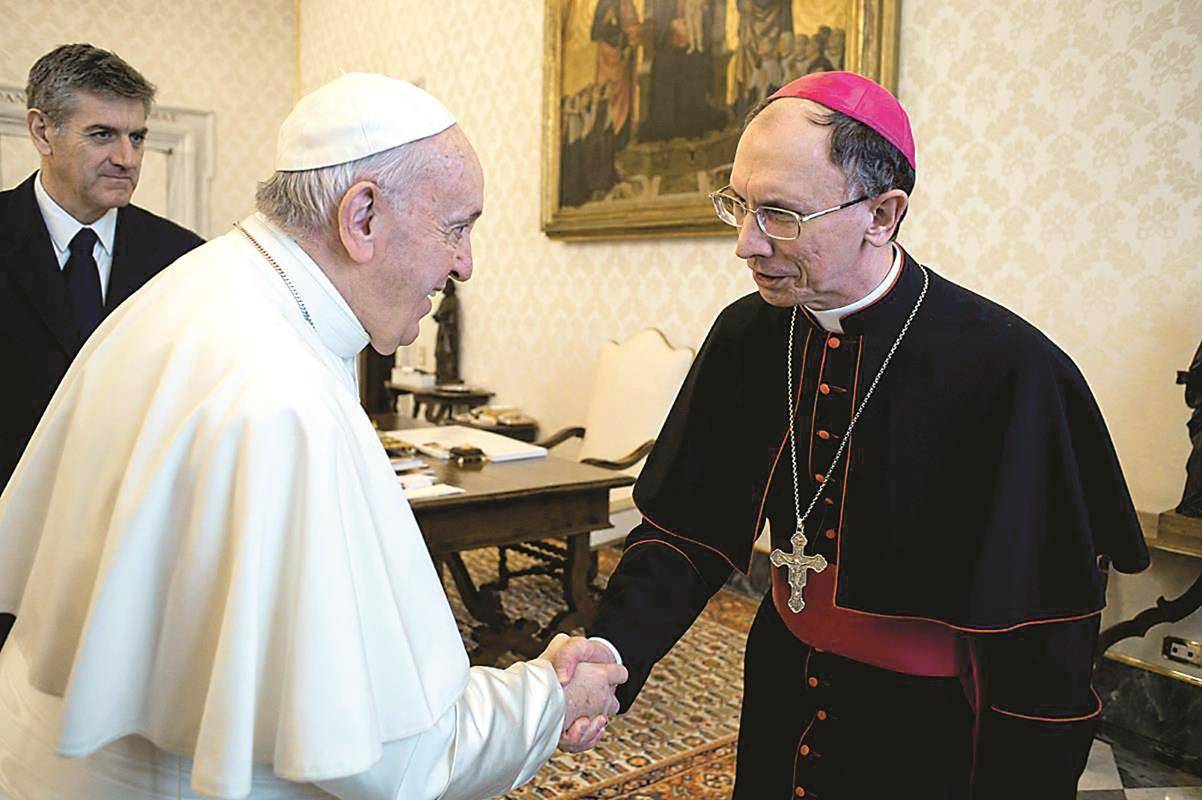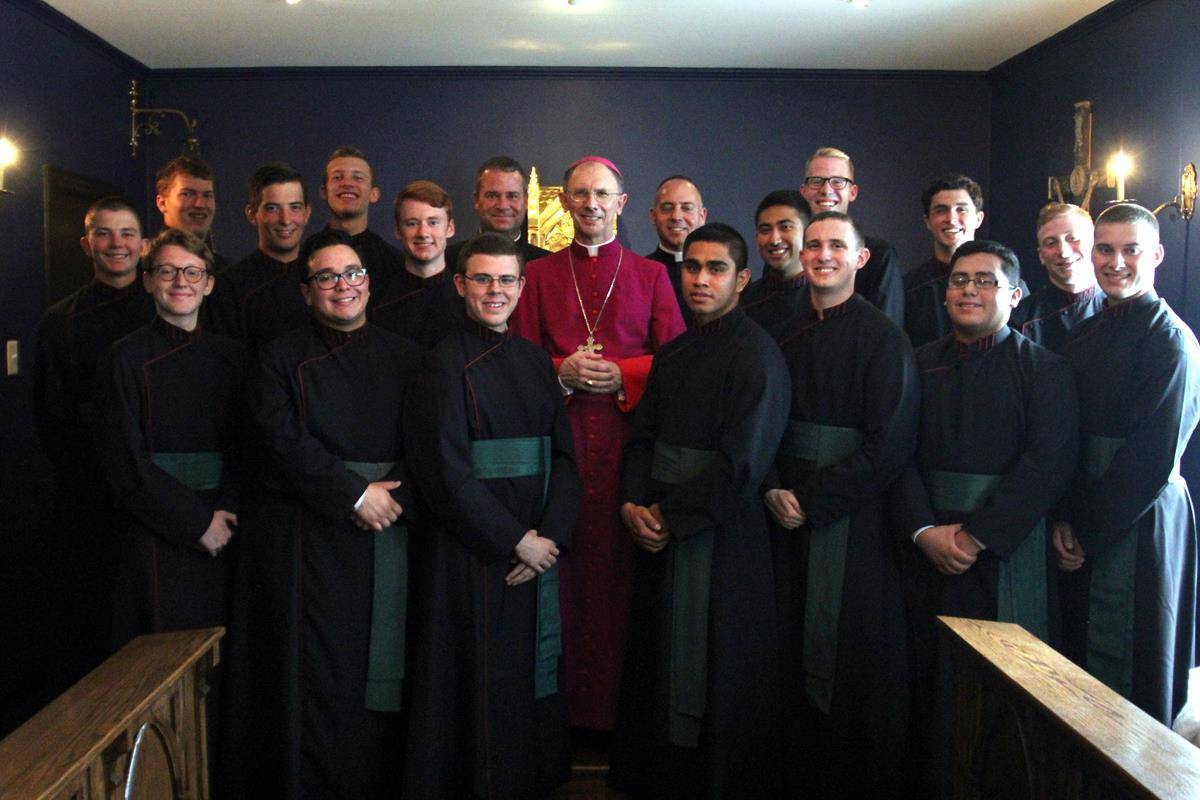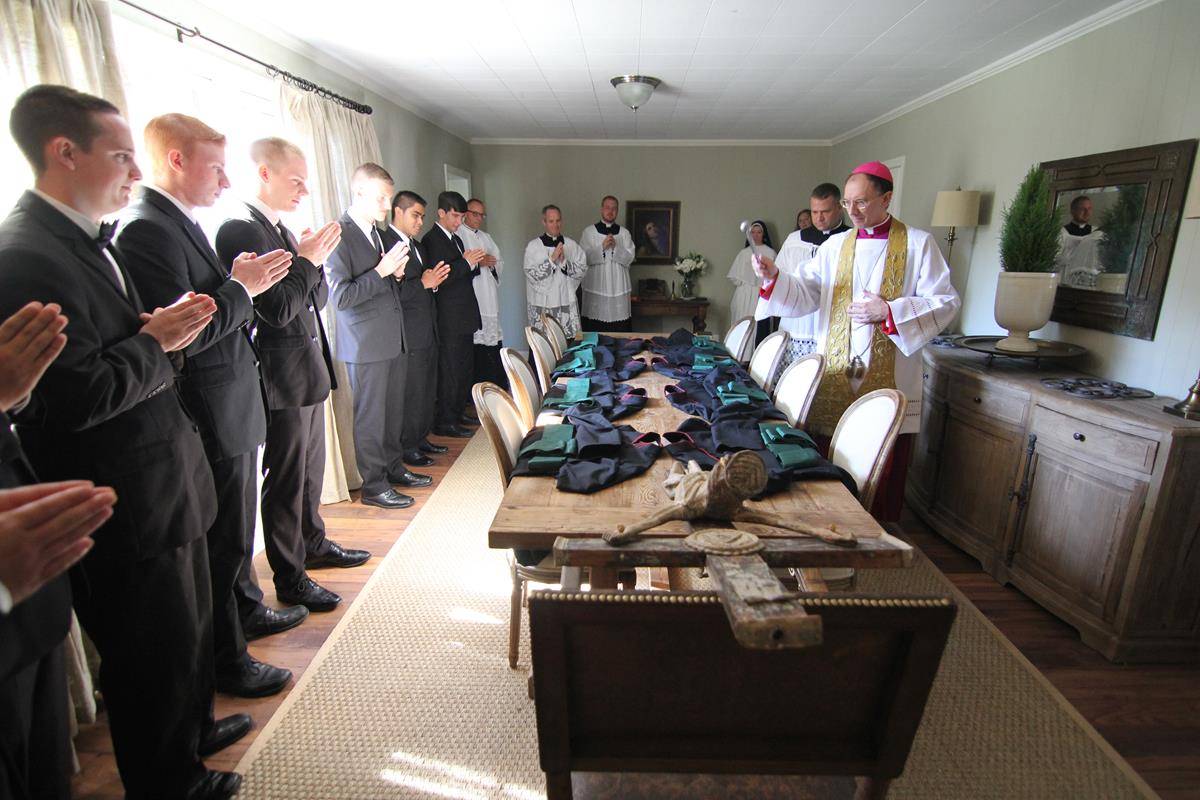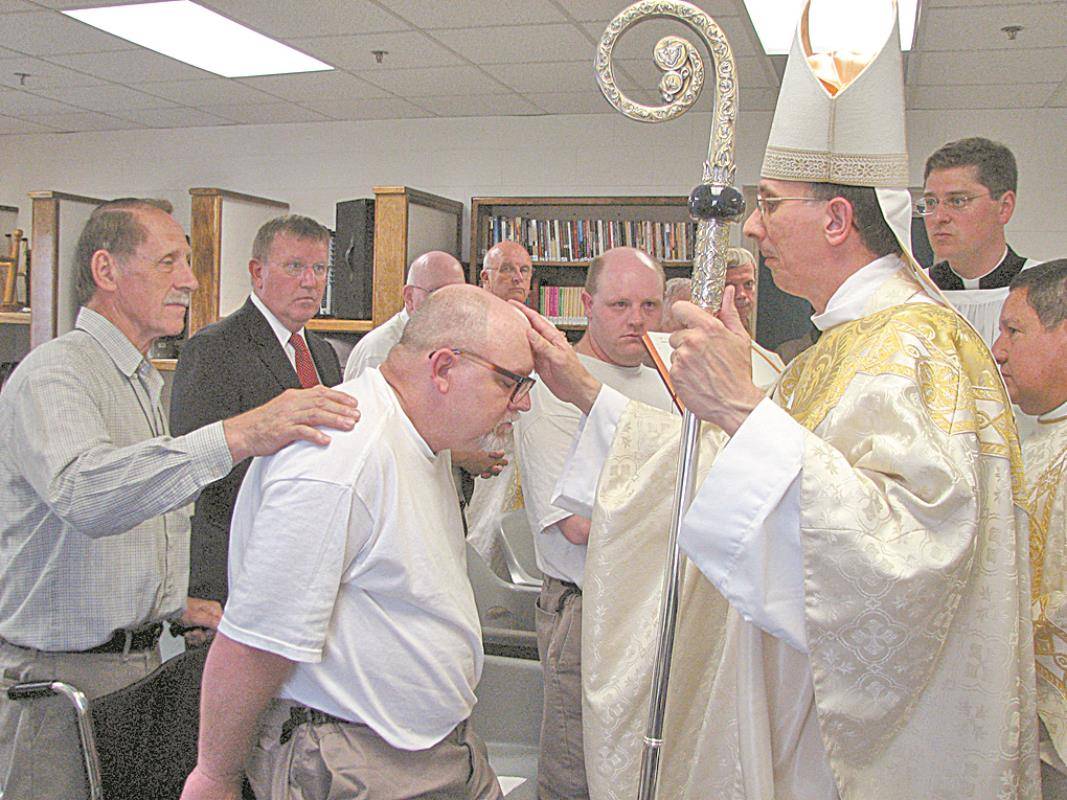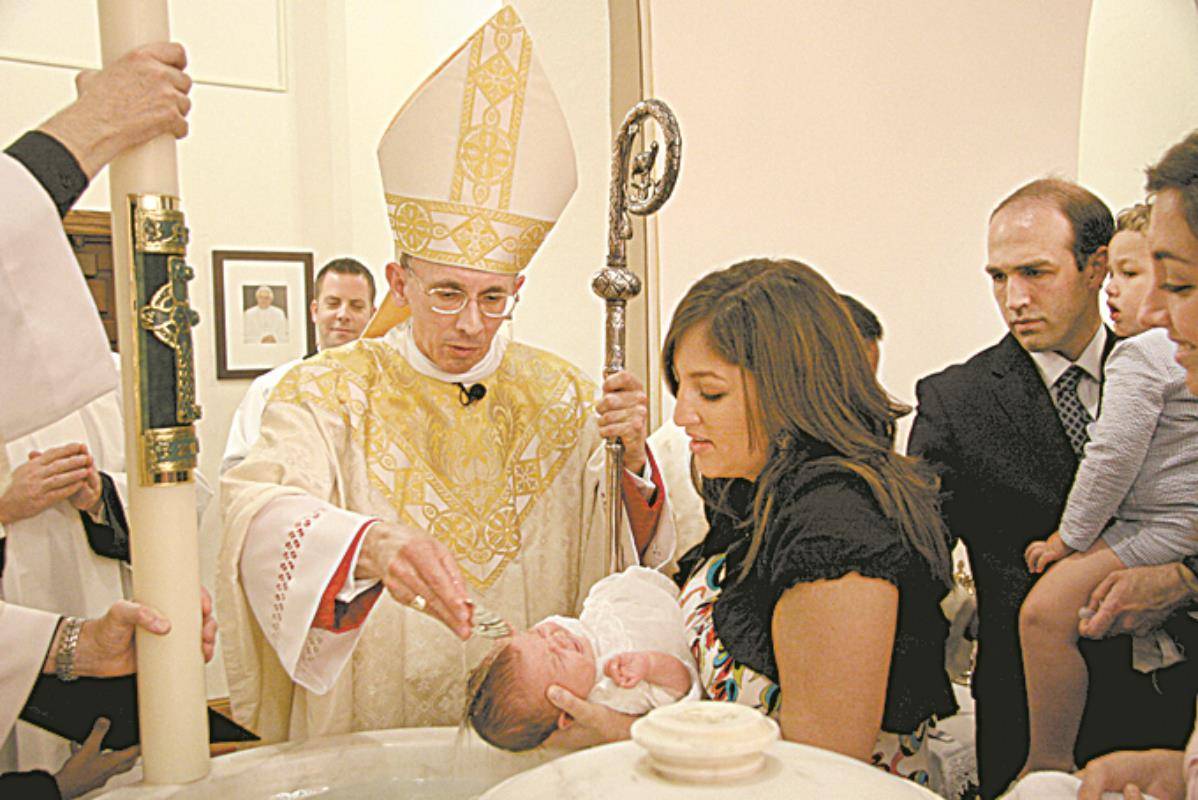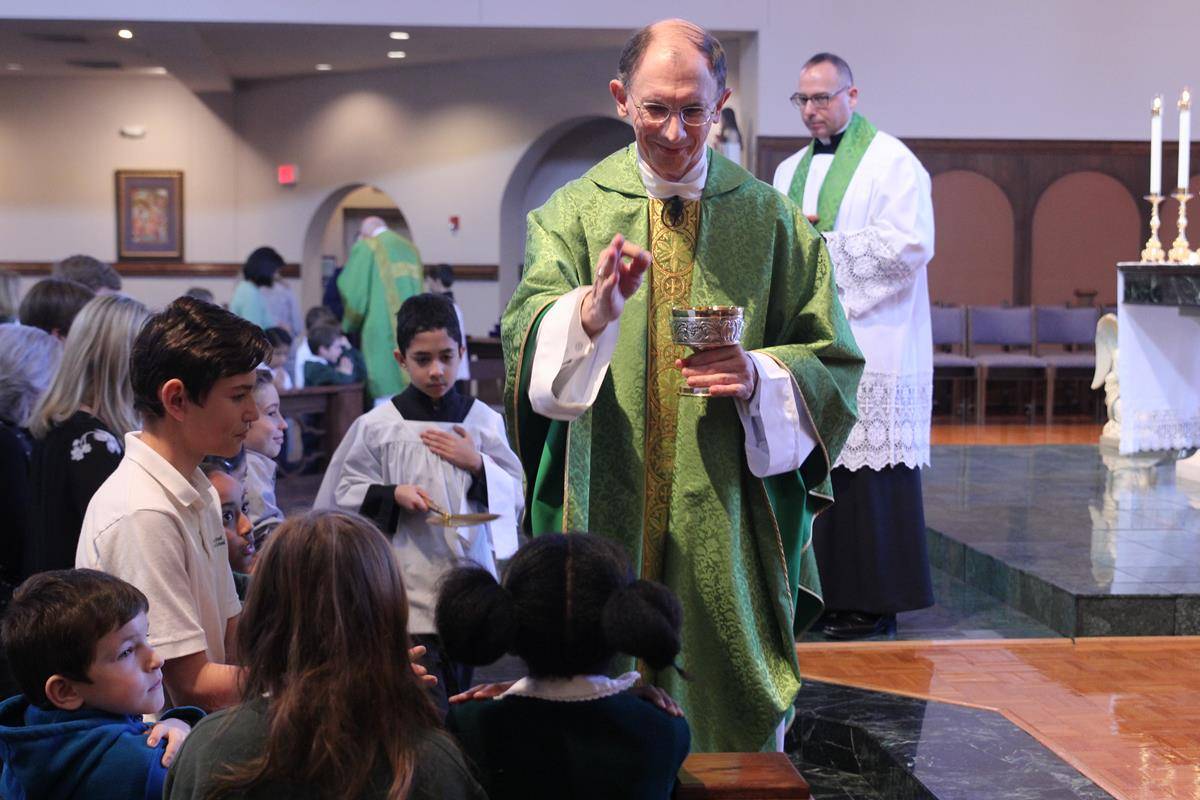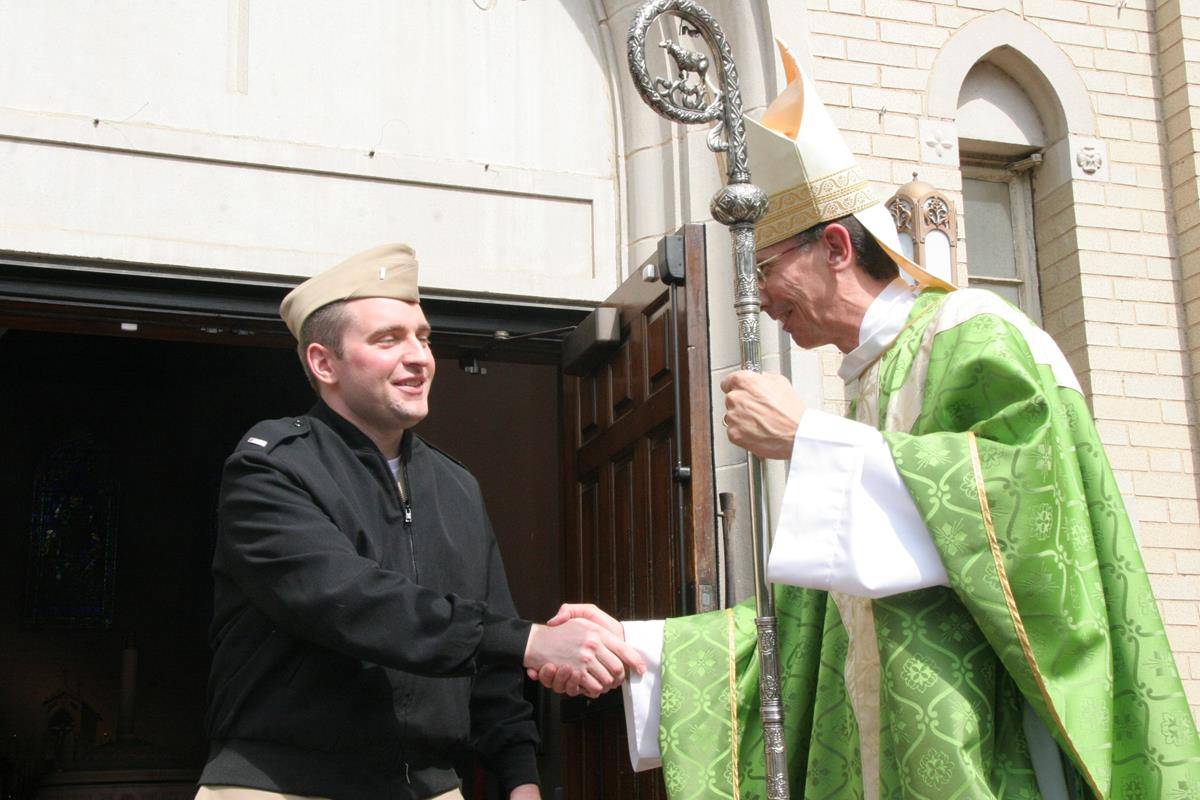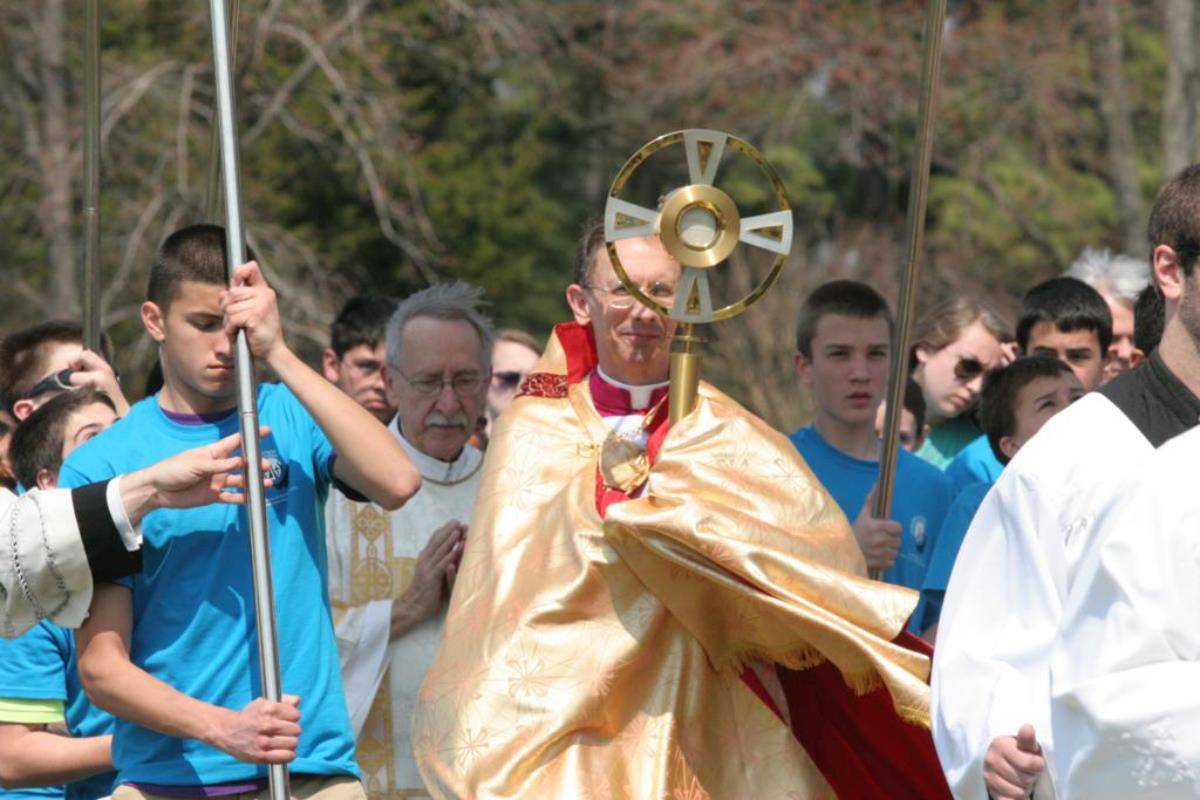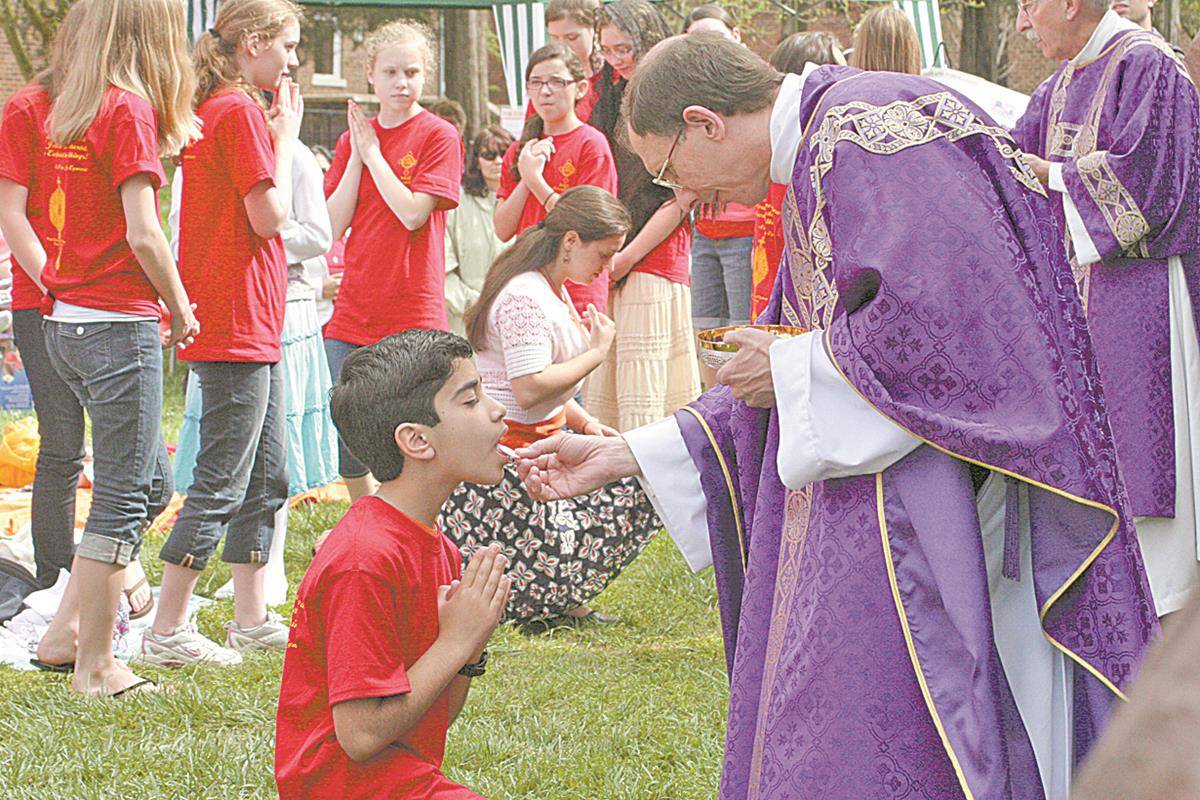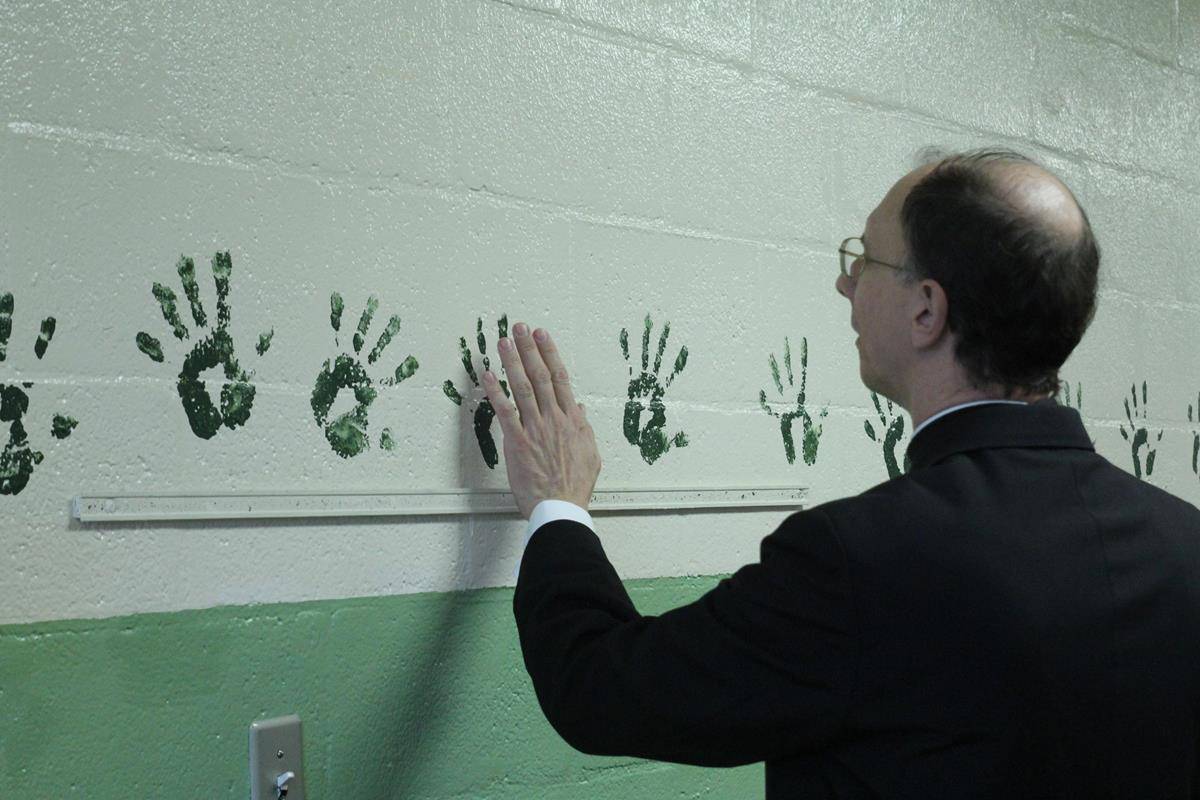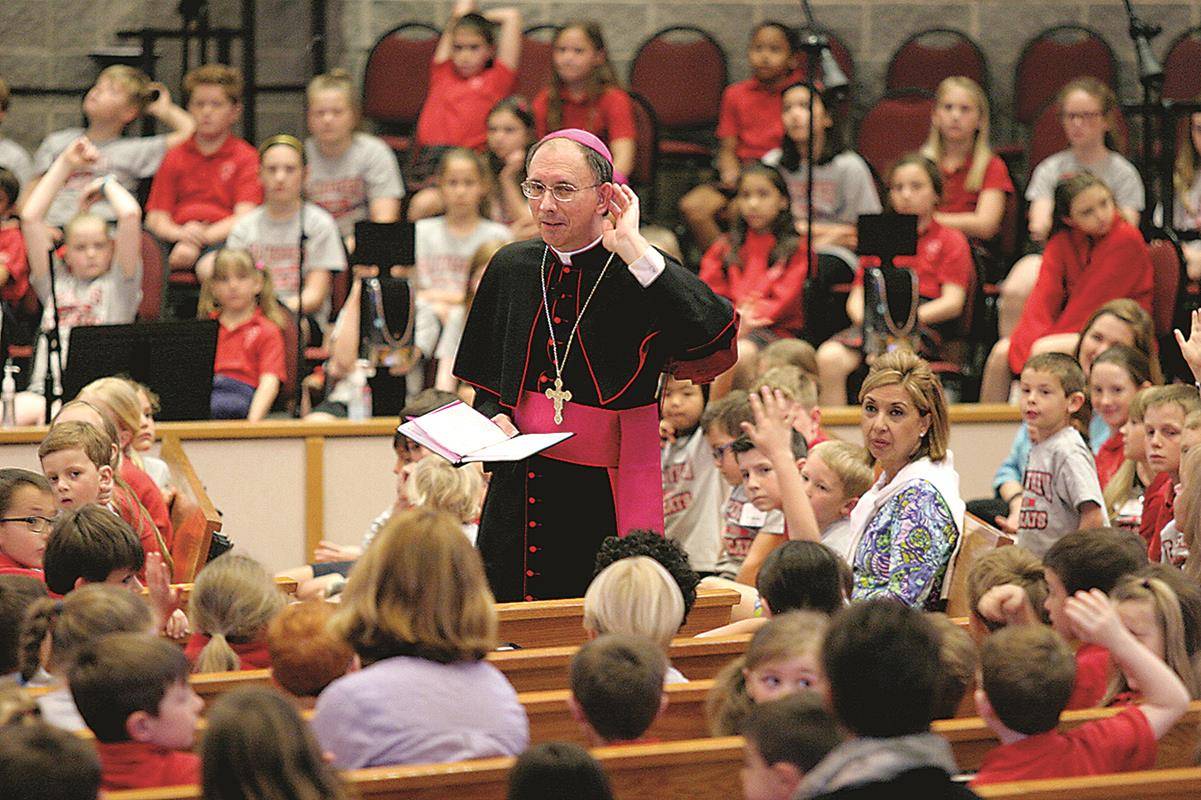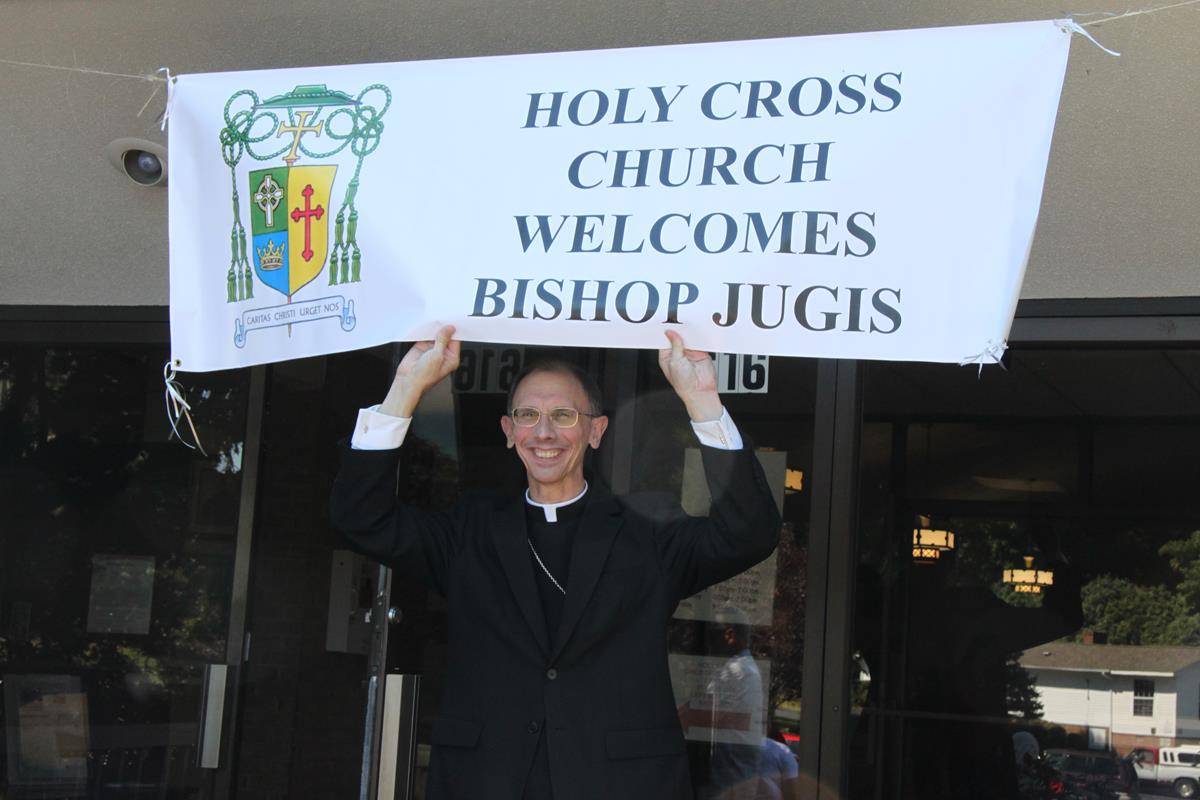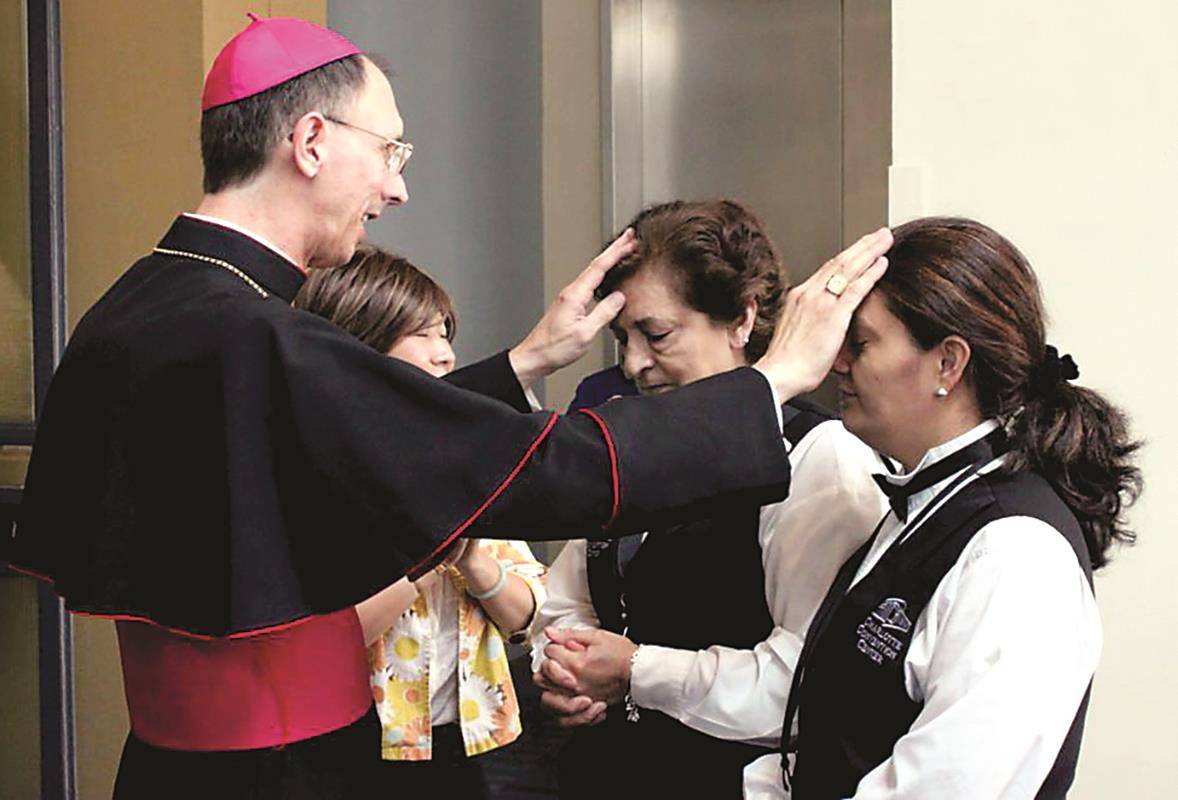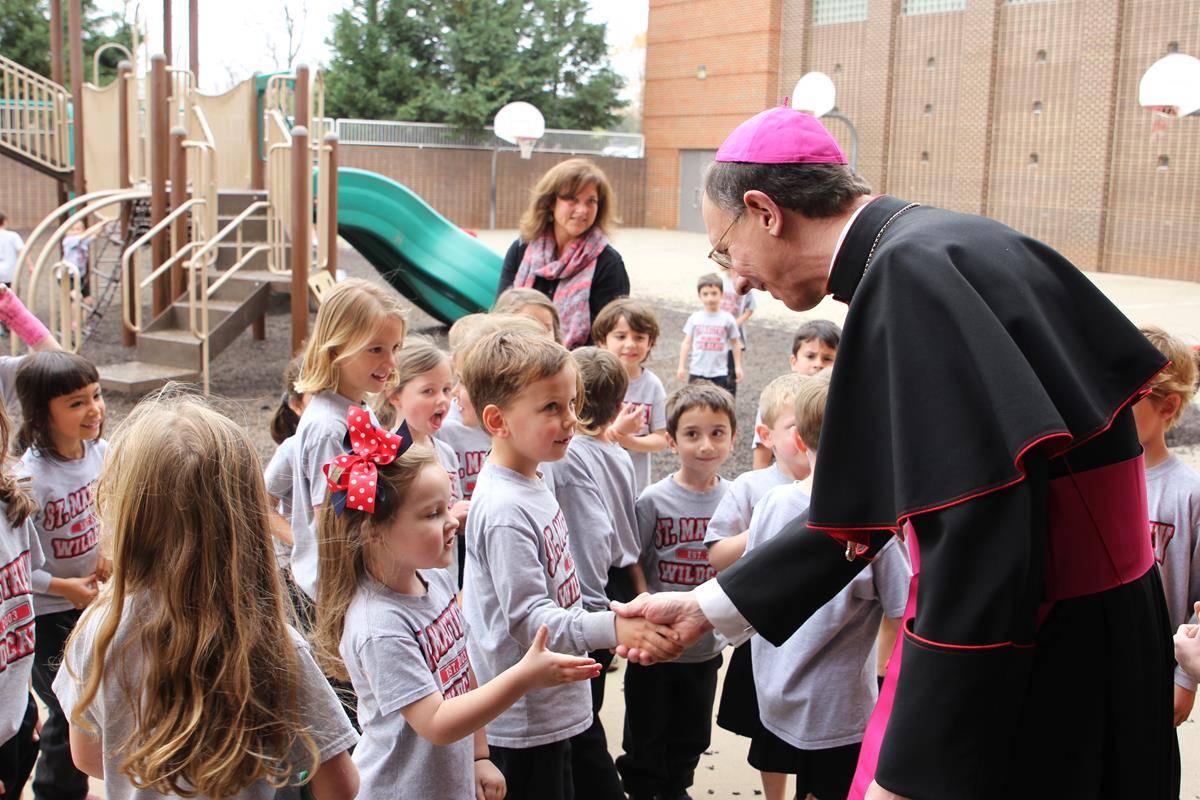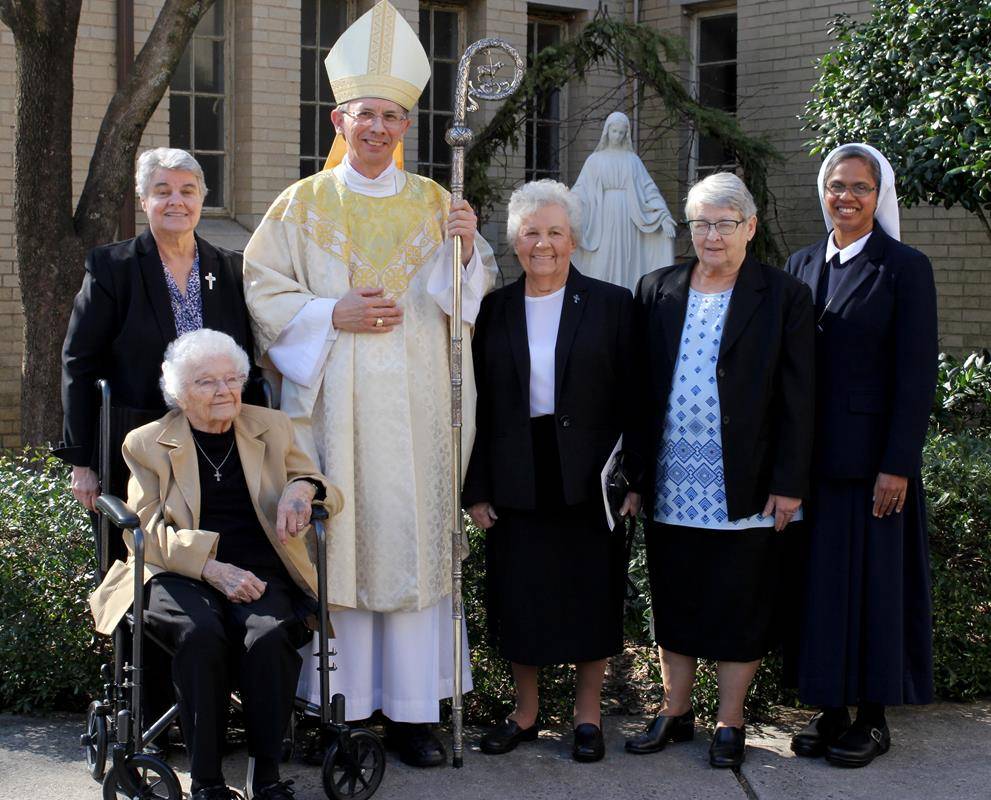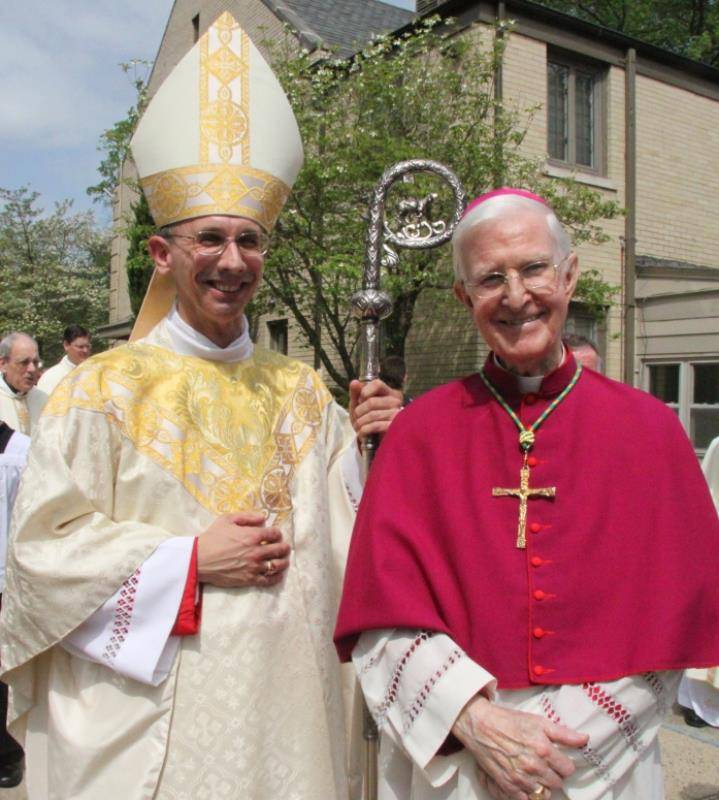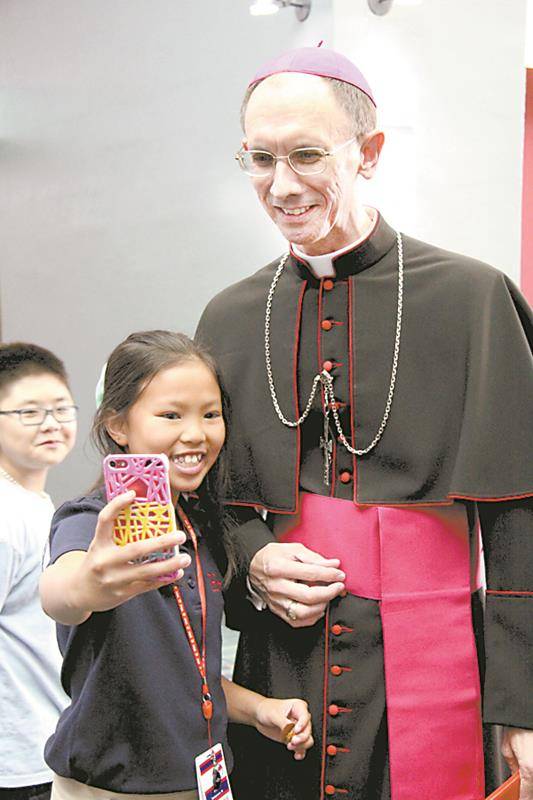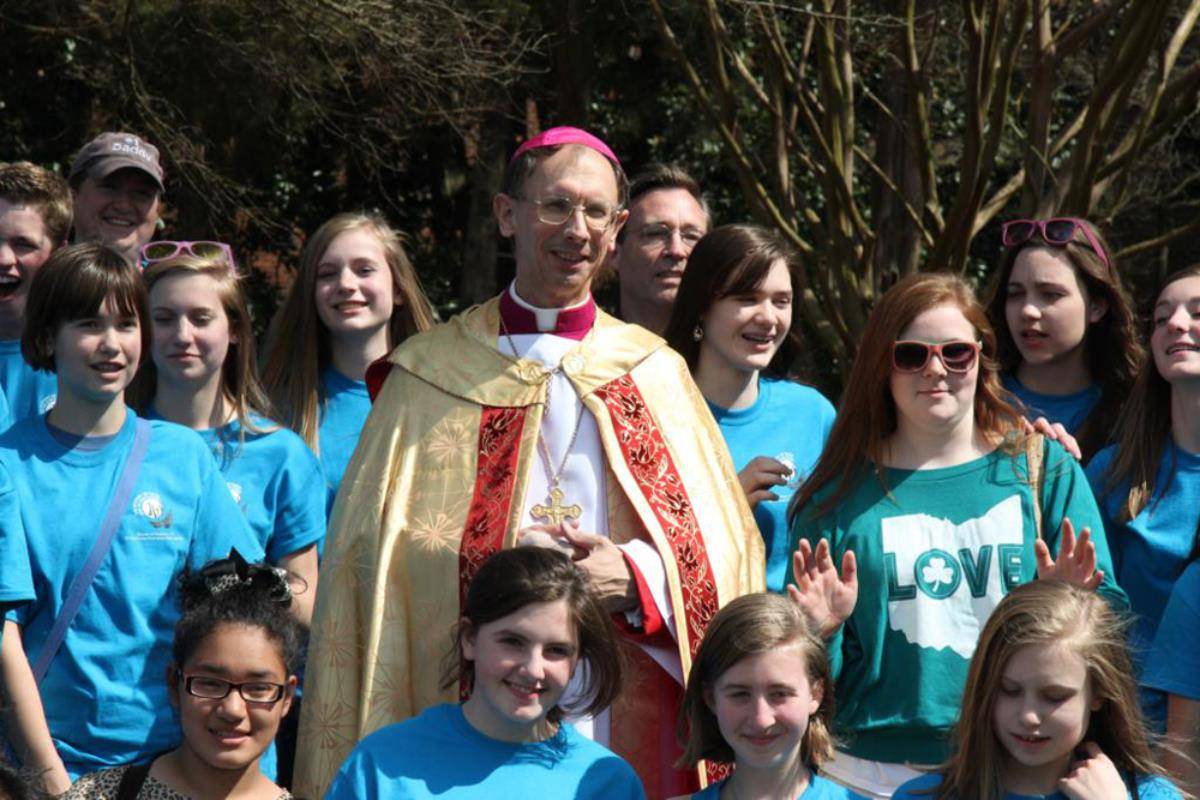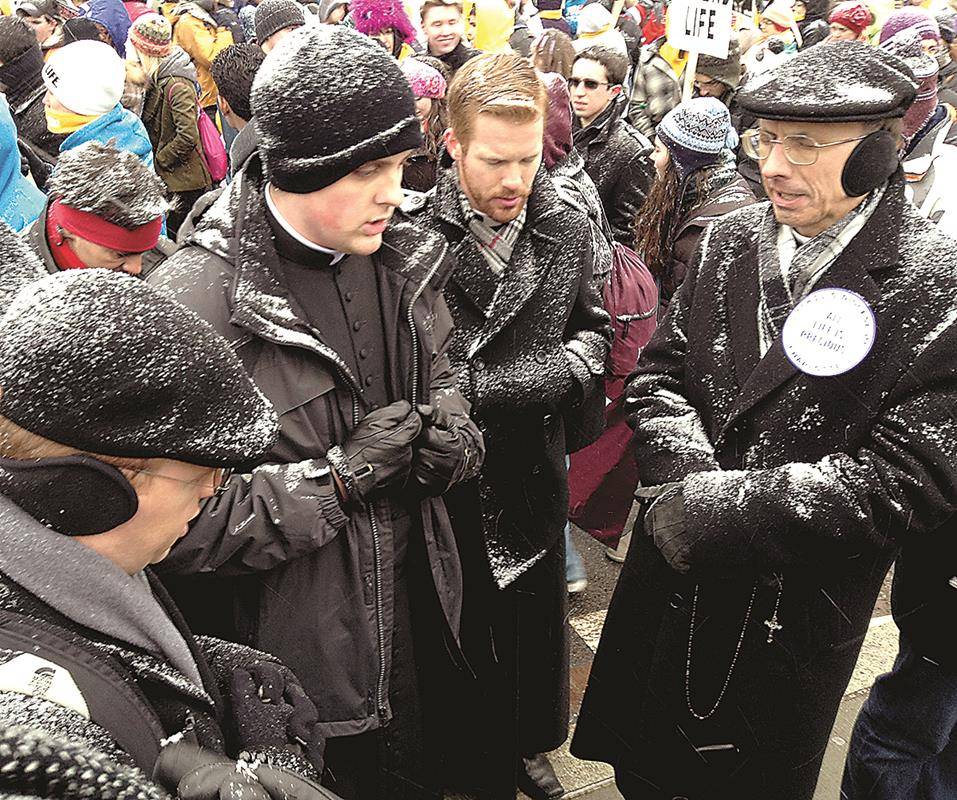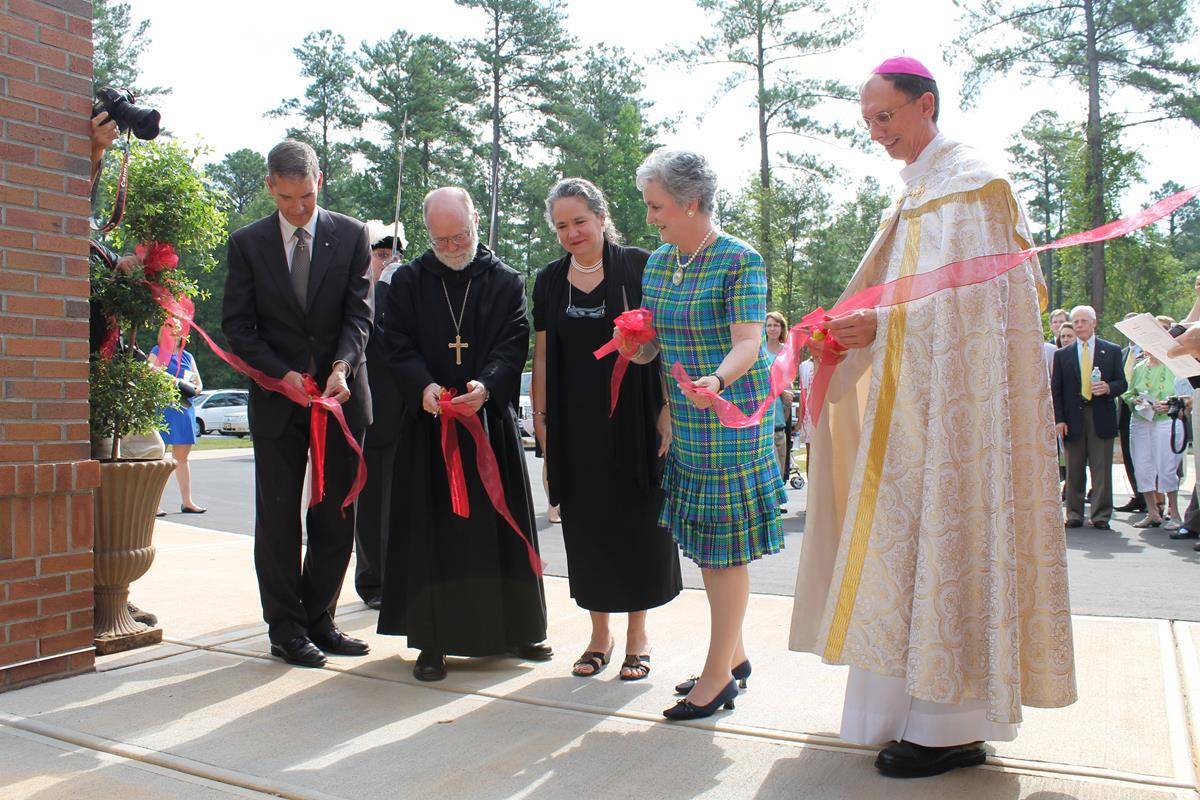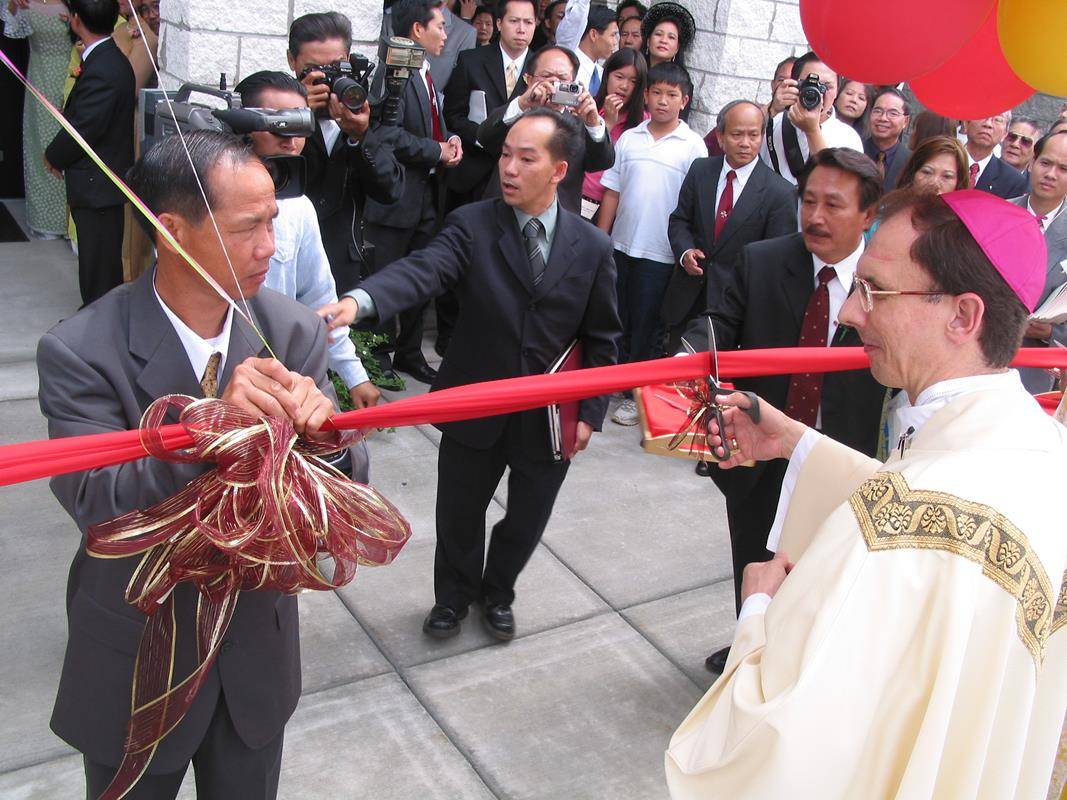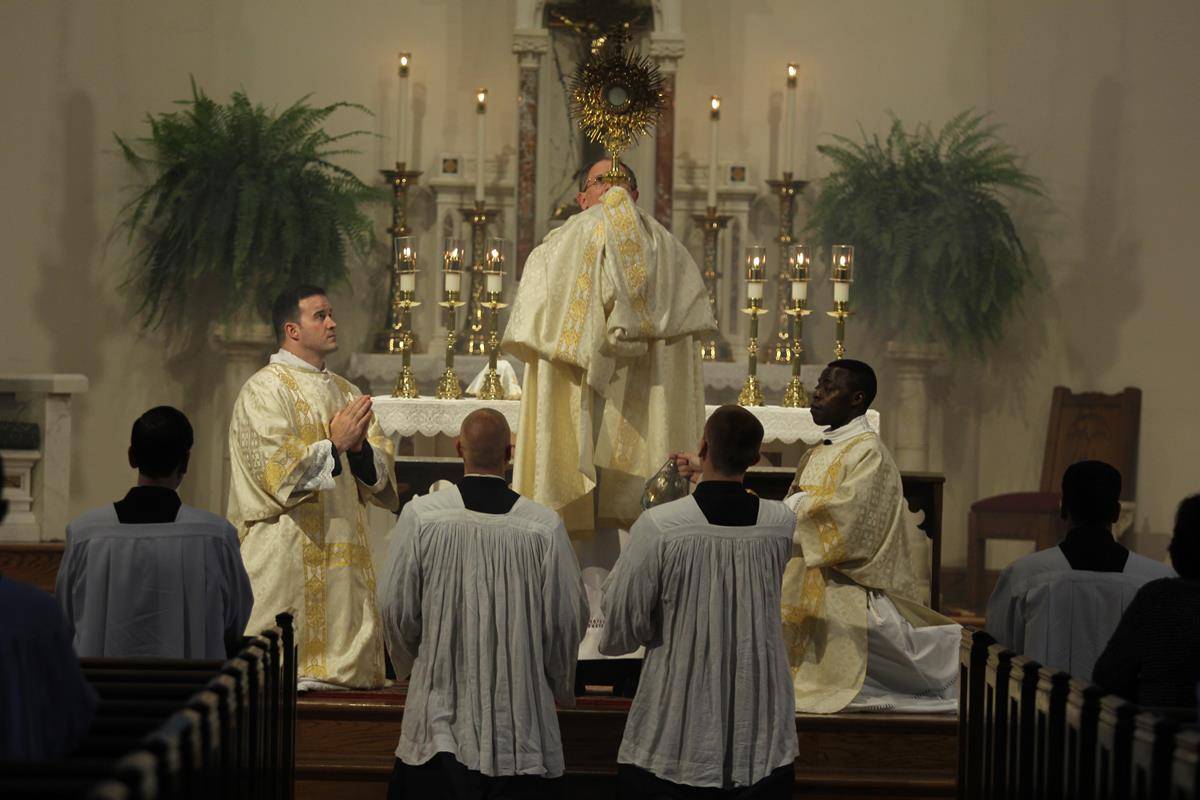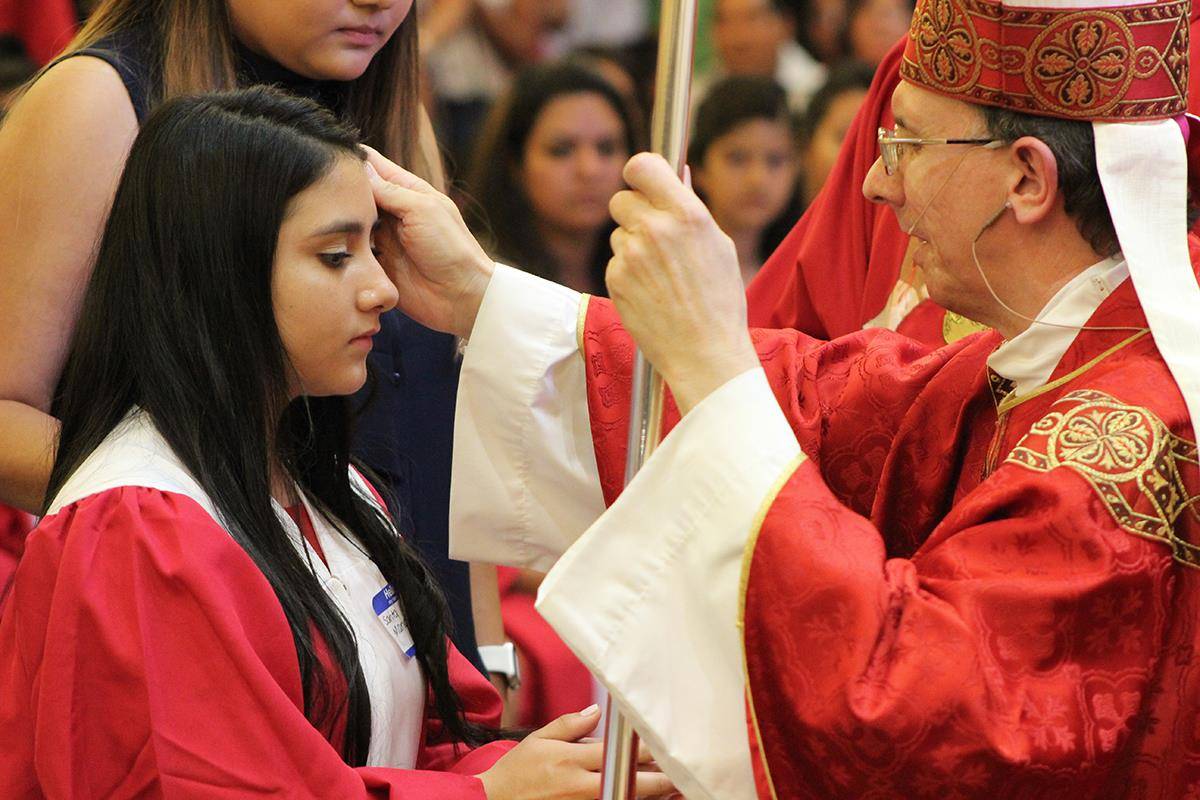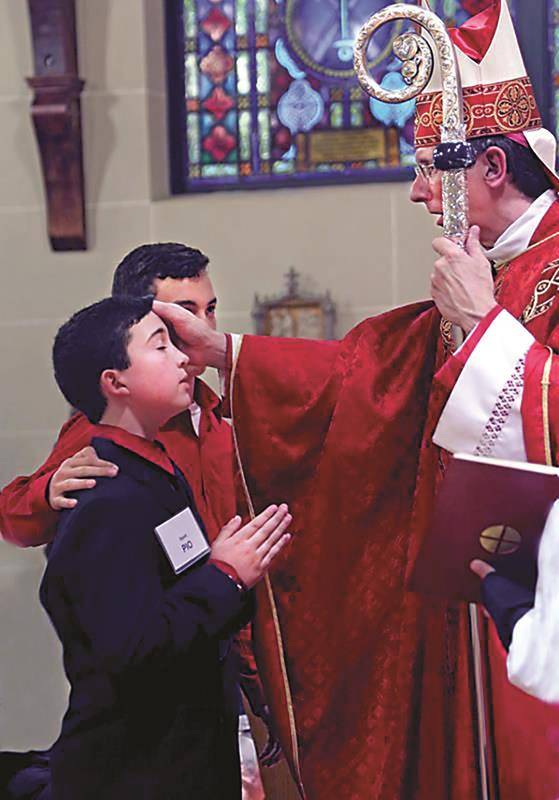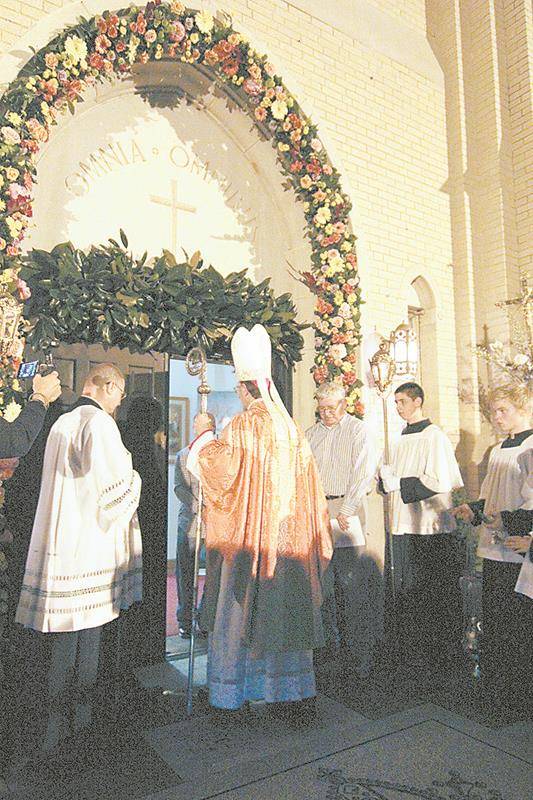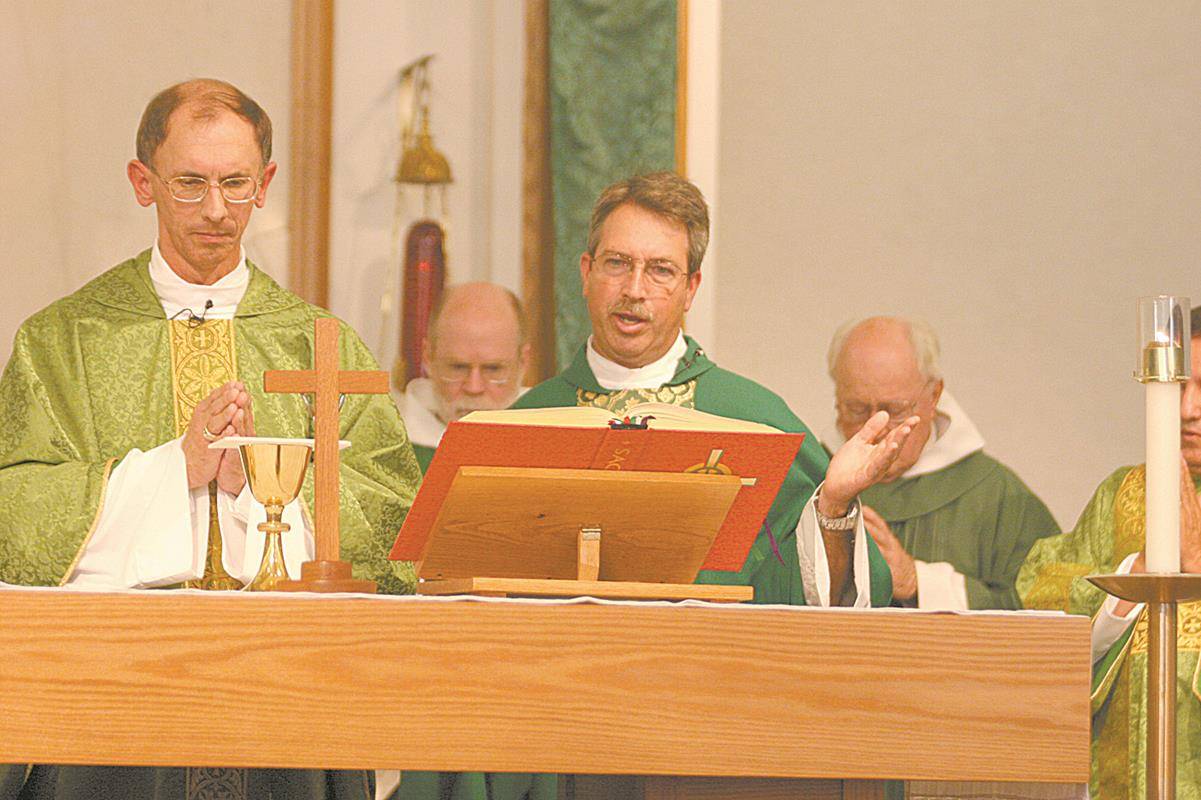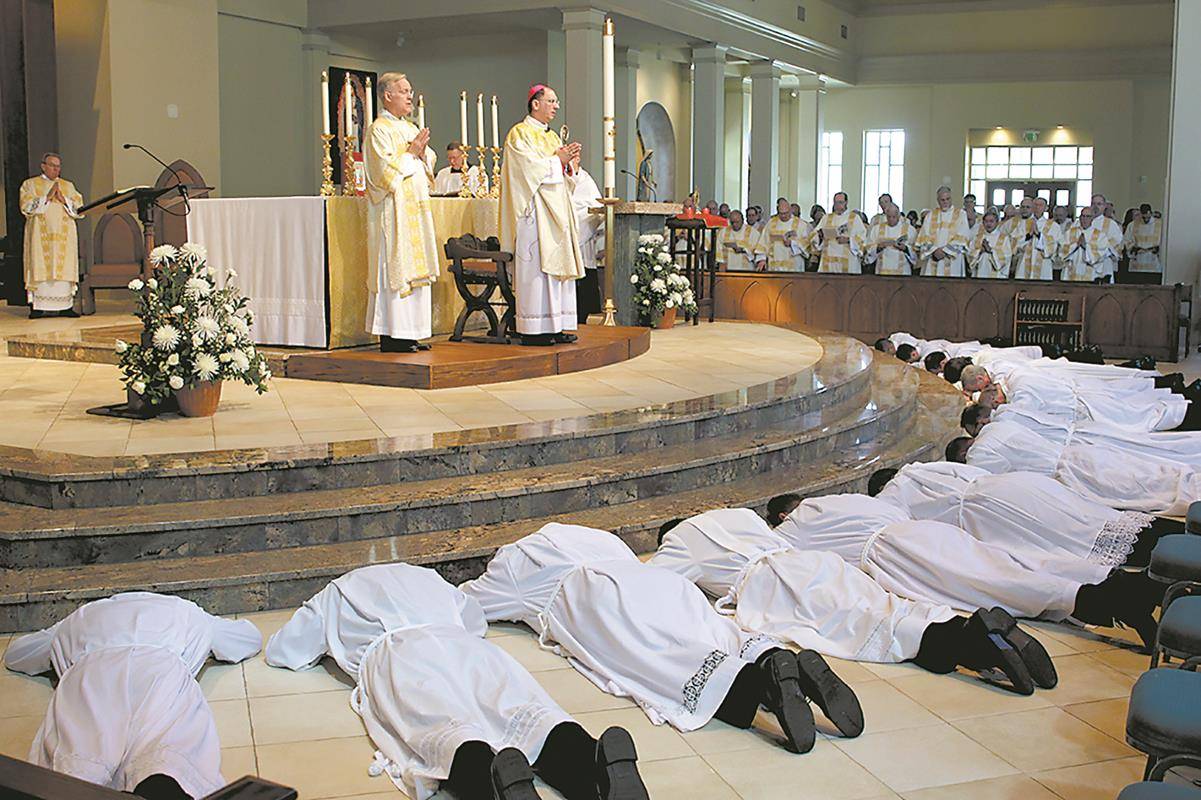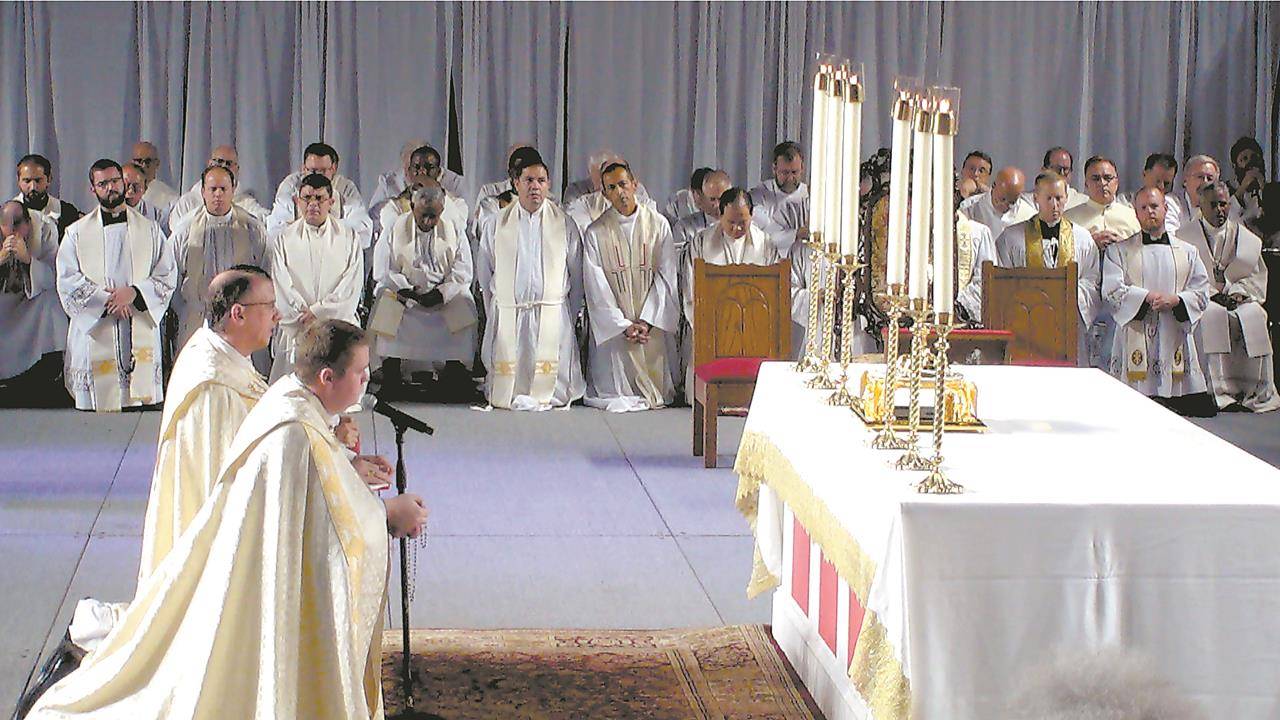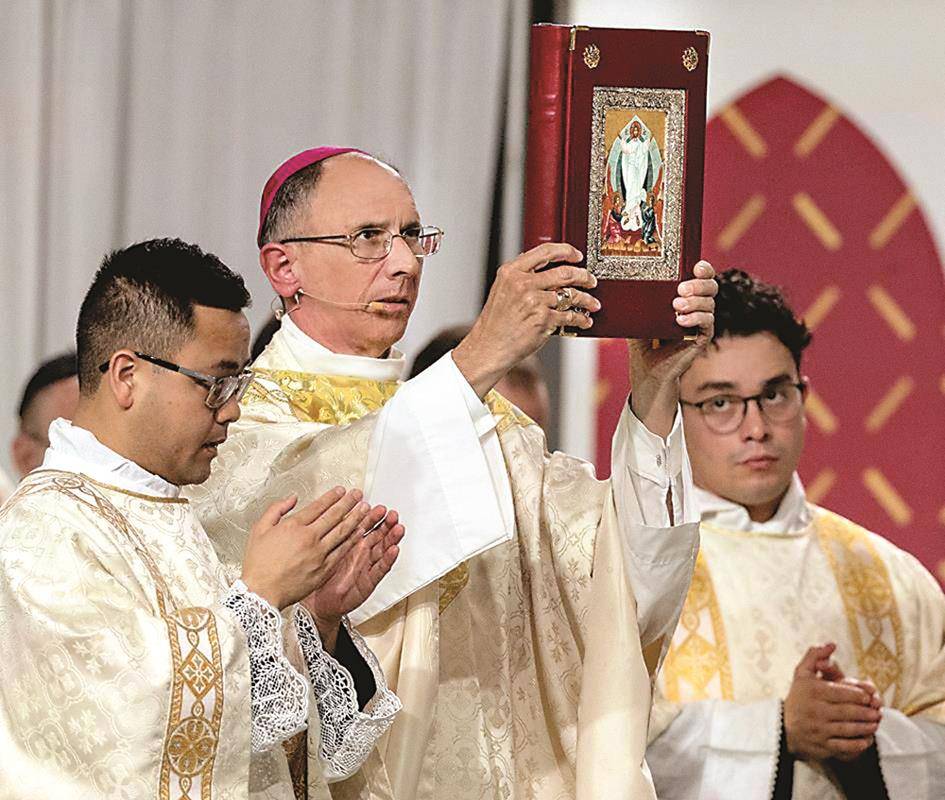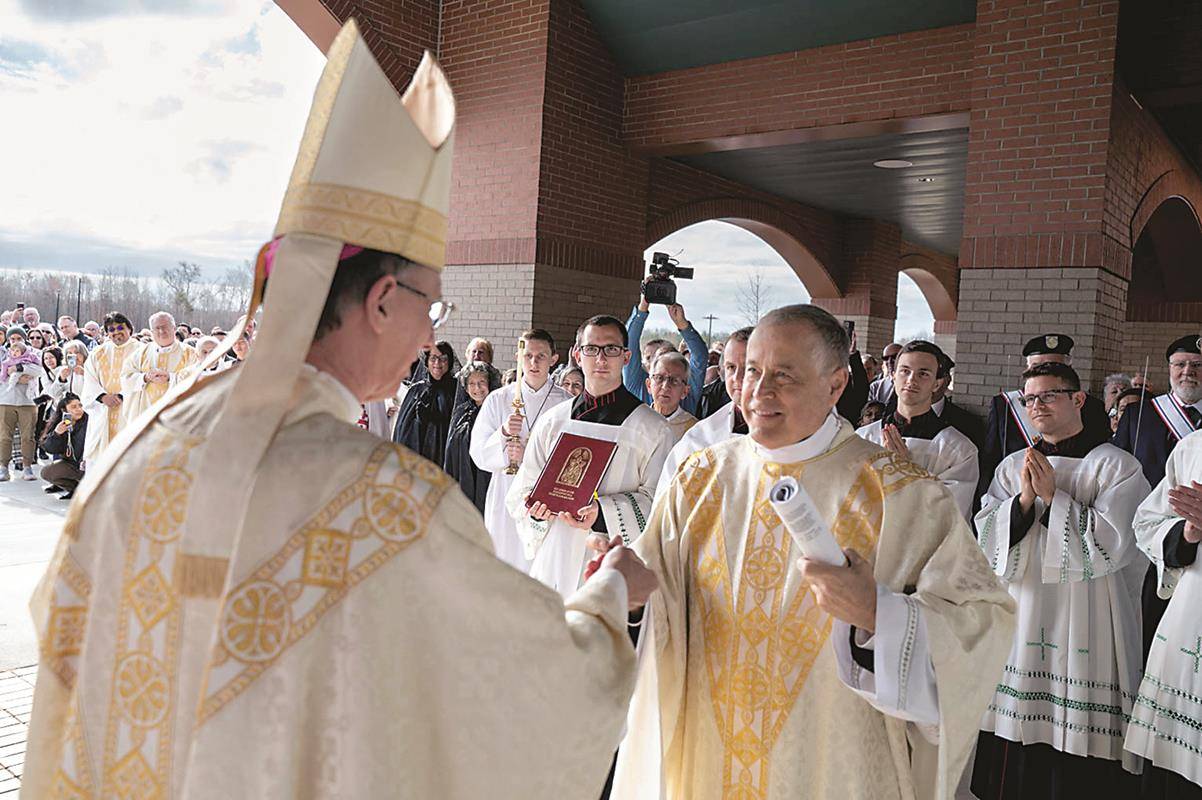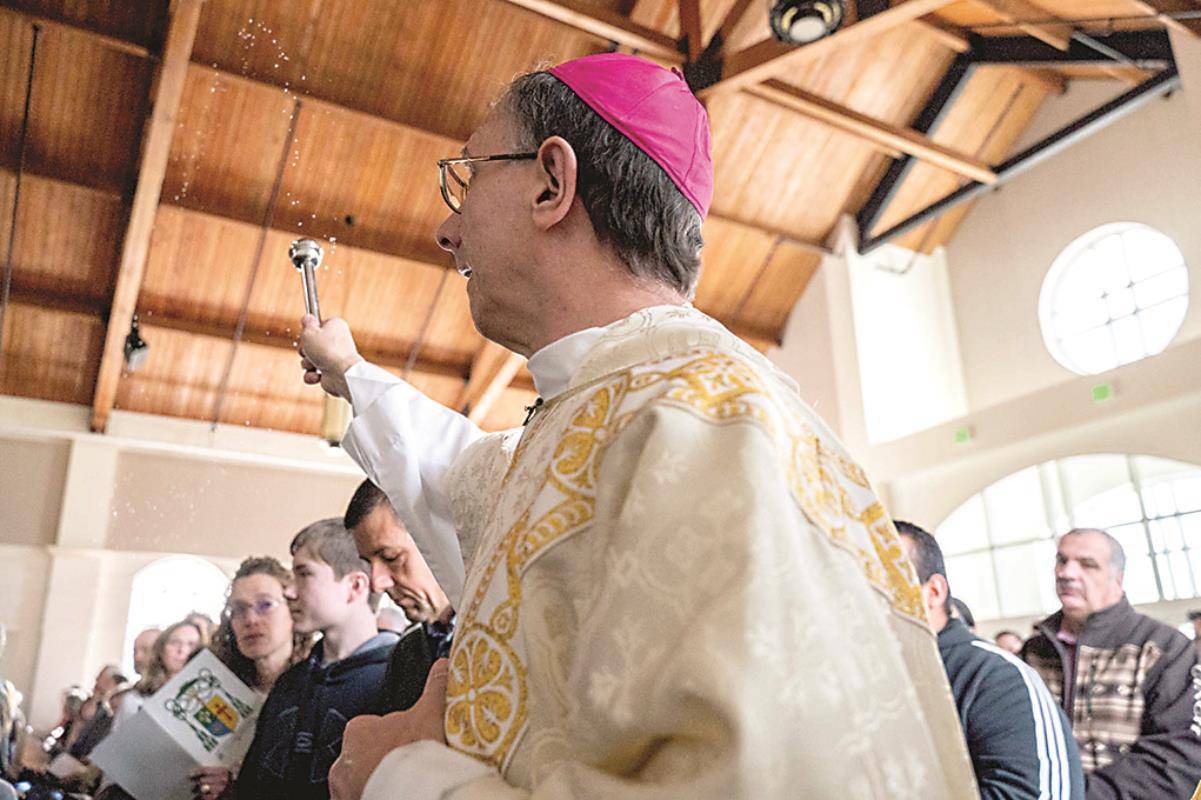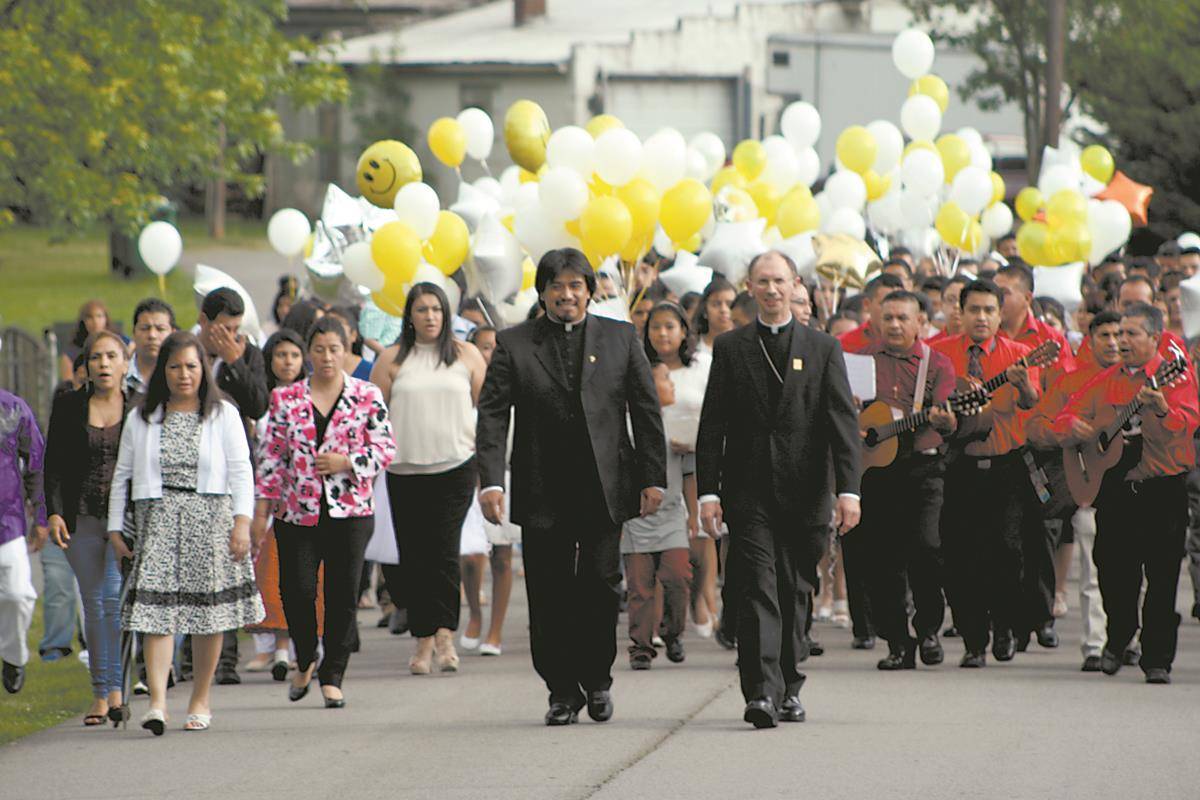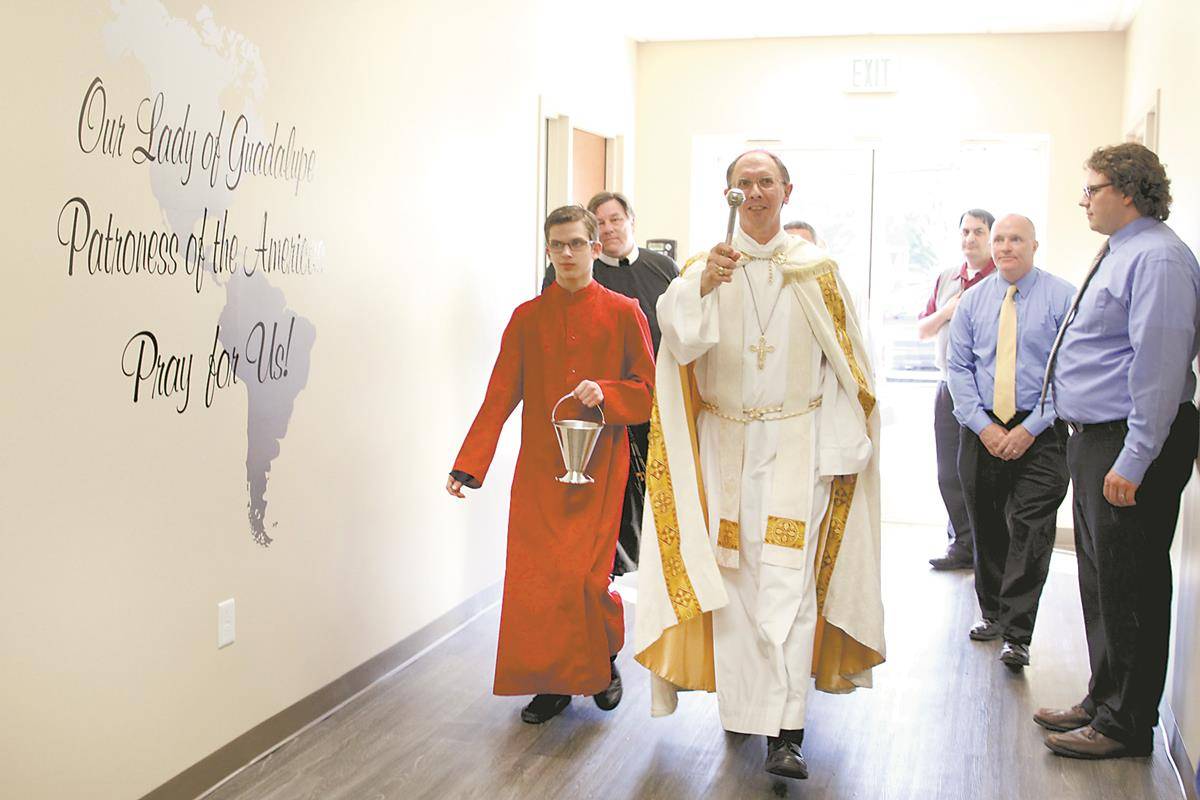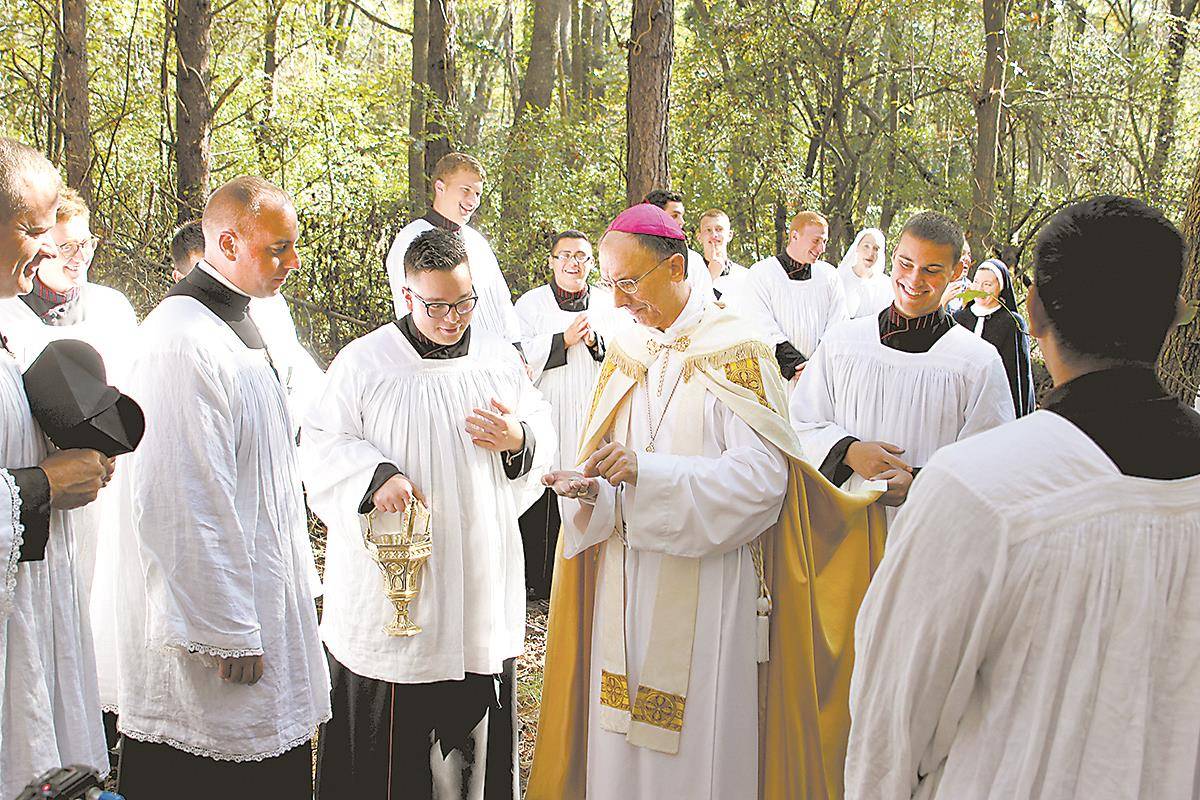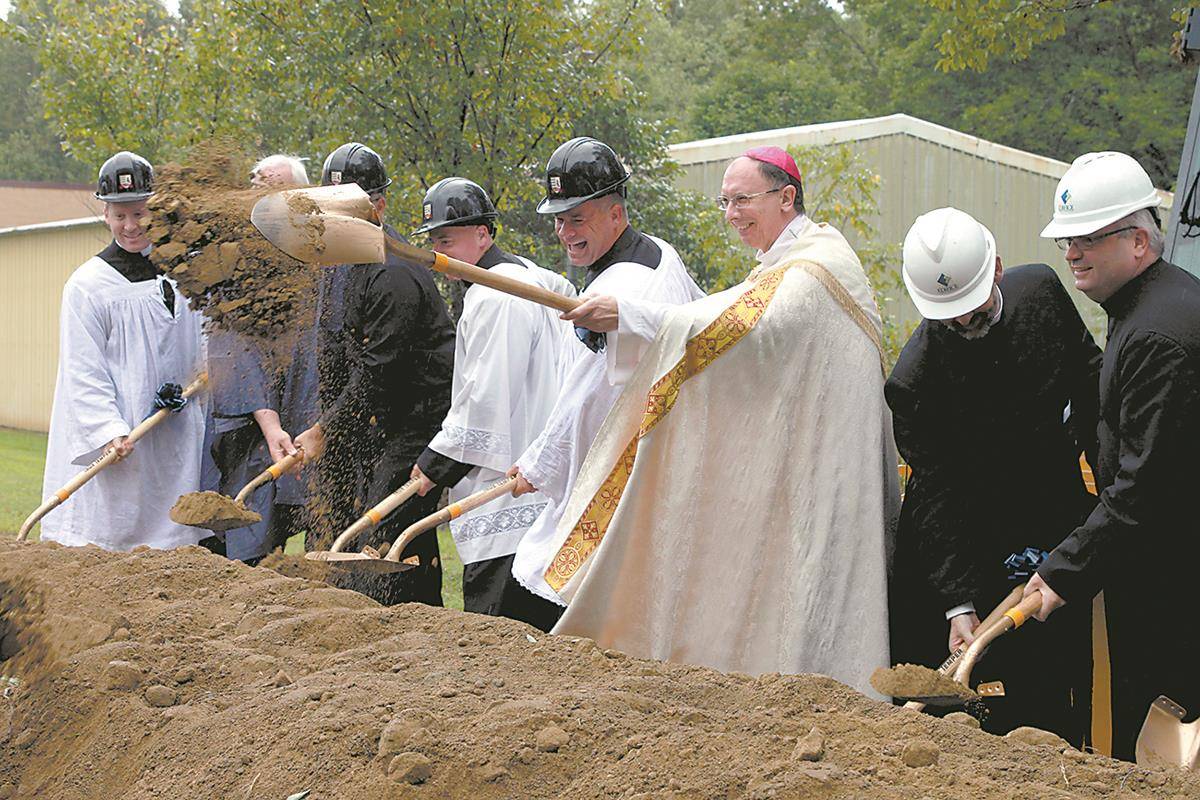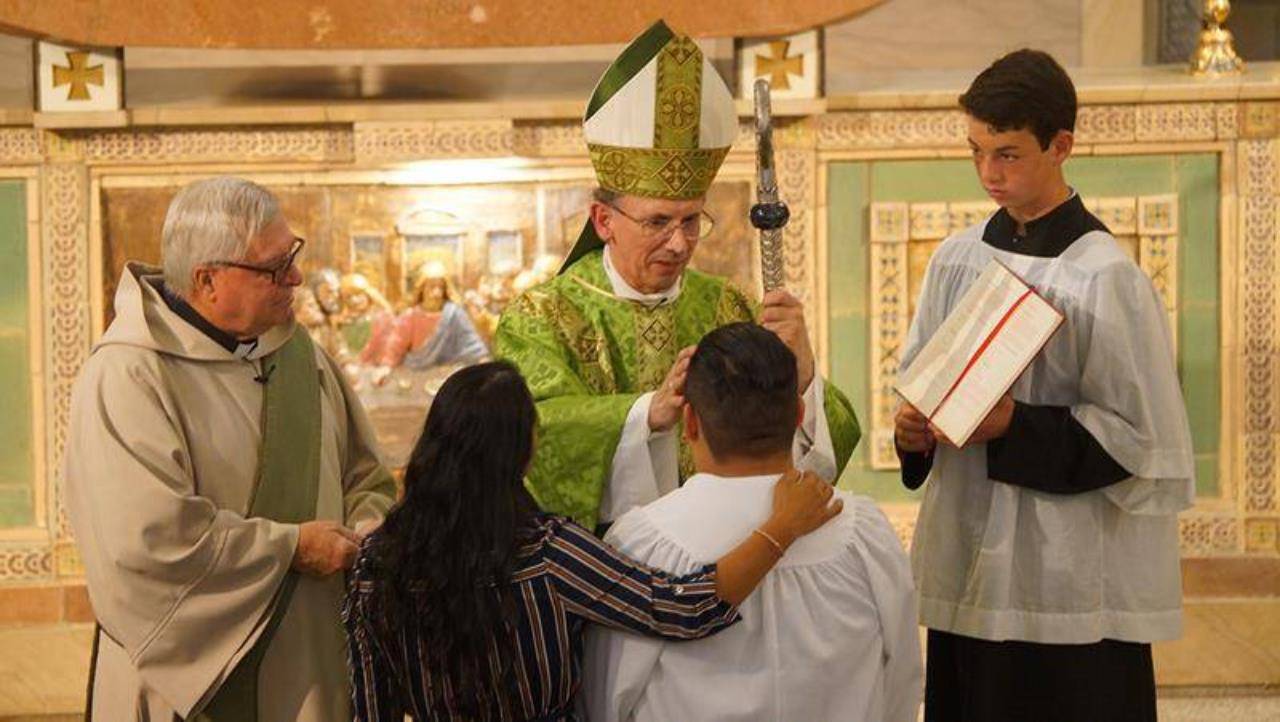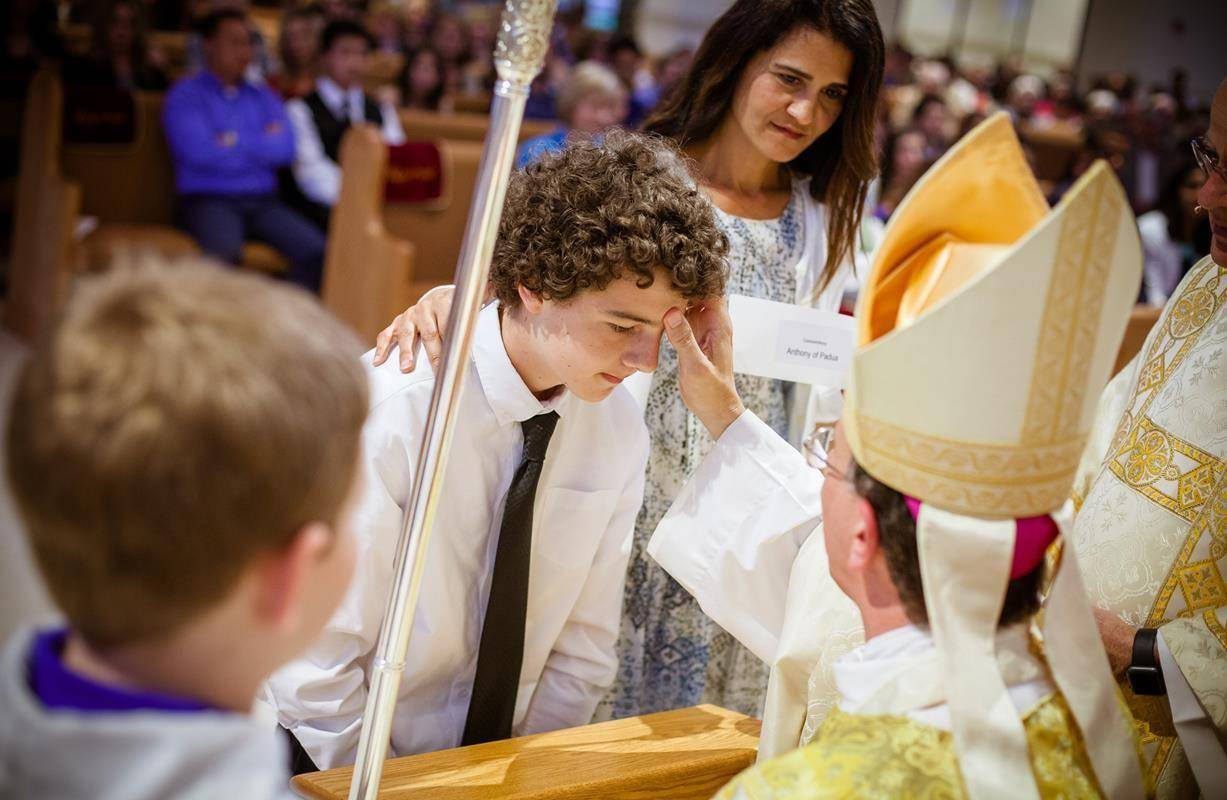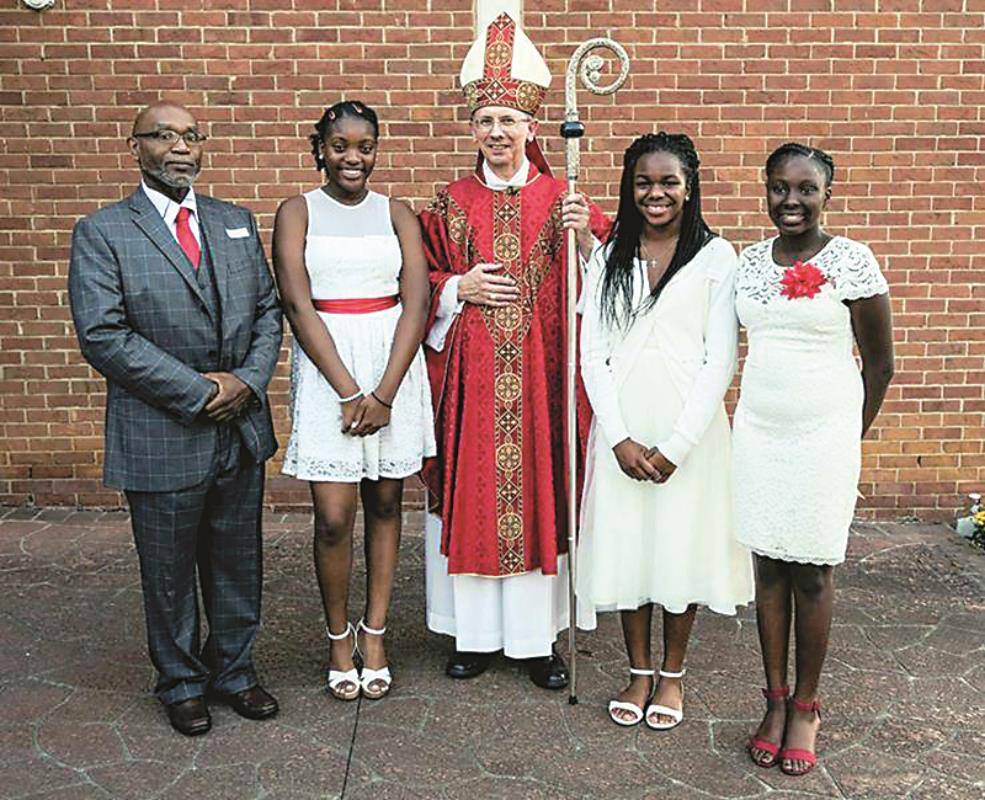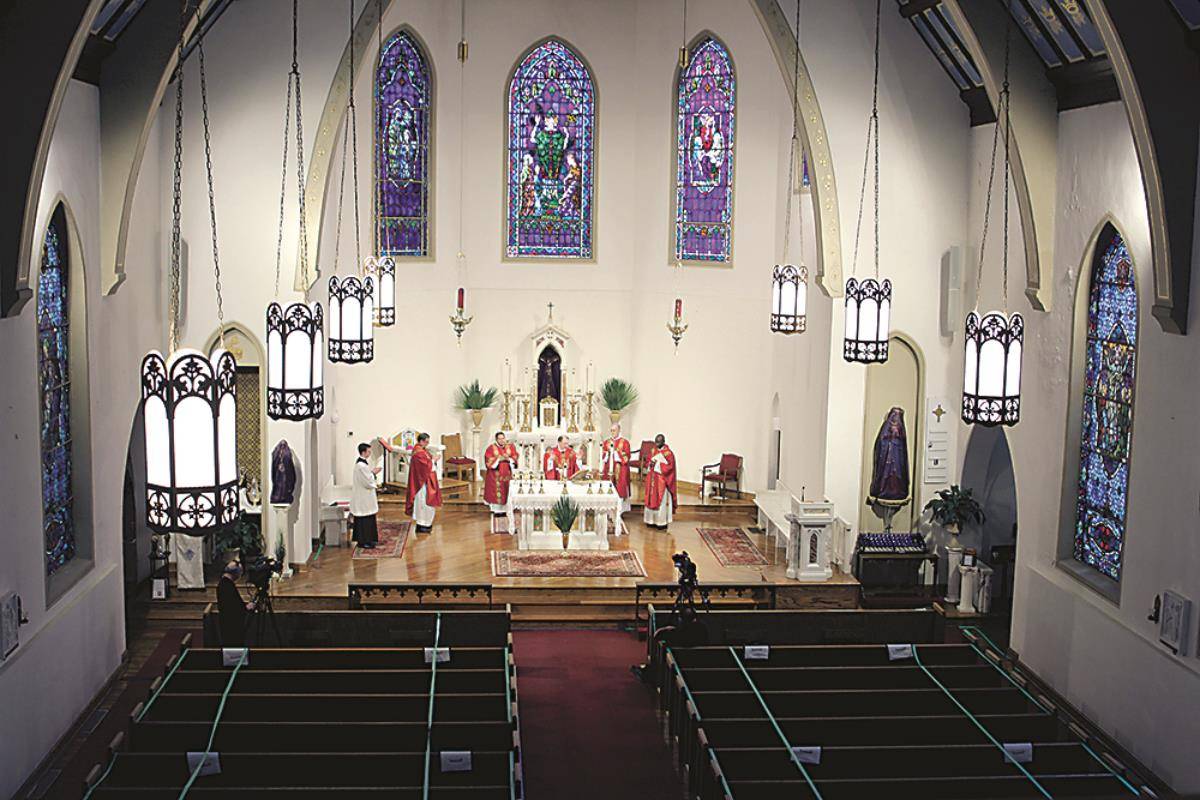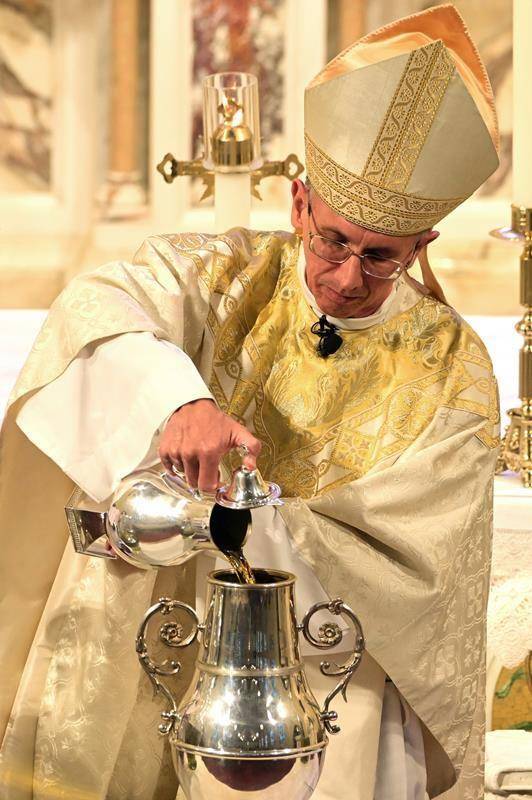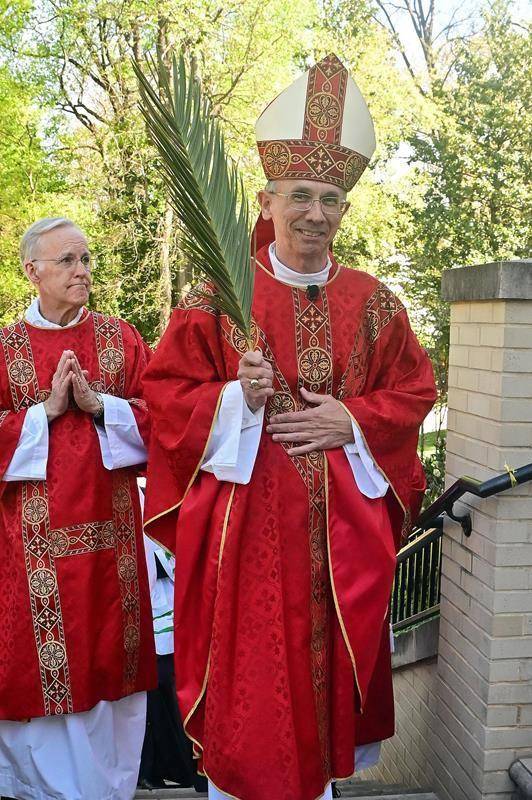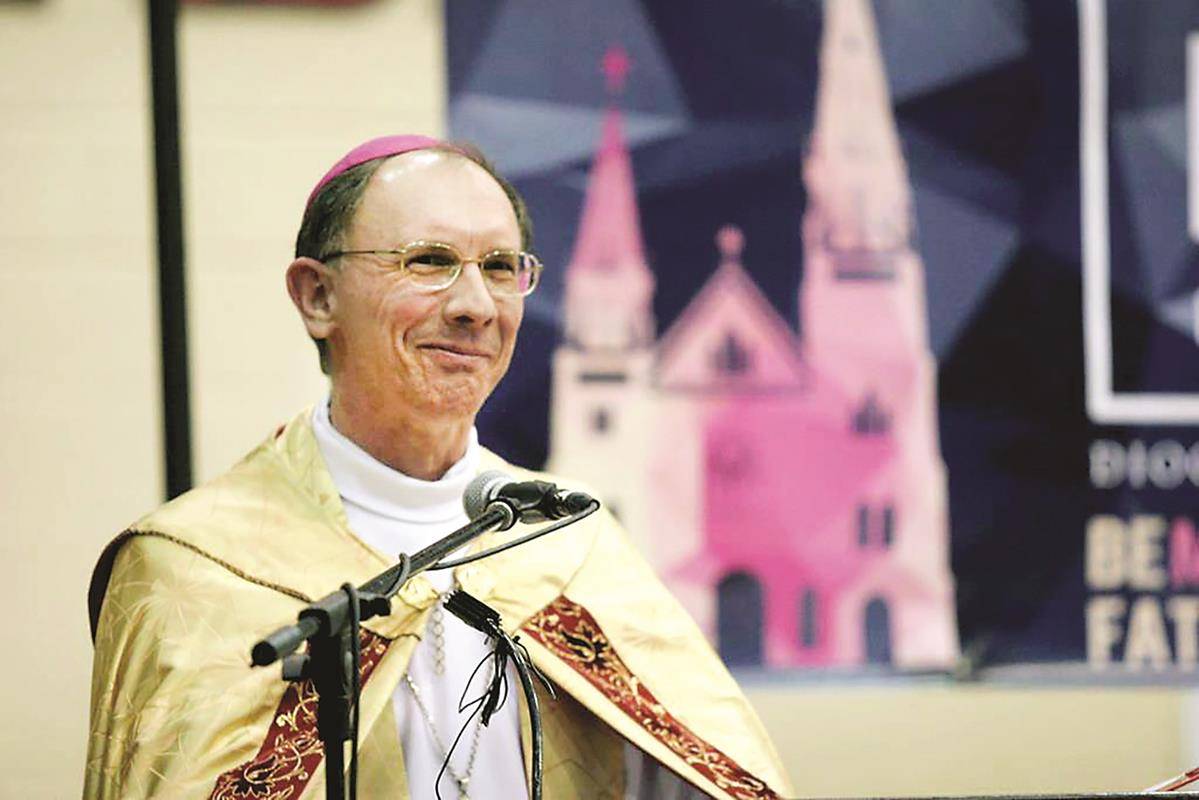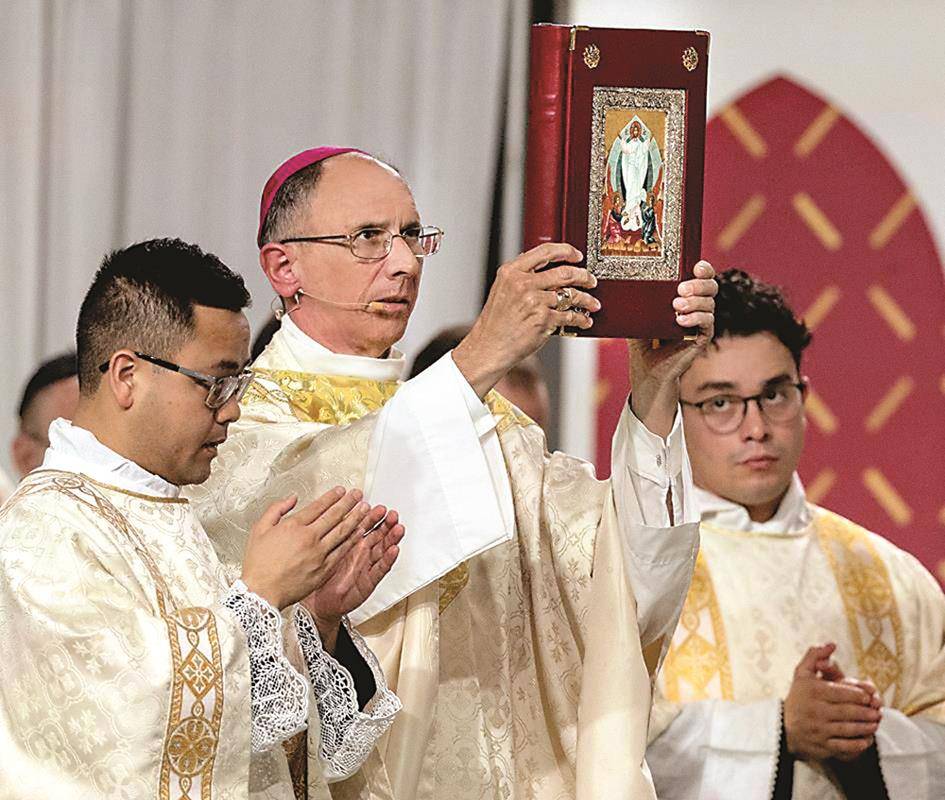‘A steady, calm hand’
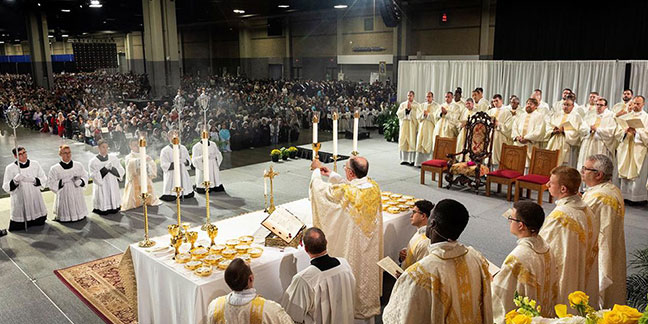 During the leadership of Bishop Peter Jugis, the Diocese of Charlotte has experienced significant growth in parishes, schools and ministries. The diocese now has an estimated 530,000 Catholics from Greensboro, to Charlotte, to Asheville and beyond – nearly half of whom are Hispanic. At the annual Eucharistic Congress, the diversity of the diocese’s population is on full display.CHARLOTTE — Bishop Peter Jugis stepped up to lead the Diocese of Charlotte at a turbulent time.
During the leadership of Bishop Peter Jugis, the Diocese of Charlotte has experienced significant growth in parishes, schools and ministries. The diocese now has an estimated 530,000 Catholics from Greensboro, to Charlotte, to Asheville and beyond – nearly half of whom are Hispanic. At the annual Eucharistic Congress, the diversity of the diocese’s population is on full display.CHARLOTTE — Bishop Peter Jugis stepped up to lead the Diocese of Charlotte at a turbulent time.
It was 2003 – a year after revelations of abuse in the Church had broken nationally, and the local demands of unprecedented growth also weighed on the diocese.
The diocese, which covers 46 counties in the western half of North Carolina, was still considered “mission territory” then, with limited resources and a small Catholic population – but an influx of Hispanic and other Catholics had already begun.
Established in 1972, the diocese had been well-positioned by its three previous bishops, who set up an administrative structure, launched new ministries, and bought up land throughout the territory. But growth in the 1990s intensified the need for new churches, more priests, and a steady hand to guide the diocese – someone who was calm in a storm, who could keep people focused on God and His promise of salvation.
Pope John Paul II chose a local priest, Father Peter Jugis, for the task.
The pope himself had ordained Peter Jugis to the priesthood 20 years earlier in Rome. He was aware of Father Jugis’ service at 10 parishes across the diocese and was confident that, as a Charlotte native, he was the “man for the times and for the place,” as Archbishop John Donoghue said during Bishop Jugis’ episcopal ordination on Oct. 24, 2003.
“Your heart, your soul, your roots are here in the hills and plains of North Carolina,” the archbishop told him. Bishops, he said, “must be strong, for themselves and for the Church they live and die to foster.”
Today, as the diocese marks the 20th anniversary of Bishop Jugis’ leadership, parishioners, priests and others who have worked with and watched him say the pope and archbishop called it right.
“The entire governance we’ve had under Bishop Jugis has been a steady, calm hand,” says Father Matthew Kauth, who has served under the bishop for 20 years. “Everything has been measured, and you can always expect there to be a certain dignity about both the office and his style of leadership. He’s a calming presence.”
GROWTH AND DIVERSITY
Much has changed during Bishop Jugis’ tenure.
The number of Catholics in the diocese has more than doubled to an estimated 530,000 – nearly half of whom are Hispanic. Fifty priests and 65 deacons have been ordained to serve here, thanks to the bishop’s unwavering promotion of vocations. He has also elevated six missions or ministry centers to parishes, consecrated 22 churches and numerous parish halls, and overseen the expansion of the diocese’s school system to 20 schools and record enrollment.
The diocese is no longer considered mission territory.
“What we’re experiencing is growth – from parish to parish, vicariate to vicariate, and region to region,” says Monsignor Patrick Winslow, who has worked closely with the bishop since 2019 as vicar general and chancellor of the diocese. “We have a tremendous influx of different ethnic groups coming from all around the world.
“To be our bishop during this time, over these past 20 years, to shepherd a Church for this extraordinary moment, well, let’s just say it’s an exciting time and we are grateful for all Bishop Jugis has been able to do in leading us through it.”
Growth has been particularly apparent at the last parish where Bishop Jugis served before becoming bishop: Our Lady of Lourdes in Monroe. Then-Father Jugis ministered to 466 registered families. Twenty years later, the parish has soared to more than 1,600 families.
The Monroe church’s current pastor, Father Benjamin Roberts, knows the challenges related to growth and how Bishop Jugis has approached his ministry. He likens him to
St. Ignatius of Antioch, an early second century bishop who consistently preached faith and unity despite the challenges of his day. The saint was described this way, he says:
“ ‘With his kindness and gentleness, he manifests the very gentleness of God.’ I’ve always thought of Bishop Jugis in that way – he manifests the very gentleness of God.”
Borne of his compassion for others, the bishop also demonstrates a resoluteness of purpose, priests say.
In 2004, less than six months after becoming bishop, he publicly apologized to abuse victims during his first Ash Wednesday homily at St. Patrick Cathedral. The diocese had just reported historical allegations against 13 priests, in a national study on the problem. Throughout his ministry, Bishop Jugis has remained focused on protecting children and promoting healing for victims.
“The bishop has met with victims of abuse that happened well before his time, and he engaged independent auditors to review our records to identify – and publish – all credible allegations of clergy abuse, as a way to help victims heal,” said Monsignor Winslow, who oversaw the task. “Like any father, there’s no higher priority for him than keeping children safe. And he has exacted discipline in historical abuse cases that come to light, relied on an independent Review Board for guidance, and added protocols and resources to ensure we’re doing our due diligence with comprehensive background checks and training for all staff and volunteers.”
Bishop Jugis, who speaks English, Italian and Spanish, has also emphasized the importance of ministering to the diocese’s increasingly diverse flock.
Now, two-thirds of the diocese’s churches offer Spanish or bilingual Masses. There are robust Spanish faith formation and marriage prep programs. Every seminarian must learn to speak Spanish. And the diocese’s Hispanic Ministry has a full-time vicar and 10 staff coordinators who serve the diocese’s vicariates.
“Bishop Jugis is a very, very dedicated person to Hispanics and served in several parishes with a large Hispanic presence,” says Deacon Guillermo Anzola of St. Luke Parish in Mint Hill, where the bishop recently dedicated a new church building. “(He) always makes a point of speaking in Spanish for us.”
BRINGING FAMILY TOGETHER
The growth and diversification of the local Church is especially evident at the Eucharistic Congress.
Founded in 2005 by Bishop Jugis, it attracts more than 10,000 people to Charlotte each year to celebrate the Eucharist as the source and the summit of the Catholic faith. It has become a “family reunion” of sorts for Catholics sprawled across the diocese’s 20,470 square miles from Greensboro, to Charlotte, to Asheville and beyond.
Among the largest in the country, the Congress features a Eucharistic procession of thousands praying, singing and proclaiming their Catholic faith through the streets of uptown Charlotte. It also offers fellowship, talks by compelling speakers, shopping for religious art and sacramentals – as well as a Eucharistic Holy Hour and closing Mass that fill the Charlotte Convention Center, led every year for 19 years by Bishop Jugis.
“It’s a great experience to be at the Congress surrounded by our Catholic family of all different backgrounds and nationalities,” says Frances Liberto, a parishioner of St. Mark in Huntersville. “I’m so grateful to Bishop Jugis for starting it, and for his quiet and persistent leadership.”
Bishop Jugis credits the Congress and its underlying focus on the Eucharist for fueling people’s faith, support and participation in the Church.
“The Congress shows us that the Eucharist brings us together and makes us one in Christ,” he has said. “Strong faith in the Eucharist means a strong local Church, and this strong faith in the Eucharistic Presence of Christ is important for our vitality as the holy people of God.”
INCREASING VOCATIONS
Bishop Jugis and his Eucharistic Congress have also inspired young men and women to pursue religious vocations, a number of priests say.
One of the diocese’s newest priests, Father Christopher Brock says, “Being in the seminary and being in this diocese has been really incredible, and I think the Eucharistic Congress sums it up. A lot of it has to do with Bishop Jugis’ devotion to the Eucharist, and we see these vocations coming about because of that. I think Our Lord has blessed this diocese because of events like the Eucharistic Congress and having this good and holy bishop.”
A homegrown priest himself, Bishop Jugis has nurtured local vocations. He’s known for starting early, encouraging young altar servers to follow their hearts, speaking to them personally and handing out rosaries and prayer cards, then remembering their names next time they cross paths. He prays daily for more vocations and has increased funding and staff for the diocese’s vocations program.
One of his signature achievements has been founding St. Joseph College Seminary in Mount Holly. Opened in 2016, it has become a seedbed for vocations as young men have responded to the opportunity to consider a priestly vocation close to their homes and the parishes they might one day serve.
As a result of these efforts, this year the diocese has a record number of 51 seminarians in formation, including 21 at St. Joseph College Seminary – now housed on an impressive campus where seminarians live and learn about life in the priesthood while also pursing their undergraduate degree at nearby Belmont Abbey College.
Clergy ordinations are one way a bishop can steer his diocese over the long term, Monsignor Winslow says.
“Ordinarily, bishops have about 10 years in a diocese and their most enduring impact comes through the men they ordain. In the case of Bishop Jugis, he’s had two decades as bishop to invigorate and inspire a vocations program.”
That impact, he said, “will be felt for the next 40 years and beyond.”
‘Jesus says of Himself that He came not to be served but to serve. He is the model for us to follow. The Lord has given us a diocese full of dedicated priests, deacons, consecrated religious, and lay faithful eager to participate in the Church’s mission of salvation. It is a great joy to serve in the Diocese of Charlotte.’
— Bishop Peter Jugis, on the occasion of his 20th anniversary
‘WE HAVE A MISSION’
The bishop’s steadying influence may only be eclipsed, observers say, by his example and desire to spread the Gospel – a quest he’s expressed from his earliest days, continuously, right through today.
A “sacred responsibility is given to the laity to grow in personal holiness day by day,” he preached in 2003, “and to see to it that you make known the Gospel message of salvation to all people.” Everyone, he said, must work to “transform our modern culture with the spirit of the Gospel.”
In 2006, he referenced his episcopal motto – “The Love of Christ Impels Us” – as he urged people to go out on a mission “to bring His salvation into the whole world.”
“It is the love of Jesus which impels us in this mission. It has to be Christ’s love which will transform this world – Christ’s love working through us. We are transformed. ... Into every home, every store, every school, every university, every neighborhood, every government office, every workplace, we have a mission to bring the Kingdom of God, the kingdom of Christ’s love.”
That message and the bishop’s own example have inspired many.
“Growing up as a teenager in the Charlotte area,” Father Jonathan Torres recalls, “I saw Bishop Jugis at various events of the diocese. While all attention is on him in a sense, he’s never really let that attention be about him. He’s always been a window, as it were. We gaze at the window, but we’re actually seeing what’s through the window – the light that’s coming forth. I believe Our Lord’s grace really shines forth through Bishop Jugis, and it’s that humility that allows him to be transparent for us to see Our Lord.”
Father Torres was ordained by Bishop Jugis in 2020, during a carefully planned ordination Mass held during the pandemic.
‘START OF SOMETHING NEW’
Bishop Jugis recognized this pivotal moment for Catholicism in western North Carolina even at his episcopal ordination in 2003.
“We are a young Church,” he said. “We are a rapidly growing Church, filled with joy and vitality and holiness and the love of Christ. We come from many different ethnic backgrounds and together we form the Body of Christ – a living sacrifice of praise.”
As he marks 20 years as a bishop, Bishop Jugis continues looking forward – constantly encouraging people to get closer to Jesus.
Just last month, in his homily at the closing Mass of the 19th annual Eucharistic Congress, he delivered a stirring message:
“Let this Eucharistic Congress be the start of something new for you. Resolve to deepen your relationship with Jesus in the Eucharist. You are probably very busy, as most people are nowadays. But there is someone waiting for you at Church, in the tabernacle. And I do say Some-One, not some-thing. It is the Lord Jesus who is waiting for you.
“Let this Eucharistic Congress be the start of something new for your spiritual life. Go deeper in your relationship with the Lord in the Eucharist.”
— Patricia L. Guilfoyle
Growth in our diocese
Since 2003:
- The Catholic population has more than doubled to 530,000.
- 22 churches have been dedicated.
- 6 parishes have been elevated from missions or centers.
- Over 120,000 people have been received into the Church.
- The Diocesan Support Appeal – which funds more than 50 ministries, charitable outreach, seminarian education, and evangelization efforts across the diocese – has grown from $3.6 million in 2003 to $6.6 million in 2022.
- 50 priests and 65 permanent deacons have been ordained.
- The number of seminarians has risen from 17 to 51 this year – the most in the diocese’s history.
- Enrollment at St. Joseph College Seminary has risen from 8 men at its opening in 2016 to 21 men.
- The number of Catholic Heritage Society members – people who have created endowments or intend to leave a bequest to the diocese or their parish – has grown from about 500 to over 1,600.
- The Catholic schools system has expanded to 20 schools, and enrollment has hit a record 8,100.
Bishop Jugis’ four episcopal priorities
Catechesis
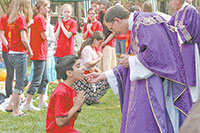 “I want you to know your faith, and to be strong in your faith. I want you to know Jesus, so that you can say to Him right away without hesitation, ‘Yes, Lord,’ when He calls you to be a priest or a sister, or a deacon or a brother, or when He calls you to be a Christian husband or wife, or father or mother. I want you to know Him well, so you can tell Him, “Yes, Lord. Here I am. I love You. I wish to serve You in whatever way You ask.”
“I want you to know your faith, and to be strong in your faith. I want you to know Jesus, so that you can say to Him right away without hesitation, ‘Yes, Lord,’ when He calls you to be a priest or a sister, or a deacon or a brother, or when He calls you to be a Christian husband or wife, or father or mother. I want you to know Him well, so you can tell Him, “Yes, Lord. Here I am. I love You. I wish to serve You in whatever way You ask.”
— Homily from the closing Mass of the diocese’s first Eucharistic Congress, 2005
Evangelization
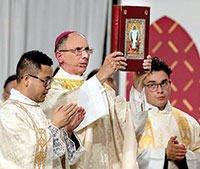 “In my visits to parishes to celebrate the sacrament of confirmation, I have reminded the confirmation students that as confirmed Catholics they are now Christ’s ambassadors – that they are to represent Christ to others. That is why Jesus gave the Holy Spirit to the Apostles at Pentecost – so that they would be His witnesses, His ambassadors in the world, and that is why He gives the Holy Spirit at confirmation. ‘But,’ I remind them, ‘you cannot be effective as Christ’s ambassadors unless you really know Him well and become His friend. You can’t represent someone unless you know that person.’ The knowledge we are talking about here is more than intellectual knowledge. It is, as Pope Benedict says, a knowledge of the heart...”
“In my visits to parishes to celebrate the sacrament of confirmation, I have reminded the confirmation students that as confirmed Catholics they are now Christ’s ambassadors – that they are to represent Christ to others. That is why Jesus gave the Holy Spirit to the Apostles at Pentecost – so that they would be His witnesses, His ambassadors in the world, and that is why He gives the Holy Spirit at confirmation. ‘But,’ I remind them, ‘you cannot be effective as Christ’s ambassadors unless you really know Him well and become His friend. You can’t represent someone unless you know that person.’ The knowledge we are talking about here is more than intellectual knowledge. It is, as Pope Benedict says, a knowledge of the heart...”
— Homily from the closing Mass of the 2007 Eucharistic Congress
Vocations
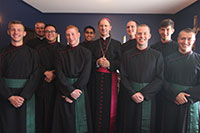 “In the Gospel He tells us: The Good Shepherd lays down His life for His sheep. This is what He expects of you. You will lay down your life in service to Christ as you visit the sick for the sacrament of anointing, as you absolve from sins in the sacrament of penance, as you offer the Holy Sacrifice of the Mass for the nourishment of Christ’s sheep, as you teach the Gospel, as you celebrate the sacraments. It is all about Jesus, and the salvation of your brothers and sisters. It is Christ whom we proclaim.”
“In the Gospel He tells us: The Good Shepherd lays down His life for His sheep. This is what He expects of you. You will lay down your life in service to Christ as you visit the sick for the sacrament of anointing, as you absolve from sins in the sacrament of penance, as you offer the Holy Sacrifice of the Mass for the nourishment of Christ’s sheep, as you teach the Gospel, as you celebrate the sacraments. It is all about Jesus, and the salvation of your brothers and sisters. It is Christ whom we proclaim.”
— Homily from the 2010 ordination Mass
The Eucharist
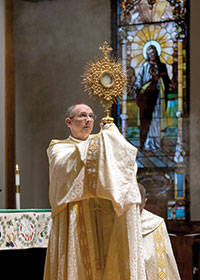 “There are many, many ways that Jesus is with you always. He is with us in the sacraments. ... He is with you in your prayer. He is present where two or three are gathered in His name. He is with us in His Word. He is with us in the person of His sacred minister: the bishop, the priest, or the deacon. He is present in the poor, the sick and the imprisoned.
“There are many, many ways that Jesus is with you always. He is with us in the sacraments. ... He is with you in your prayer. He is present where two or three are gathered in His name. He is with us in His Word. He is with us in the person of His sacred minister: the bishop, the priest, or the deacon. He is present in the poor, the sick and the imprisoned.
“But, of all these ways that Jesus is with us always, He is especially with us in a totally unique way in the Holy Eucharist. In the Eucharist, He is present in the fullest sense of the word ‘present,’ meaning it is a substantial Presence of Jesus Christ unlike the other presences of Christ. The whole Christ is truly present, His Body and His Blood, together with His soul and divinity. ...
“Let this Eucharistic Congress be the start of something new for you. Resolve to deepen your relationship with Jesus in the Eucharist. You are probably very busy, as most people are nowadays. But there is someone waiting for you at Church, in the tabernacle. And I do say Some-One, not some-thing. It is the Lord Jesus who is waiting for you.”
— Homily from the closing Mass of the 19th annual Eucharistic Congress 2023
Leadership accomplishments
Since his ordination as the fourth Bishop of Charlotte, Bishop Peter Jugis has:
- Guided the diocese through unprecedented growth in the Catholic population, which has more than doubled from 2003 to an estimated 530,000 Catholics in 2023.
- Established the annual Eucharistic Congress in 2005, which now draws more than 10,000 people to Charlotte each fall to celebrate our Catholic faith.
- Founded St. Joseph College Seminary in 2016 to form priests for the diocese from among the parishes they will one day serve. In 2020, he opened a permanent home for the seminary program in Mount Holly, with capacity for 40 seminarians and room to grow.
- Led the diocese through the aftermath of abuse revelations, installing robust safety protocols that embraced the 2002 Charter for the Protection of Children and Young People, and launching the Diocese of Charlotte’s Accountability website and abuse reporting hotline.
- Fostered diversity and inclusion of Catholics from all backgrounds and cultures, especially Spanish-speaking Catholics, as well as welcomed and supported communities of other Catholic rites in the universal Church. In 2009, he issued a comprehensive Pastoral Plan for Hispanic Ministry that has made the Diocese of Charlotte a model for the country.
- Enhanced diocesan ministries, services and administration through successful fundraising including the unprecedented “Forward in Faith, Hope, and Love” campaign that received $54 million from parishioners and donors.
- Oversaw the growth of the Diocese of Charlotte Foundation to 349 endowments in 2023, with more than 1,600 Catholic Heritage Society members.
- Oversaw the rebranding of Catholic Social Services to Catholic Charities Diocese of Charlotte in 2013 and expansion of Catholic Charities’ outreach throughout the diocese, most recently with the opening of a location in North Wilkesboro.
- Led the diocese through the COVID-19 pandemic in 2020-2022, harnessing technology to minister to people at home, while also carrying on safe in-person worship, education and charitable work.
- Led the diocesan-wide celebration of the 50th anniversary of the Diocese of Charlotte in 2022 with the theme “Faith More Precious Than Gold.”
- Oversaw the Diocese of Charlotte’s participation in the worldwide Synod on Synodality – which encompassed more than 400 listening sessions with over 7,000 Catholics – and issued six pastoral priorities that summarized key needs identified by the faithful.
- Championed the strengthening of families and protection of all human life, participating regularly in annual Marches for Life in Charlotte and in Washington, D.C., preaching on the value of life and the sanctity of marriage, advocating for the protection of traditional marriage in civil law, and in 2021, establishing the Diocese of Charlotte’s Family Life Office to grow the diocese’s pastoral outreach to families.
- Supported ecumenism, especially with the reaffirmation in 2007 and 2019 of the Lutheran-Catholic Covenant Renewal
- Fostered Catholic education, opening and expanding Catholic schools and appointing a second vicar of education whose role is to focus on Catholic education.
- Since the start of his episcopacy in 2003, has issued calls to holy orders for the ordinations of 50 new priests and 65 permanent deacons for service in the Diocese of Charlotte.
- From 2004 to 2022, canonically established six new parishes in the Diocese of Charlotte, elevating former mission churches and centers to parish status.
Six pastoral priorities for the diocese
Catholics and communities across the Diocese of Charlotte are noticing a shift or renewed emphasis on certain priorities of the Church, as Bishop Peter Jugis rolled out an ambitious agenda following the diocese’s participation in a worldwide Synod of Bishops that Pope Francis convened to listen and consult with the People of God about envisioning the future of the Church.
More than 7,000 Catholics took part in over 400 listening sessions in the diocesan synod from October 2021 to June 2022 on the Synod’s theme of “For a Synodal Church: Communion, Participation, and Mission.”
In a letter to the faithful read during Masses on April 16, 2023, Bishop Jugis touched on “busy lives bombarded by distracting and worldly messages” and called for increased unity, outreach and focus on the Holy Eucharist – especially important in an ever-growing diocese that now has more than 530,000 Catholics. He announced six pastoral priorities after reflecting on testimonies and needs highlighted during the diocesan synod discussions:
- Renew and anchor our lives in the Holy Eucharist
- Draw from our communion with Christ to strengthen the Communion of the Church and the family
- Inspire youth to find their home in the Church
- Inspire lives of personal holiness highlighting
the beauty of chaste love - More effectively evangelize in the digital age
- Prepare for future growth
Diocese marks Bishop Peter Jugis’ 20th anniversary:
- Bishop Jugis calls faithful to unity in the Real Presence
- A Story of Growth: A timeline
- Hispanic community enriches diocese’s growth, faith
- Bishop Jugis’ pilgrimages to the Vatican
- Fourth Bishop of Charlotte: A native Charlottean, ordained by John Paul II
- Looking back: Ordination Day 2003



